SCOLTalk






the 2025 SCOLT Teacher of the Year Finalist
the 2025 SCOLT Award Recipients







the 2025 SCOLT Teacher of the Year Finalist
the 2025 SCOLT Award Recipients
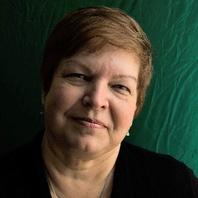
Message from SCOLT President April 2025
Happy Spring! I hope that this message finds you well and enjoying the beautiful weather or at least avoiding the worst of the pollen. Thanks for your participation in a wonderful SCOLT conference celebrating our 60year anniversary See the SCOLT @ 60 history document posted on the website
Congratulations to our amazing award winners:
Educator of Excellence Award: Dr. Christine Rinne from Alabama. Dr. Rinne was nominated by the Alabama World Language Association for her work implementing the Global Engagement Certificate for all the undergrad students at the University of South Alabama.
SCOLT Leadership Award: Chelsea Lawrence from Alabama Chelsea is a leader in her school, her district, and her state organization and a very popular presenter at SCOLT! She’s a firm believer in growth as a leader. We look forward to her future leadership roles!
Founder’s Award: Linda Markley from Florida Linda is a past President of SCOLT and has attended and been a presenter and board member for many years. Since she retired, she has started a blog, a weekly newsletter, a podcast, and she’s written a book, Learning Lessons, in which she shares how her experiences on the Camino de Santiago impacted her life and the takeaways from which we can all profit.
SCOLT Teacher of the Year: Stephanie Bellot-Donaldson from Louisville, KY, a 3rd grade Spanish immersion teacher with a passion for literacy. We are proud that she’ll be representing SCOLT in November at the ACTFL Convention!
We had a record number of scholarship recipients including high school, undergraduate, and graduate students, as well as teachers, and professors. There will be a lot of SCOLT representation traveling abroad soon!
It’ll soon be time to look ahead to a well-deserved “break” during the summer. We change the day to day of what we do, but not the thought, consideration, training, inspiration, and passion that go into the work we do for our profession and our students. Set aside the dates for SCOLT next year, March 19-21, 2026 to “Take Flight with Languages” with us in Raleigh, North Carolina – a joint effort of SCOLT, SEALLT, FLANC, and SCFLTA The proposal window is open now https://scoltconf wufoo com/forms/zva63eu10nxx35/ Submit your idea for a session for next year!

Pam Benton, 25/26 SCOLT President


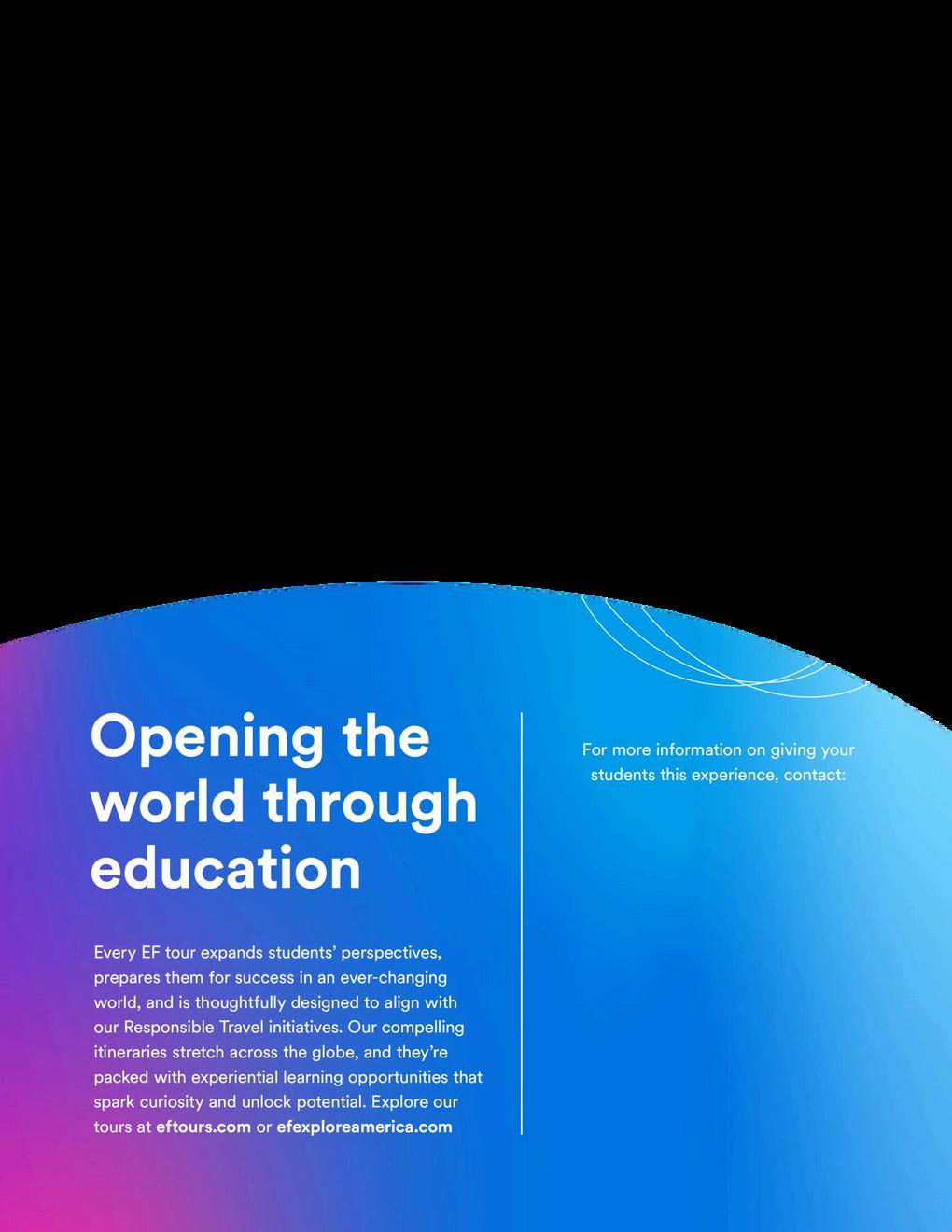
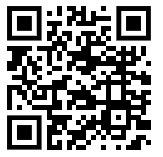
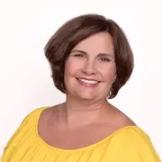
Dr Krista Chambliss
Immediate Past-President

President
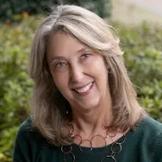
Jennifer Carson Awards & Scholarships Co-Director
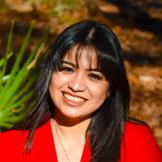
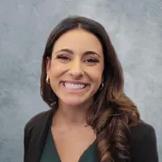
President-Elect
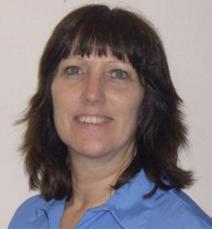
Linda Markley Awards & Scholarships Co-Director

Soth ACTFL Representative
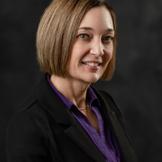
Dr. Kelly Moser Awards & Scholarships Co-Director

Bertha Delgadillo Program Co-Director
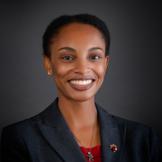
Kimberly Renee Watson SCOLTalk Co-Editor/ Co-Registrar
Tanika Perry-Vincent Program Co-Director
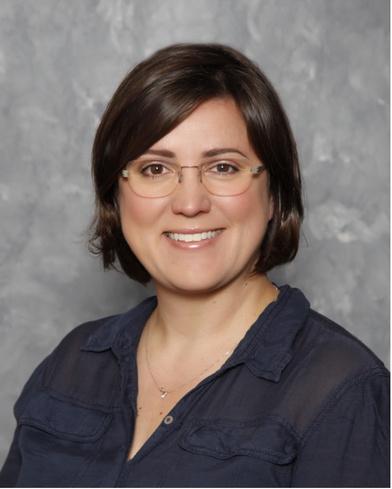
Dr. Shannon Borum SCOLTalk Co-Editor/ Co-Registrar
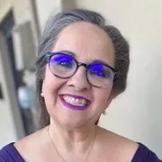
Linda Santiago Program Co-Drector
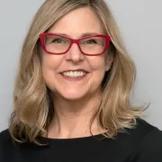
Dr. Paula Garrett-Rucks Dimensions Editor
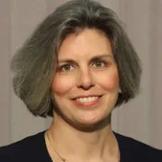
Executive Director
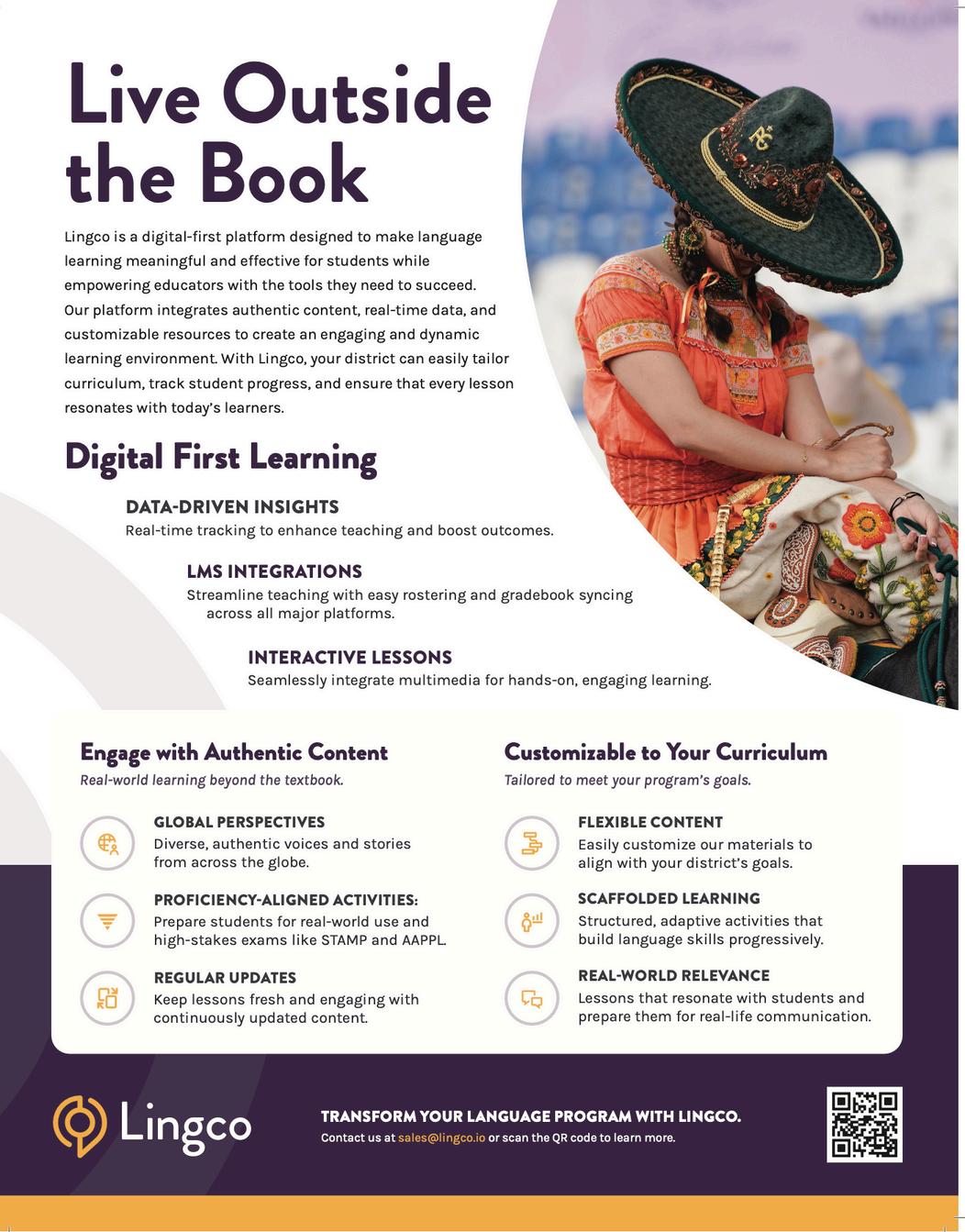
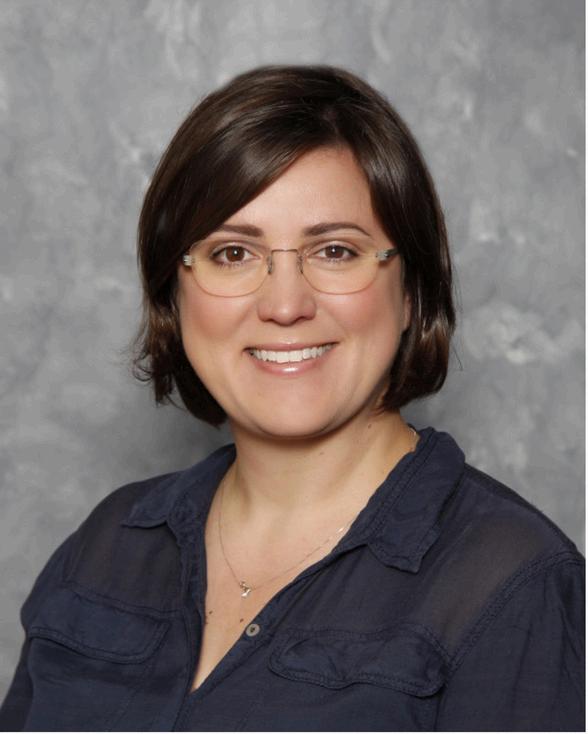
Dr. Shannon Borum is a passionate French teacher and advocate based in rural Jackson, Georgia. With over a fifteen years of experience in the classroom and in leadership roles, she is deeply committed to expanding access to high-quality language education for students in small towns and rural communities.
Dr. Borum is the founder and president of STaRLT (Small Town and Rural Language Teachers), a nonprofit organization that supports rural world language educators through community building, professional development, and advocacy. Under her leadership, STaRLT has partnered with various entities to increase rural teacher visibility and access to state, regional, and national conferences and leadership opportunities.
Her work centers on empowering world language teachers, strengthening rural world language education, and fostering linguistic and intercultural competence for rural students.
Shannon will serve as the SCOLTalk Co-Editor/Co-Registrar.
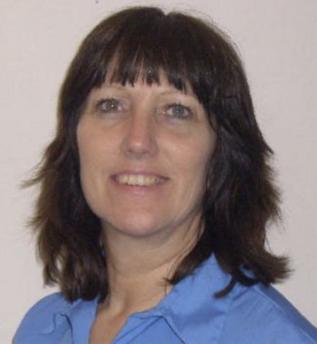
Linda Markley has, at different points in her +40 year career, taught Spanish, French, Math, art and tech skills to all age groups from the 3-year-olds to 83 year-olds. She has also been a WL District Supervisor for Brevard County, FL.
Linda earned her undergraduate degree in Spanish, French, Math and teacher education at Jacksonville University and her Máster universitario de lengua y cultura españolas at the Universidad de Salamanca.
Linda’s passion and dedication to world languages education has motivated her to serve on numerous local, state and regional organizations. She has held every position on the Board of FFLA (Florida Foreign Language Association) as well as worked at the state level for textbook adoption approval, teacher certification, testing and standards development. Even closer to her heart, Linda served five years on the SCOLT Board as the President as well as the Scholarship Committee Chair.
Perhaps Linda’s greatest passion is teacher advocacy and mentoring, thus earning her the honor of being the very first recipient of the JNCL-NCLIS J. David Edwards Power of Advocacy Award. Linda was also honored as the recipient of this year’s Founder’s Award at the SCOLT conference in Nashville.
Finally, Linda is the founder of The Spirit of Teaching and the author of two books, Learning Lessons and Get Realia and is still actively involved mentoring teachers, delivering inspirational keynotes and providing professional development, guidance, resources and support that lift up and celebrate the educational profession and vision.
Linda will serve for one year on the SCOLT Board as part of the TOY and Scholarship Committee.

Educational Technology Specialist, Tanika Perry-Vincent, works for Atlanta Public Schools and is a graduate of Spelman College (BA-Spanish), Georgia State University (MEd-Leadership), Lincoln Memorial University (EdS-Curriculum and Instruction) and postgraduate work at the University of Salamanca, Spain.
She is a 29-year high school Spanish-teaching veteran and previously worked for the DeKalb County School District, Purdue University and Spelman College. Tanika is an Apple Learning Coach, a Google Trainer, Microsoft Innovative Education Expert and Microsoft Certified Coach, with a desire to share her passion to integrate technology to enhance classroom instruction, thereby improving student achievement with a special focus on World Languages, ELL, DLI, Speech and Special Education classrooms. She also serves as an educational technology consultant/Language Acquisition Authority for several private schools in the metro Atlanta area.
Additionally, she is a member of the Leadership DeKalb Organization, Class of 2023, a dancer, actor, musical theatre artist, and a member of the Stone Mountain-Lithonia Chapter of Delta Sigma Theta Sorority, Incorporated, where she serves as the chair of the Grow With Google Black Women Lead Initiative, sponsored by Google and immediate past chair of the Arts and Letter committee.
"It is inspiring to empower people to be as creative as the imagination allows! Throughout my career, my excitement for innovative instruction has always led me to explore the unconventional possibilities of my own classroom, pushing myself, while encouraging my teachers and my students to think beyond the "obvious" and to have fun while we do it! We are all stars in this vast instructional space, flickering in this educational abyss, at varied intensities, at different times of the day. May we empower each other to radiate to our brightest shine, spreading our light and love for teaching and learning throughout classrooms world-wide!"
Tanika will serve as a Program Co-Director.
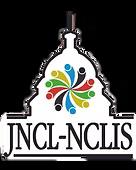
The Joint National Committee for Languages-National Council for Languages and International Studies (JNCL-NCLIS) held its first in-person Language Advocacy Days since the Covid-19 pandemic March 3-4, 2025, in Washington, D.C. Past-president Krista Chambless represented SCOLT as well as her home state of Alabama. There were 47 states represented with every state in the SCOLT region having at least 1 delegate! Overall there were 170 delegates and 200 congressional meetings attended.
This year’s keynote speaker was international journalist Jacob Kushner. He shared experiences in which he needed his language skills to navigate various situations and emphasized the importance of language learning. Additionally, Dr. Gesche Joost of the Goethe-Institut was a featured speaker who presented on the role of language in digital transformation and leadership. The afternoon consisted of breakout sessions including Language as the key to Workforce Development and Creative Innovations in Higher Education. All meetings were held in-person. Each attendee had the opportunity to meet with both senator’s offices from their state as well as their congressional representative’s office.
The legislative priorities this year were:
World Leap Act (H. R. 1572) Introduced by Rep Panetta and Rep Jen Kiggans (R-VA)
BEST ACT (H. R 1660) Introduced by Schatz, Brownley
Reintroduction of the Paul Simon Study Abroad Act
New: Support Reintroduction of the Language Education Data Enhancement Act This ACT would require the collection, reporting, analysis and dissemination of statistical data related to K-12 and higher education on the availability of and access to foreign language coursework.
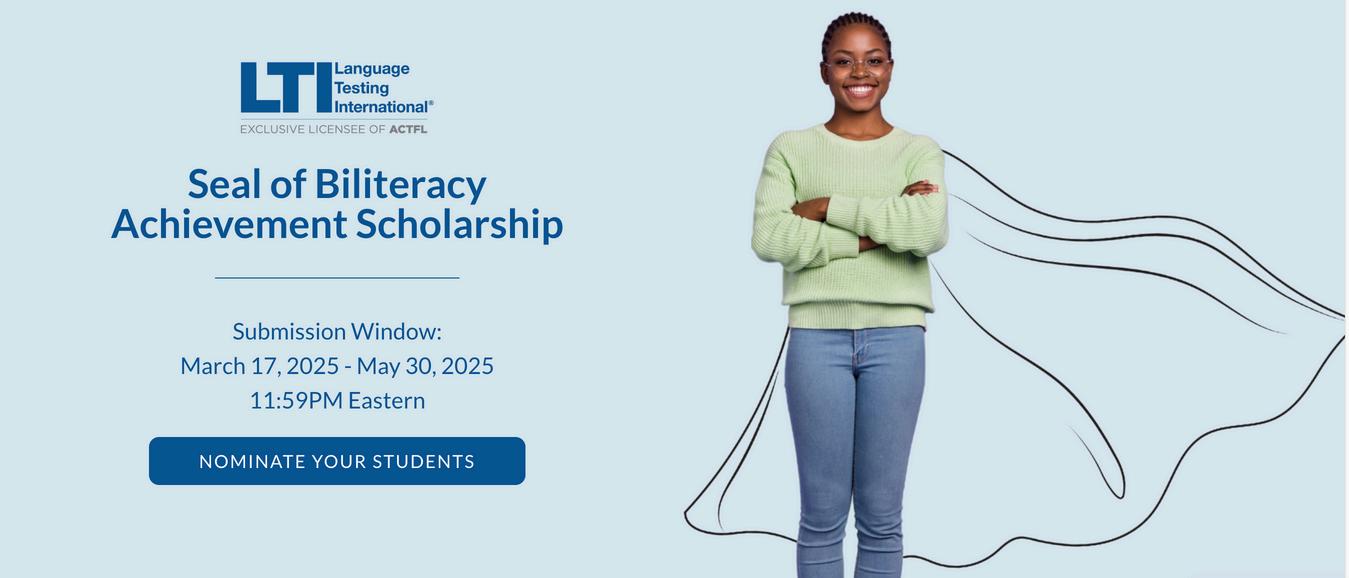
You can now nominate your students for the 2025 LTI Seal of Biliteracy Achievement Scholarship Award. For the third year, LTI is offering this exciting opportunity for students to showcase their multilingualism and share what earning the Seal means to them.
Language is more than just a means of communication it’s a powerful asset that unlocks opportunities, fosters connections, and broadens perspectives. We encourage students to reflect on this theme by sharing how they plan to leverage their Seal of Biliteracy whether in education, career pathways, or community engagement.
Last year, we were inspired by over 100 incredible submissions from students across the country, highlighting their dedication to multilingualism. You can read about last year ’ s award recipients HERE. 10
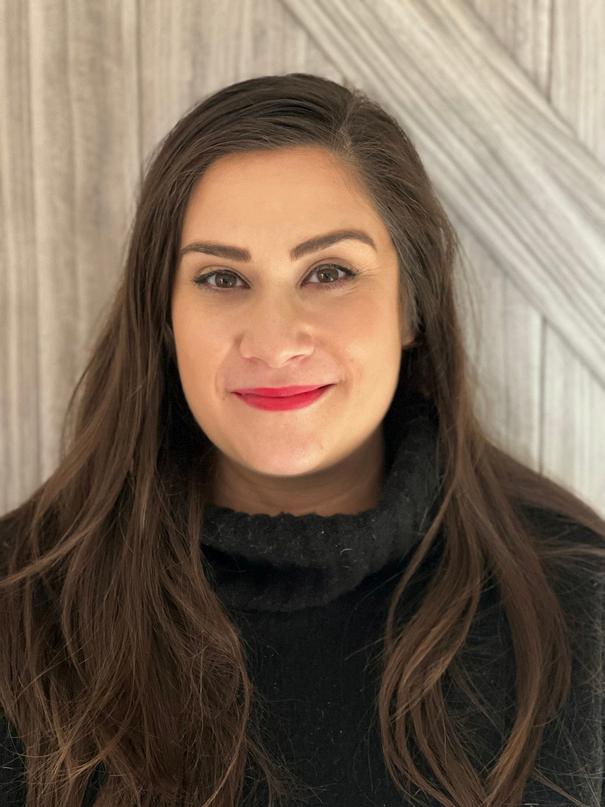
SCOLTalk: “Tell us a little bit about your background as a world language (WL) teacher.”
I have been teaching language learners for 11 years I began my career teaching first grade on the southwest side of Chicago, primarily working with newcomers learning to read in English. In 2017 I returned to Kentucky, where I taught third grade for three years across all subject areas, supporting Spanish-speaking students and implementing PSP plans for Tier 1 instruction. In 2020 I transitioned to a new role and over the last five years, I have been teaching Spanish literacy to all third-grade students at Hawthorne Elementary, a dual language school in Louisville, KY.
I hold a BA in Corporate Communication and Political Science from the University of Kentucky, as well as a MAT with a bilingual education endorsement from Dominican University in River Forest, IL I became a National Board Certified Teacher in Early and Middle Childhood Literacy in 2019, completed my P–12 Building Level Administrator Licensure Program from IUS in 2022, and became a LETRS Dyslexia Certified Teacher in 2024. I am deeply passionate about advocating for language learners and using policy and legal frameworks to support equitable education
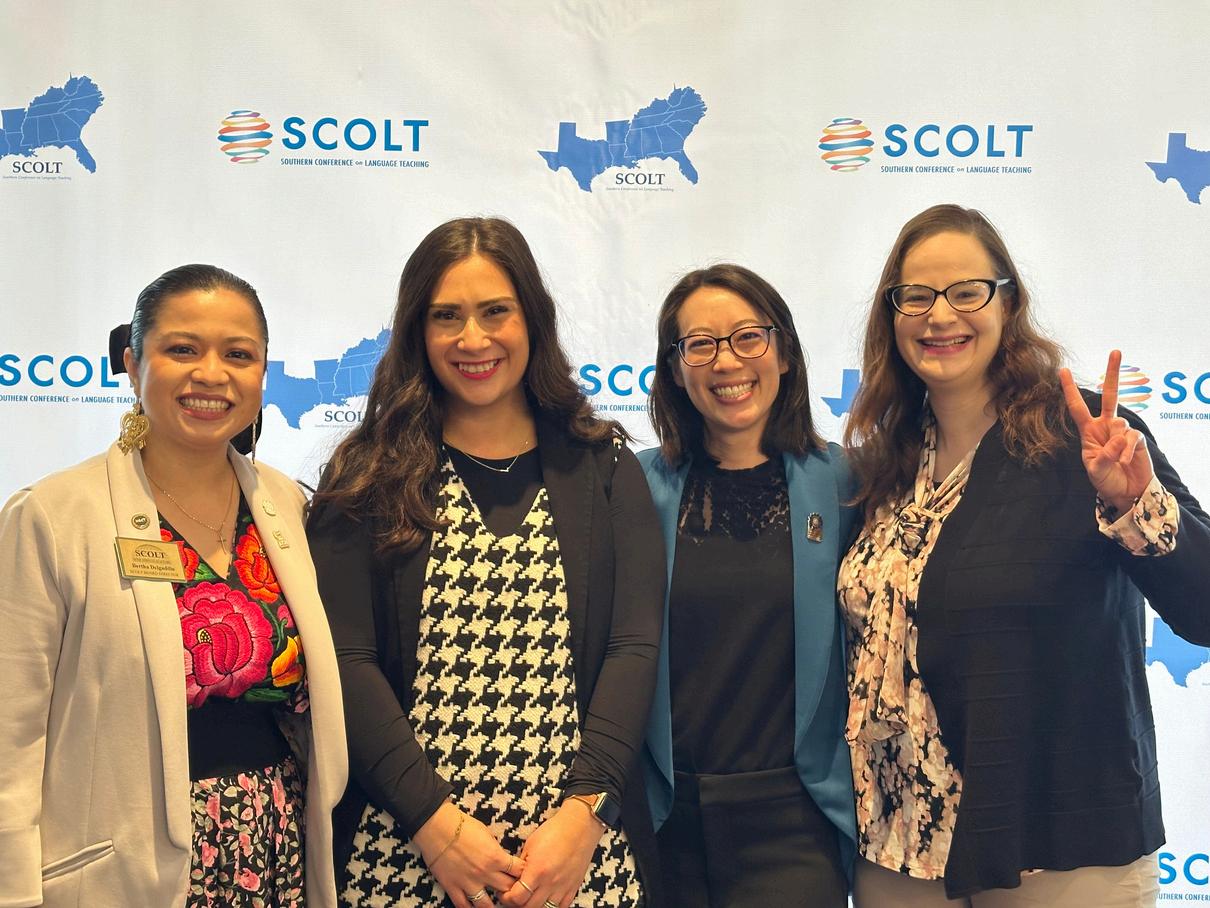
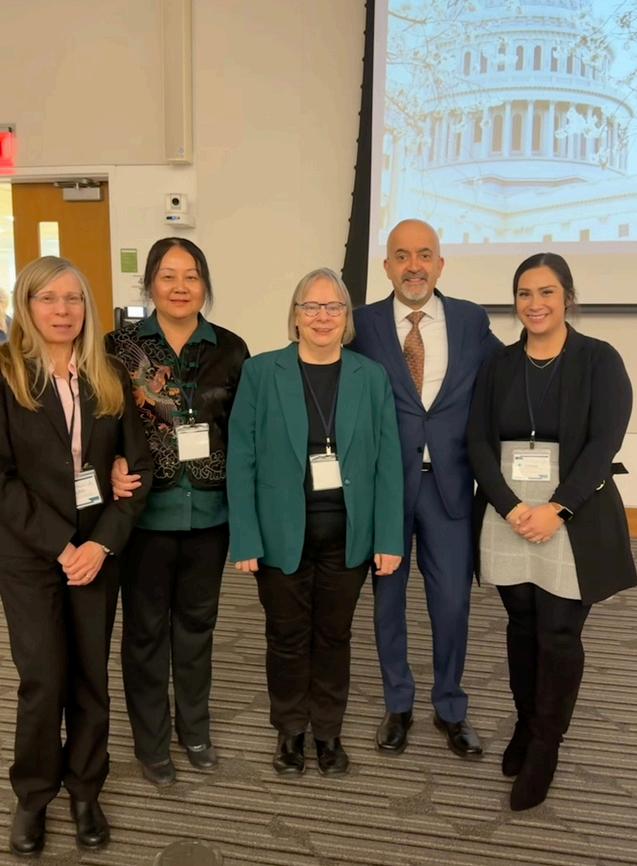
SCOLTalk: “How
SCOLTalk: “In your opinion, what is the most challenging aspect of being a WL teacher today?”
One of the most challenging aspects of being a world language teacher is the ongoing need to advocate for our programs by constantly demonstrating their relevance and connection to other disciplines. Unlike many other subject areas, world language educators are often required to justify the value of their work, despite a wealth of research supporting the cognitive, academic, and social benefits of language learning. We regularly find ourselves making the case for how world languages positively impact all areas of learning. I hope that decision-makers will come to recognize and support the critical role we play in shaping wellrounded, globally competent students.
do you motivate students to learn another language?”
I m o t i v a t e s t u d e n t s b y
i n c o r p o r a t i n g r e a l - w o r l d l e a r n i n g
e x p e r i e n c e s a n d m e e t i n g t h e m
w h e r e t h e y a r e . I ' m i n t e n t i o n a l
a b o u t g r o u p i n g s t u d e n t s a n d
s c a f f o l d i n g i n s t r u c t i o n t o e n s u r e
e v e r y o n e f e e l s s u c c e s s f u l a n d
s u p p o r t e d O n e o f m y f a v o r i t e
c u r r e n t p r o j e c t s i n v o l v e s s t u d e n t s
c r e a t i n g S p a n i s h - l a n g u a g e g u i d e s
o n h o w t o p r e p a r e f o r w e a t h e r -
r e l a t e d h a z a r d s T h e s e g u i d e s w i l l
b e s h a r e d w i t h o u r l o c a l H i s p a n i c
o u t r e a c h n o n p r o f i t , g i v i n g
s t u d e n t s a m e a n i n g f u l w a y t o a p p l y
t h e i r l e a r n i n g a n d s u p p o r t t h e
c o m m u n i t y .
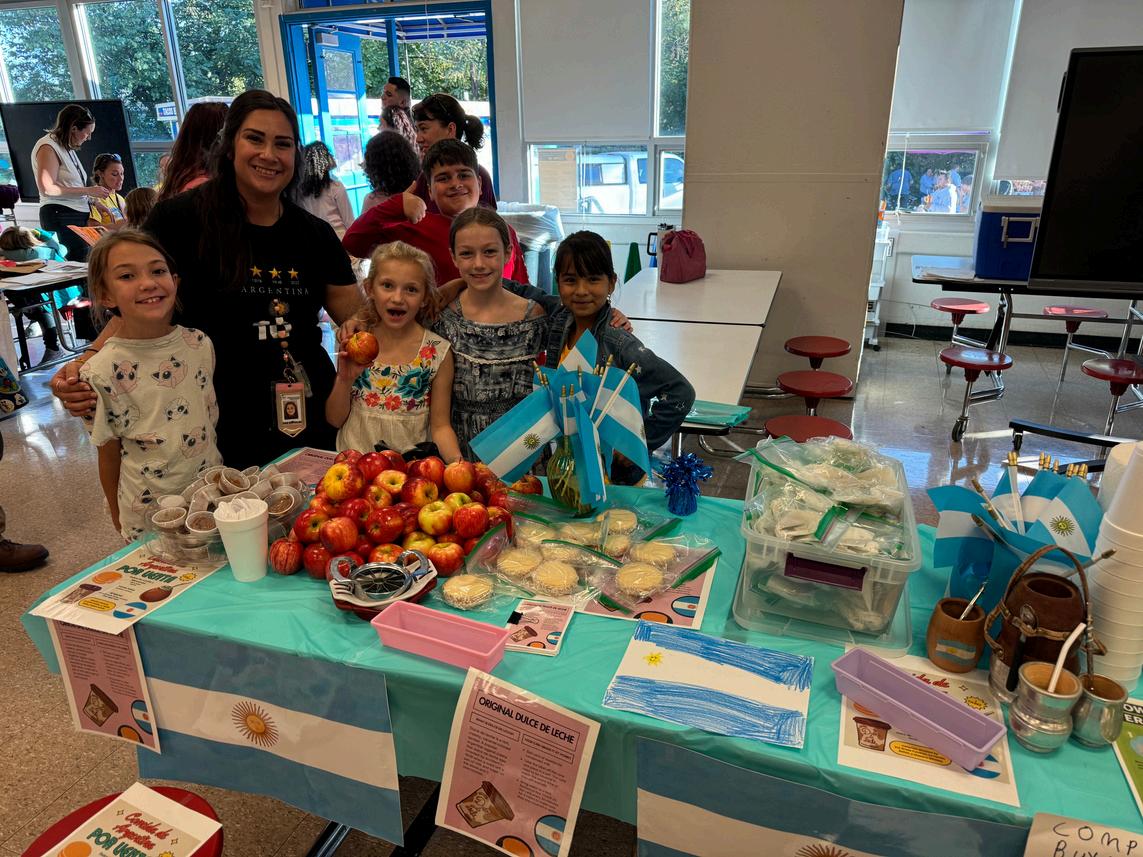
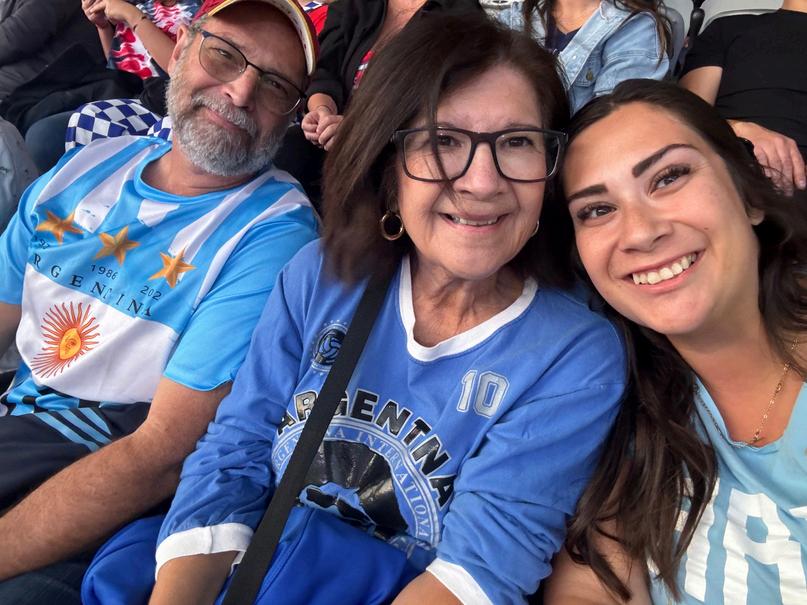
SCOLTalk: “Passion is often what drives great teaching. What first sparked your passion for world languages, and how do you keep that passion alive in your classroom and your professional journey?”
My passion for teaching language learners comes from being a language learner myself. I’m a first-generation American my parents are from Argentina and I know firsthand the power of language in shaping identity and opportunity. My advocacy for world language education centers on its impact on literacy acquisition. As a struggling reader growing up, I was fortunate to have incredible educators who supported me with strong phonics instruction and, just as importantly, recognized my culture and language abilities as assets and pathways to learning English.
I believe that when a child can read, they can learn anything and even change the world. That’s why I’m deeply committed to ensuring every child in this country can read and can access world languages as a meaningful tool to do so. In my classroom, I try to bring my love of language, learning, and culture to life by sharing as much of myself and my story as I can with my students
SCOLTalk: “Can you share a pedagogical approach or instructional strategy that you believe effectively supports language acquisition and student engagement?”
One instructional approach I use to support language acquisition and student engagement is applying the MTSS (Multi-Tiered System of Supports) model specifically for language learning I believe language should be taught through rich mentor texts and lived experiences. These "texts" can take many forms books, podcasts, songs, websites, or videos anything that gives students a concrete anchor for language and content. I intentionally mirror the content and skills being taught in other disciplines, presenting them in Spanish, so students have a familiar context and a strong starting point My instruction is deeply rooted in the science of reading, with a focus on building background knowledge to support comprehension and access to grade-level texts. For those interested in this instructional shift, I highly recommend exploring the work of the Knowledge Matters Campaign.
SCOLTalk: “Working with early language learners requires a unique blend of creativity, patience, and strategy. What do you believe are the most important considerations when designing instruction for younger students, and how do you foster a love of language learning at such an early stage?”
The best way to work with any group of kids is to get them moving and give them choices I keep my mini-lessons and whole-class time short no more than 15 minutes. The kids know the routine: I tell them this is my time to teach them something, and then it’s their turn try it out and have fun.
I really believe learning should feel meaningful Kids need to know why they’re learning something and where it’s all leading. I try to connect what we’re doing in class to the real world whenever I can. This helps develop a love for learning especially language! This year I created a partnership with an k-12 school in Argentina where my cousins go to school so this connection to the real world has been really meaningful in giving my kiddos a chance to see how their learning can make a difference beyond our classroom
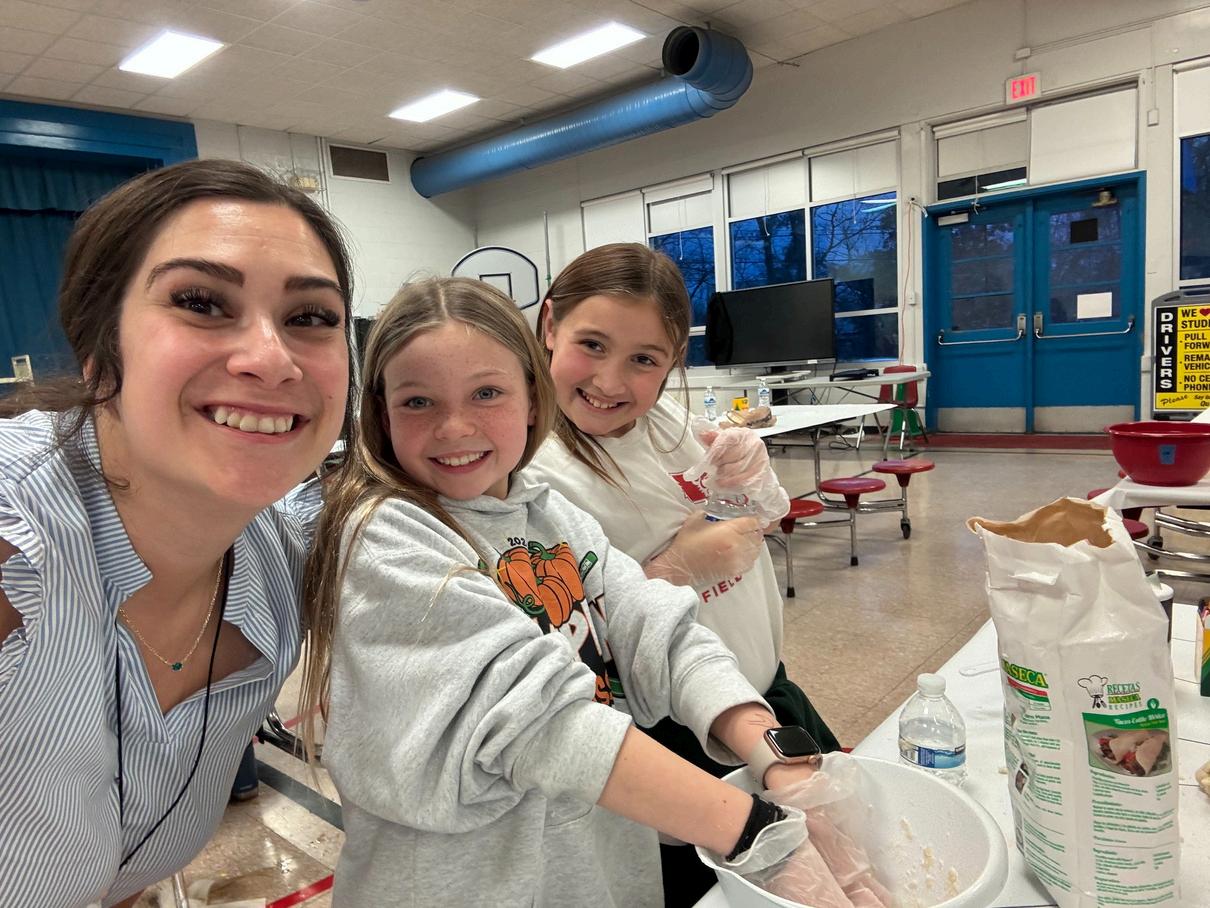
SCOLTalk: “Working with early language learners requires a unique blend of creativity, patience, and strategy. What do you believe are the most important considerations when designing instruction for younger students, and how do you foster a love of language learning at such an early stage?”
The best way to work with any group of kids is to get them moving and give them choices I keep my mini-lessons and whole-class time short no more than 15 minutes. The kids know the routine: I tell them this is my time to teach them something, and then it’s their turn try it out and have fun.
I really believe learning should feel meaningful Kids need to know why they’re learning something and where it’s all leading. I try to connect what we’re doing in class to the real world whenever I can. This helps develop a love for learning especially language! This year I created a partnership with an k-12 school in Argentina where my cousins go to school so this connection to the real world has been really meaningful in giving my kiddos a chance to see how their learning can make a difference beyond our classroom
SCOLTalk: “In what ways do you involve families or communities in supporting early language learning outside of the classroom?”
I work at an amazing dual-language school that truly values the importance of language learning. We’re fortunate to have so many strong community partnerships, and I feel lucky to be part of them.
One experience that stands out this year was a set of discussions we had about the Chicano Movement. We explored how the Civil Rights Movement paved the way for other minority groups particularly within the Hispanic community to advocate for themselves, especially in areas like sustainable farming That conversation naturally led us to the equine industry, which is a major part of Kentucky’s economy. This topic is especially meaningful to me because my own family came to Kentucky from California by way of Argentina through the equine industry. My grandmother worked as a seamstress for a company that made horse blankets and blinders, so this connection runs deep. To bring stories like mine to life and highlight the impact of Hispanic communities in the equine world, I invited a horse trainer and his assistant to lead a bilingual discussion with our students. We followed it up with a free field trip to Churchill Downs the iconic racetrack in Louisville. I try to champion our program and its importance every chance I get. Just a few weeks ago, I coached 33 students to compete in the statewide World Language Showcase Over 60 students and community members made the one-hour drive to Lexington, KY to support the event. I’m incredibly proud of the work we’re doing, both in and beyond the classroom.
SCOLTalk: “In an educational landscape where programs are often competing for time and resources, what strategies have you found most effective in advocating for the value and sustainability of World Language programs in your school or district?”
My advocacy platform is centered around literacy. As a National Board Certified Teacher in Early and Middle Childhood Literacy and a graduate of a dyslexia certification program, I bring deep expertise to this area and how it plays out in translanguaging
One of the biggest shifts we’re seeing in reading instruction is the move toward knowledgebuilding curricula. Since 2013, 40 states and the District of Columbia have passed laws or adopted policies promoting evidence-based reading instruction. Research from the science of reading as well as the book The Knowledge Gap makes it clear: background knowledge is one of the strongest predictors of reading success In other words, kids need to know a lot about a lot of different topics to become skilled readers.
That’s where world language programs play a powerful role. In addition to giving students an extra literacy block, WL classrooms engage students in decoding, using context clues, and monitoring for comprehension all critical components of reading proficiency
Investing in world language programs should be a no-brainer, especially considering that only 35% of children in the United States currently read on grade level.
SCOLTalk: “Advocating for world language programs is more important than ever. How can educators and stakeholders work together to raise awareness and support for these programs? ”
I believe it’s essential for world language (WL) educators to be well-informed about the intricacies of K–12 curriculum and student needs We have a responsibility to communicate clearly and effectively with fellow educators, administrators, and stakeholders, using language that makes the value of WL programs accessible and compelling.
To raise awareness and support for these programs, we must be intentional about showing their multidisciplinary impact. WL programs don’t just teach students how to speak another language they also support literacy development, critical thinking, cultural competence, and academic achievement across content areas. When we frame WL as a literacy tool, a workforce development pipeline, and a driver of global awareness, we start to shift the narrative from “extra” to “essential.” Collaboration is key Educators can partner with community organizations, parents, local businesses, and even international groups to create opportunities that showcase the real-world relevance of language learning Events, field trips, and service-learning projects can all help build visibility and support It’s also important to stay informed about public policy and advocate at the state and national levels. WL educators must be part of conversations around curriculum, graduation requirements, and funding. By demonstrating how language programs contribute to national security, economic competitiveness, and intercultural connectedness, we strengthen our case.
Ultimately, advocating for WL programs means telling powerful stories about student success, about access and equity, and about the kind of world we want to prepare our students for When educators and stakeholders work together with a shared vision, we can elevate language education as a vital part of every child’s learning journey
I’m incredibly humbled to represent SCOLT at ACTFL Like many others, I sometimes struggle with imposter syndrome wondering if I’m qualified to speak on these topics. I know that feeling often comes from navigating the complexities of identity, culture, and education.
As someone who has felt too American to fully connect with my Argentinian roots, and too Argentinian to feel fully American, I’ve often wrestled with where I fit in Add to that being early in my career, a first-generation college graduate, and a daughter of immigrants, and it’s easy to question whether I belong despite the years of additional education, certifications, and experience I’ve worked hard to earn.
But I also know that these experiences are exactly what make my voice valuable. First-generation Americans and immigrants carry these tensions with them, often silently, throughout their lives My hope is to bring light to these realities and to represent what’s possible when we believe in ourselves, our stories, and the impact we’re capable of making.
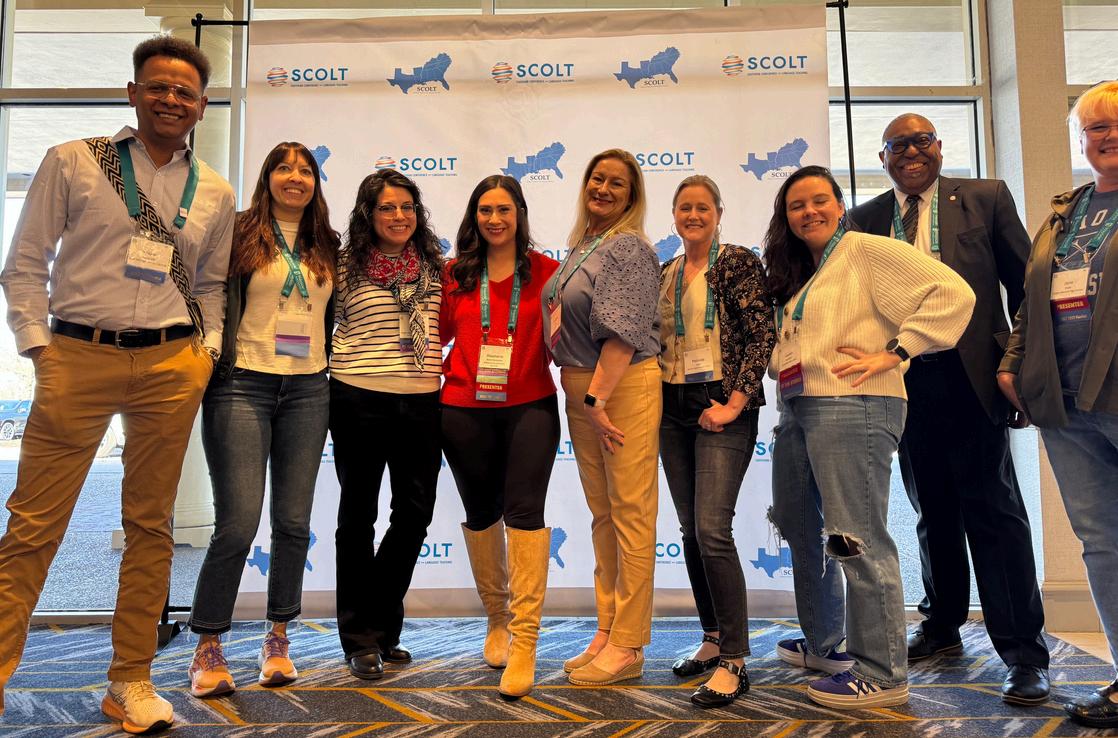
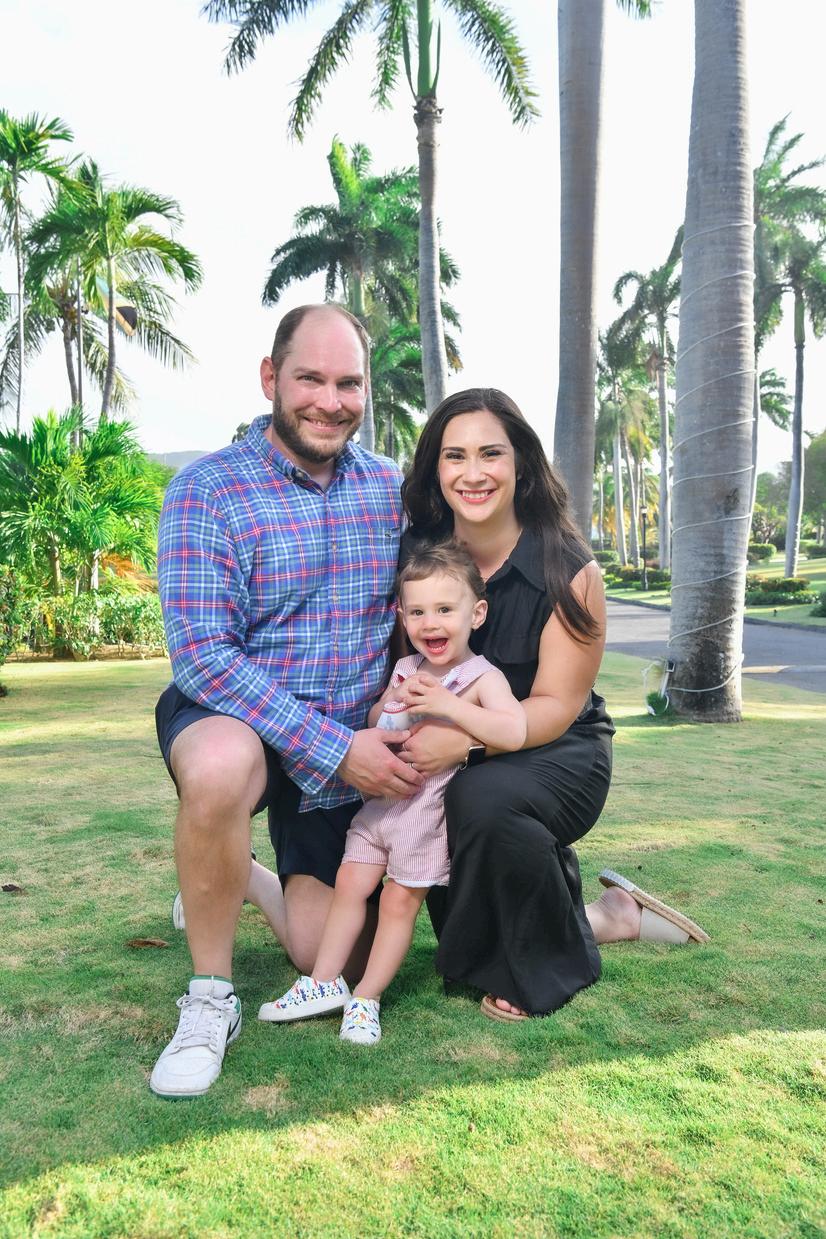
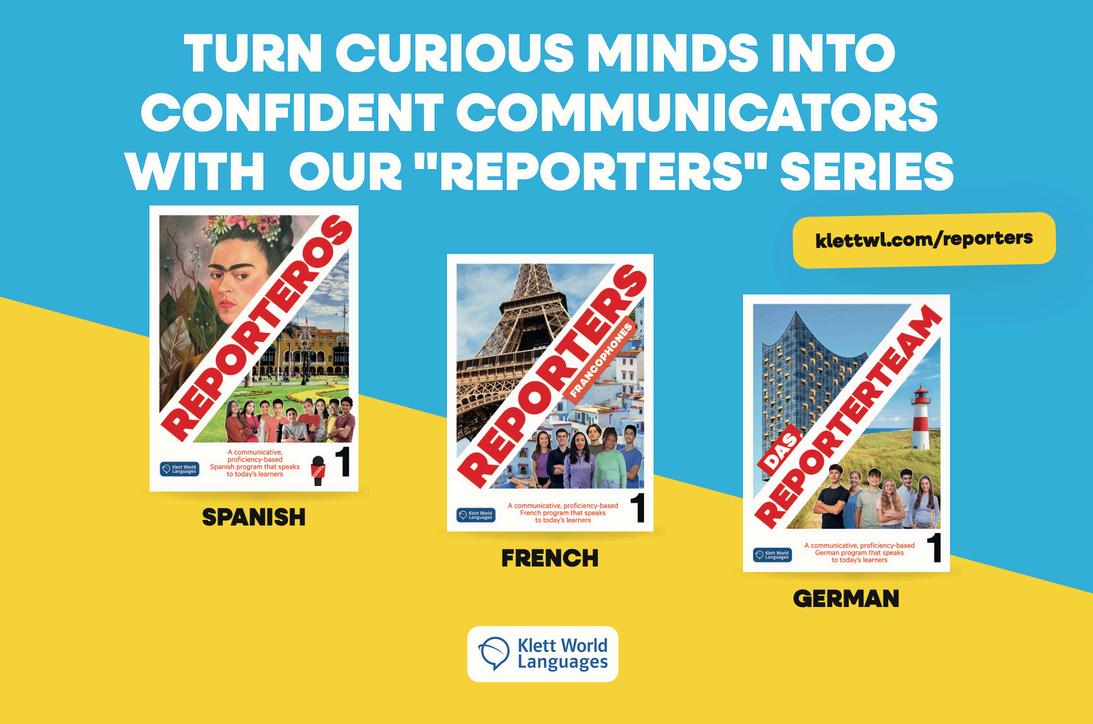
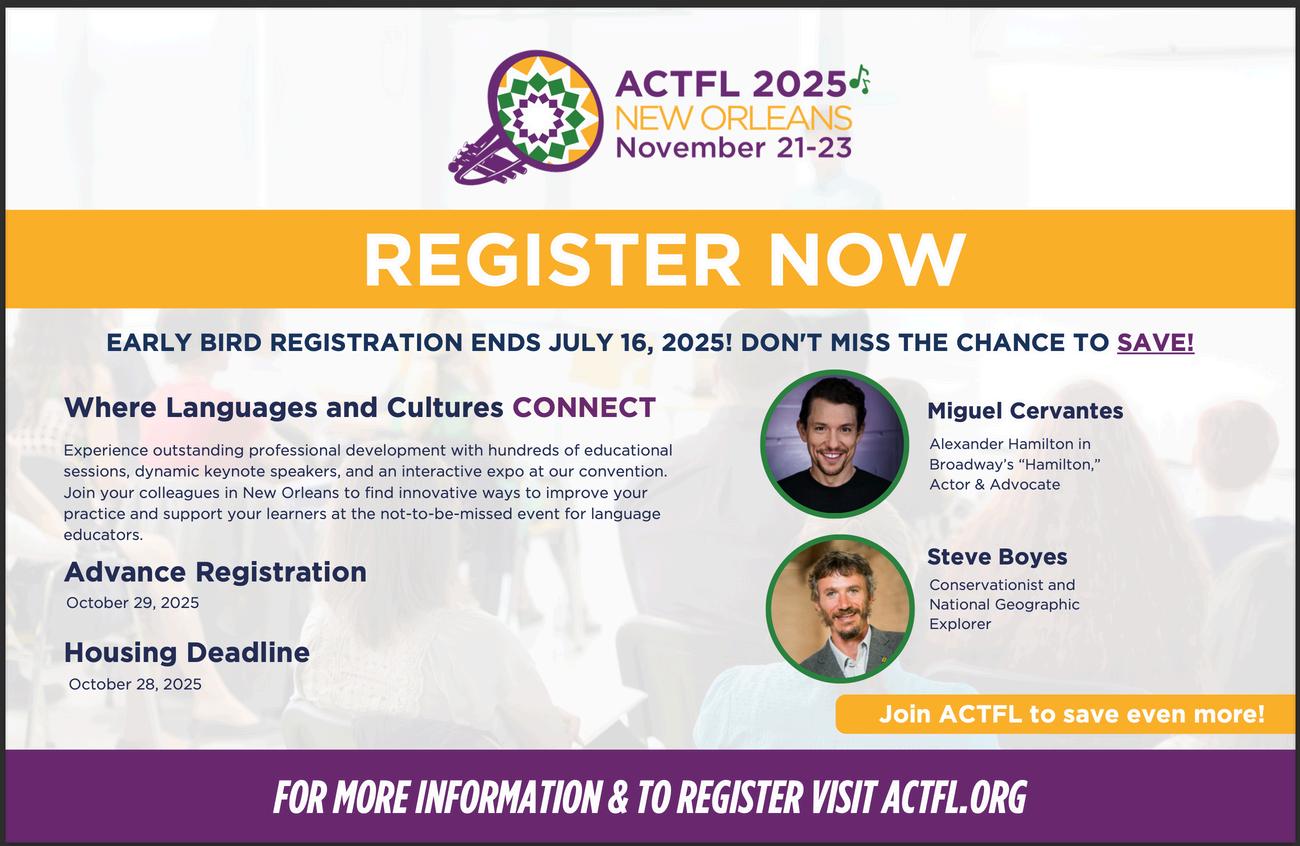

ACTFL UPDATE ACTFL Opposes Executive Order, Urges Embrace of Linguistic Diversity;
Highlights 2025
Convention Opportunities
The American Council on the Teaching of Foreign Languages (ACTFL) strongly opposes the recent White House Executive Order declaring English the official language of the United States. This policy rescinds Executive Order 13166, which improved access to services for those with limited English proficiency, and sends a harmful, exclusionary message to millions of multilingual Americans.
“Designating English as an official language is intended to have a chilling effect on speakers of other languages,” said ACTFL President Milton Alan Turner. “We should affirm the multilingual heritage of our country not silence it.”
More than 67 million U S residents speak a language other than English at home These languages are not just cultural artifacts, but the living fabric of our communities. The Executive Order risks weakening bilingual education, marginalizing communities, and limiting opportunities for students and workers. ACTFL research shows that 90% of American employers actively seek employees with skills in languages other than English “This is not the time to focus on sameness,” said ACTFL Executive Director Lawrence M Paska, “but to uplift the unique talents we each bring to society.”
As part of its mission to celebrate and support language educators, ACTFL invites all professionals to the 2025 ACTFL Annual Convention & World Languages Expo, held November 21–23 in New Orleans. Attendees will access 600+ sessions, a vibrant exhibit hall, and inspiring keynote speakers including Broadway star Miguel Cervantes and National Geographic explorer Dr. Steve Boyes
First-time attendees may apply for a $753 stipend and can earn graduate credit or professional development hours through ACTFL’s new partnership with Idioma Education & Consulting.
For details, registration and housing information, funding ideas, and more, please visit: actfl.org/convention-and-expo.
Now more than ever, ACTFL urges investment in multilingualism as a path to equity, opportunity, and global leadership.
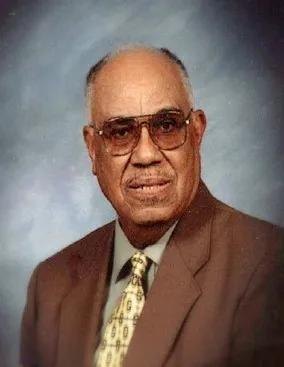
The Bostick Award recognizes teachers in their first to fifth year of teaching who are dedicated to a longterm teaching commitment and have not yet attended a SCOLT conference. Candidates must demonstrate a commitment to future conference participation as part of their professional development. Two teachers are awarded conference registration during each annual SCOLT conference. See this page for more information https://www.scolt.org/bostick-award/.
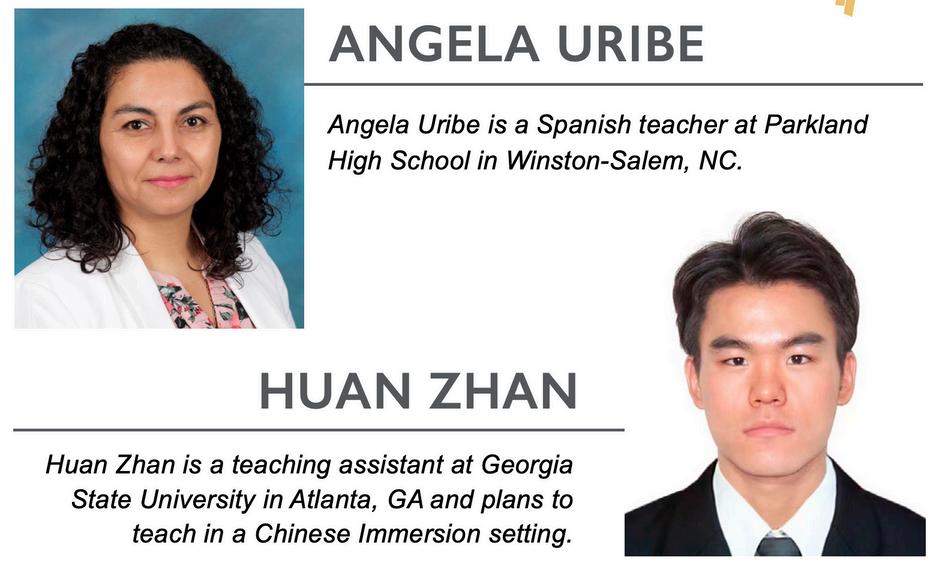
We know as language teachers you know the value and benefits of travel. That’s why you want to apply for one of the SCOLT teacher travel scholarships!
How do you pass these important experiences on to your students?
Do you take your students on trips abroad? Why, or why not?
Inquiring minds want to know!
Please take a moment and help SCOLT and our travel partners learn more about your experience and interest in traveling with students by completing this brief survey by clicking HERE or scanning the code below
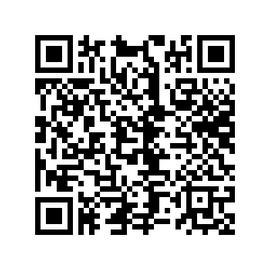
Note: your responses may be shared with conference sponsors.
The SCOLT Leadership Award is given for K-12 educators who have demonstrated excellence in language teaching through service to the school, community, active participation in SCOLT, and leadership and advocacy at the local, state, and/or regional or national level. The nominating documents for this award include a letter of nomination, a statement from nominee of acceptance of nomination (paragraph), a CV/Resume, and two letters of support.
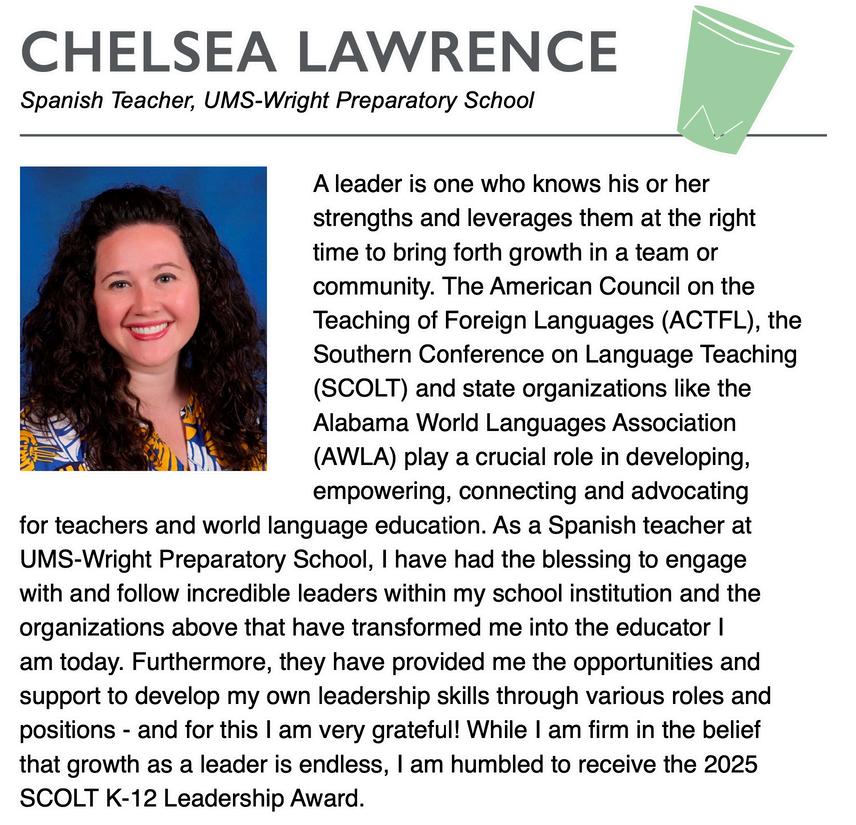
The Educator of Excellence Award for Post-Secondary Educators, formerly known as the Teacher of Excellence Award, recognizes educators at the community college, college, and university level who have demonstrated excellence in language teaching, active participation in SCOLT, and leadership and advocacy at the local, state, and/or regional or national level. The nominating documents for this award include a letter of nomination, a statement from nominee of acceptance of nomination (paragraph), a CV/Resume, and two letters of support
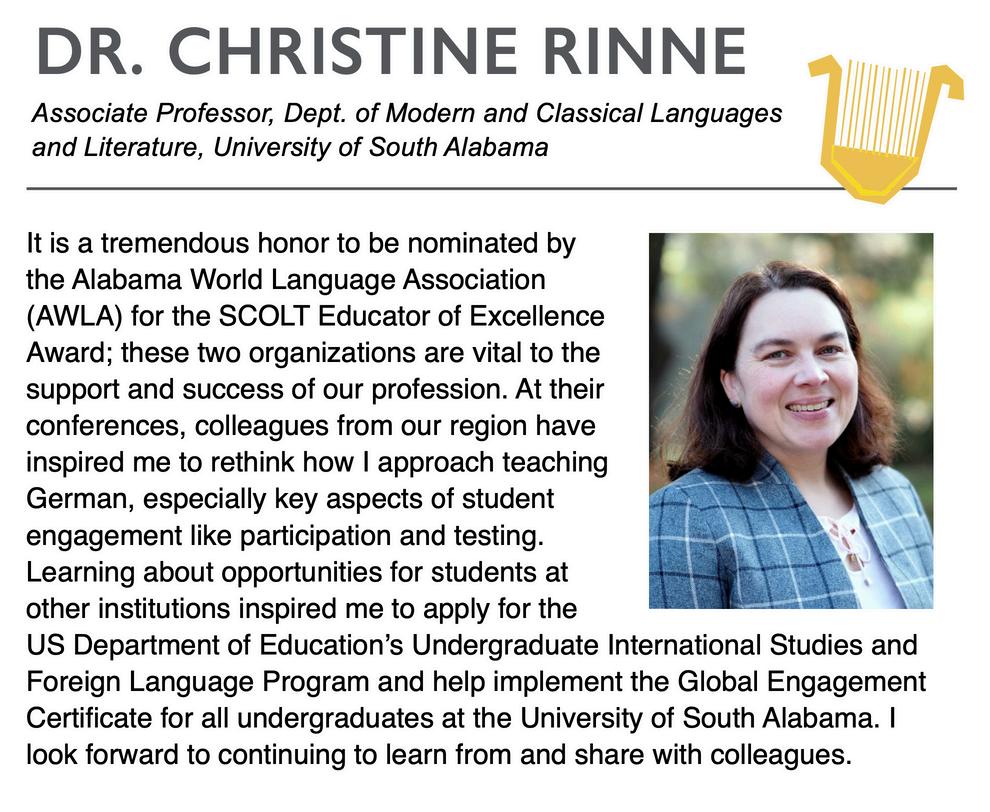
The SCOLT Board of Directors presents the Founders Award when deemed appropriate to a member who has made significant contributions to SCOLT over the years and who exemplifies the spirit and ideals of the founders of the organization.
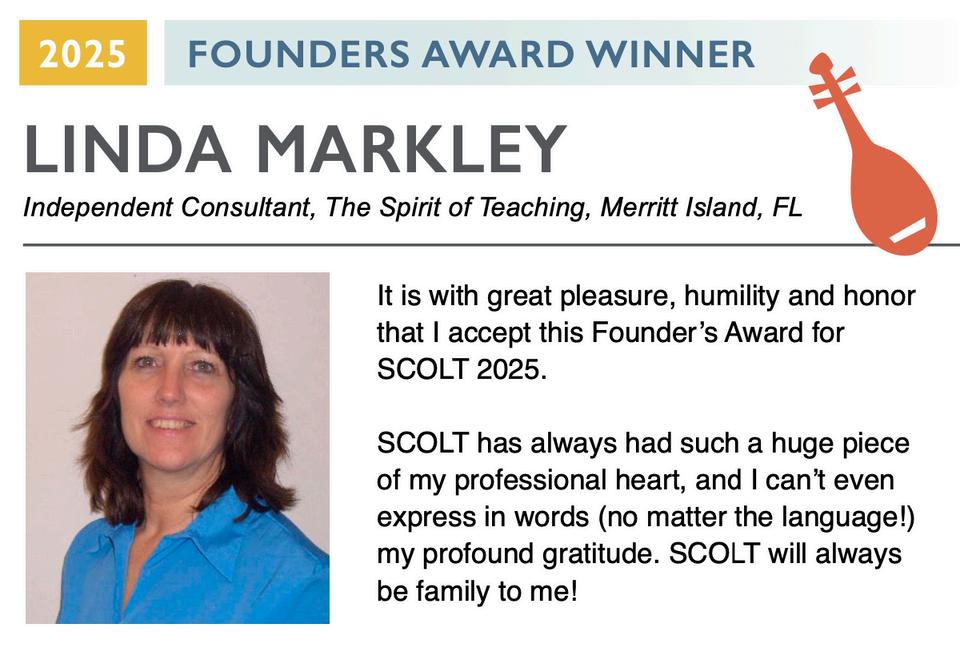
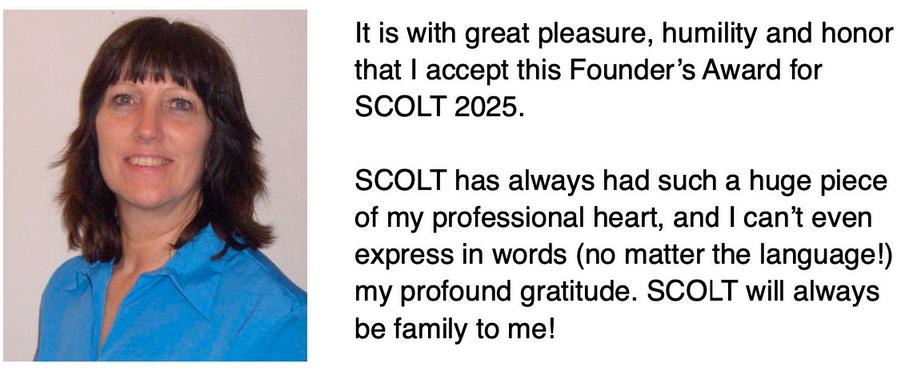
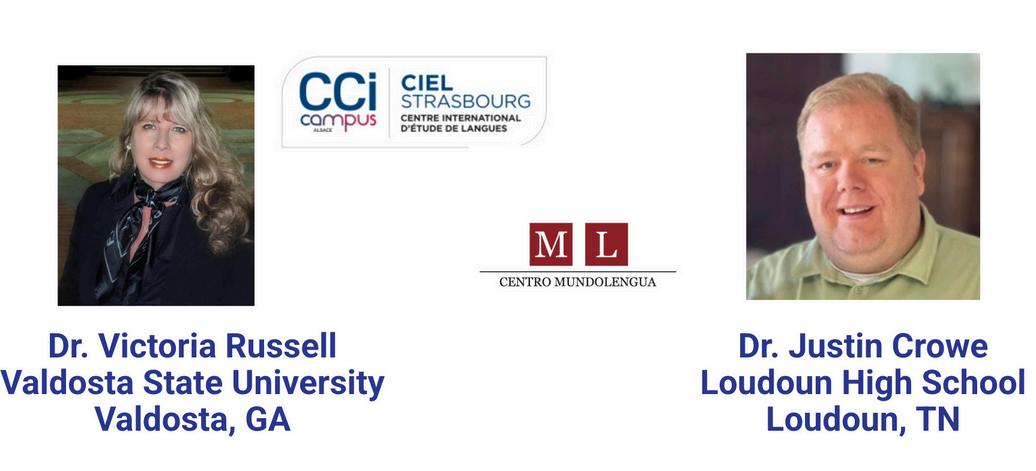
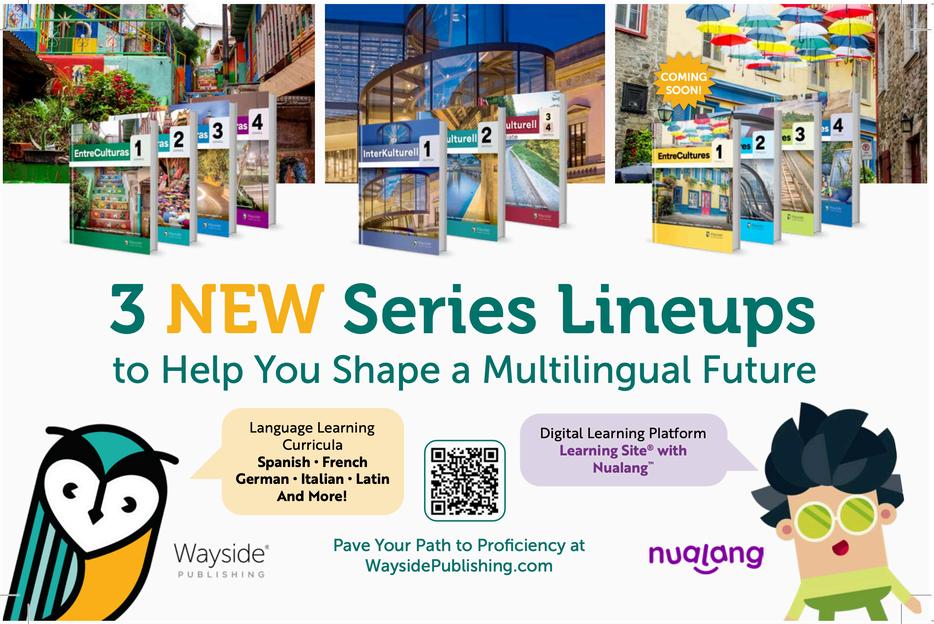
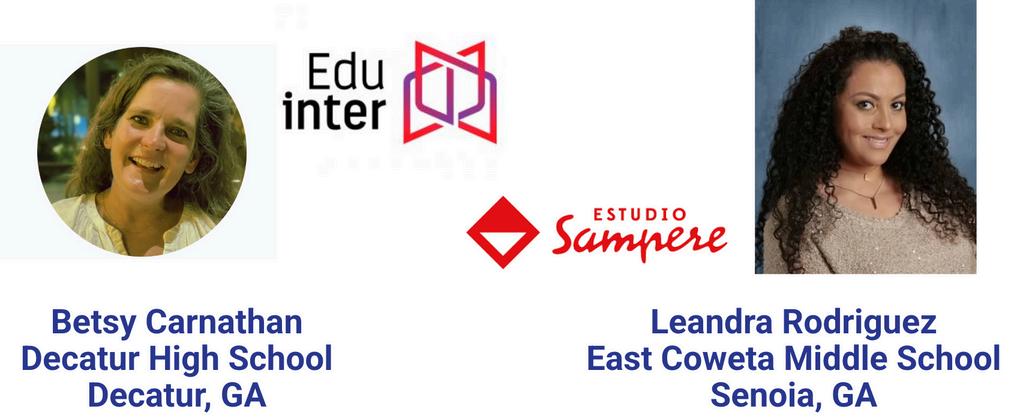
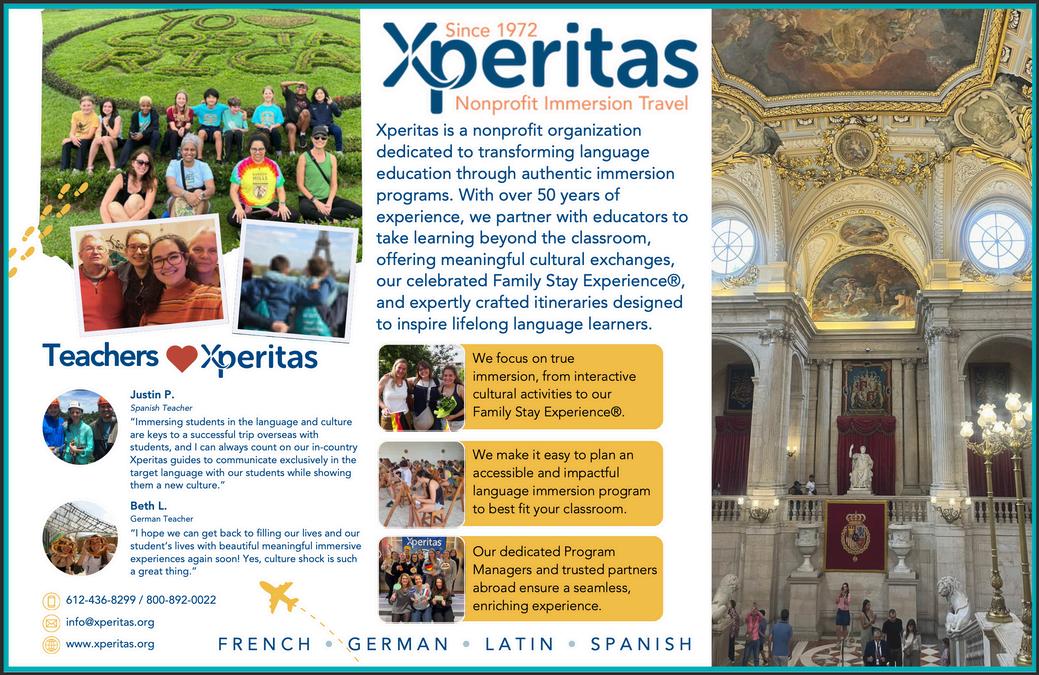
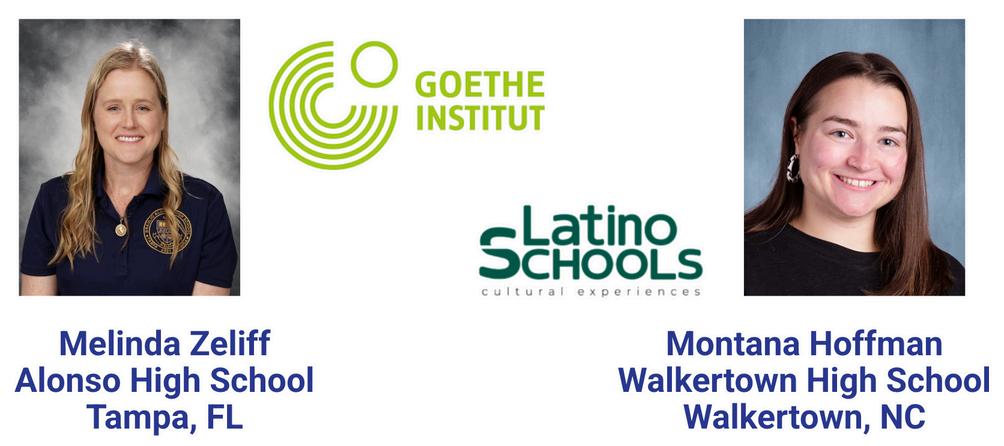
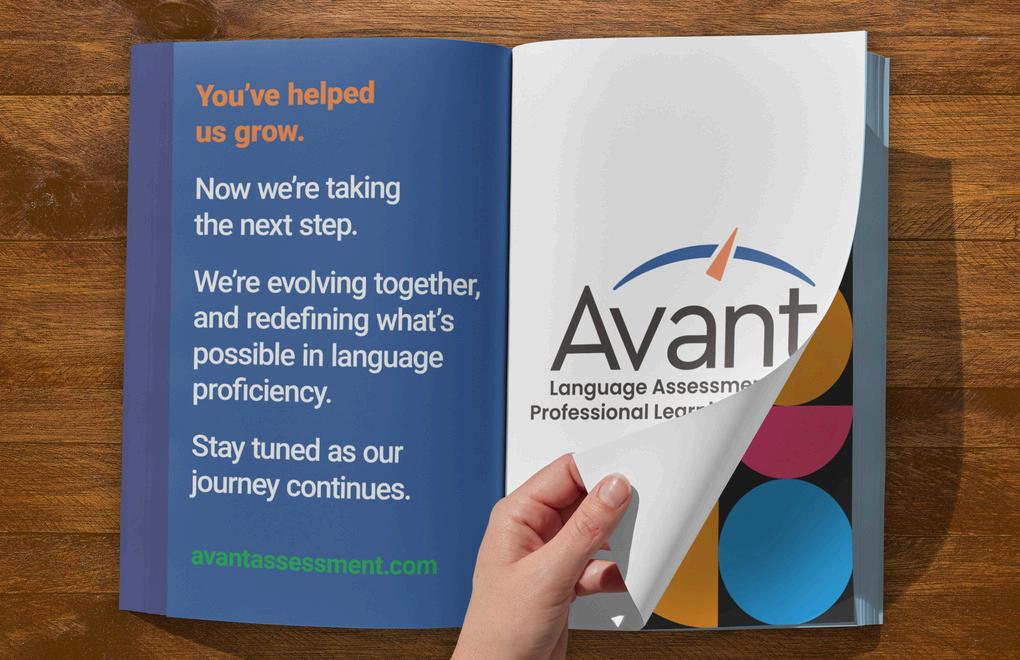
CULTR intends to support teacher professional development by providing new teachers access to local and regional conference attendance through annual grants First-time attendee grants to the AATJ, AATK, CLTA, FLAG and SCOLT conferences will be offered to teachers who have been teaching for five or fewer years. Facilitating teacher access to local and regional conferences supports the creation of communities of practice, which contributes to teacher retention more broadly.
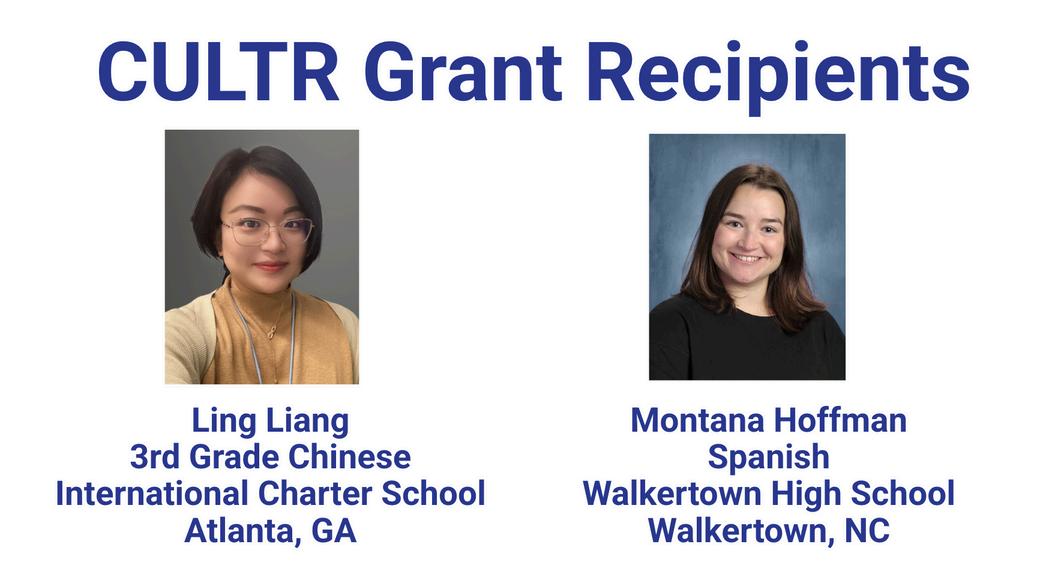
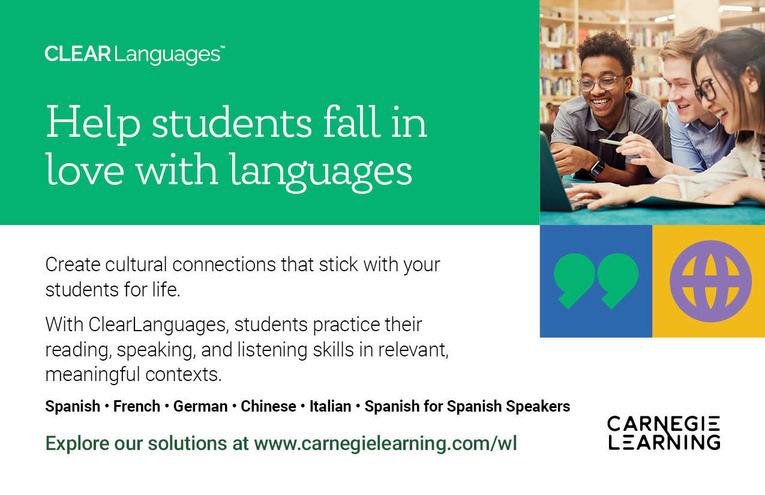
This $1,000 scholarship is intended for a high school senior who plans on a career as a world language educator. The scholarship is sponsored by Ken Stewart, Spanish teacher, former SCOLT Board member and 2006 ACTFL National Language Teacher of the Year. Typically one scholarship is awarded each year. In 2021, two recipients were chosen as they were both outstanding applicants. Applicants must be a current high school senior in a SCOLT state or territory.

Lucy Giordano plans to teach in an elementary Spanish immersion school so that she “can combine [her] two passions: Spanish and teaching ”
Lucy began her study of Spanish in an immersion program at the age of 6, and that has inspired her to teach in the same type of setting. She has shown teaching and leadership skills by working with children’s programs in her church and the community. Lucy is dedicated to the field of education and states that “I don’t just plan to teach, I plan to ensure every student I teach is excited by the change to learn about new cultures and new people in Spanish.” She will attend the University of Edinburgh in the fall, studying Spanish and Linguistics.
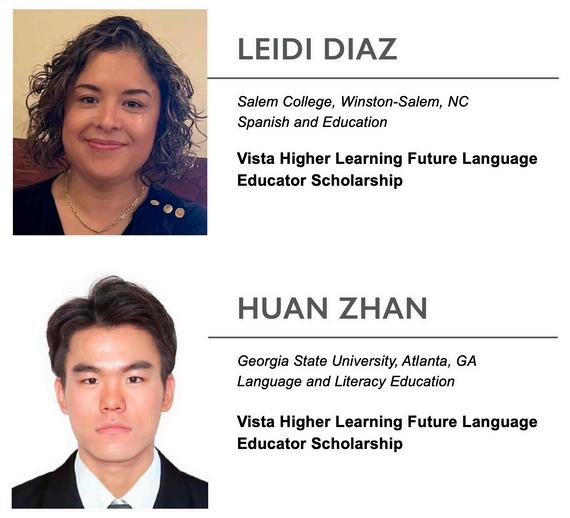
Leidi Diaz is a student at Salem College in WinstonSalem, NC She is majoring in Spanish and Education. Her educational path and life story are inspiring. She is student teaching in the spring of 2025 and completing her studies.
Huan attends Georgia State University, earning a degree in Language and Literacy Education He currently teaches Chinese courses at GSU as a part of his degree program, and plans to be a Chinese teacher.
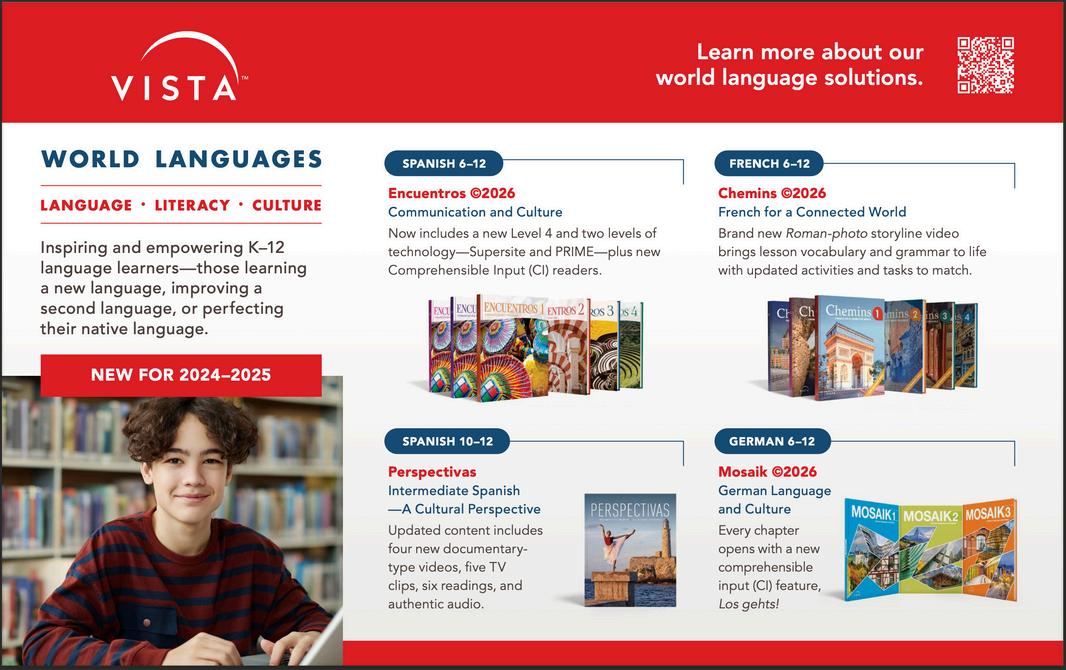
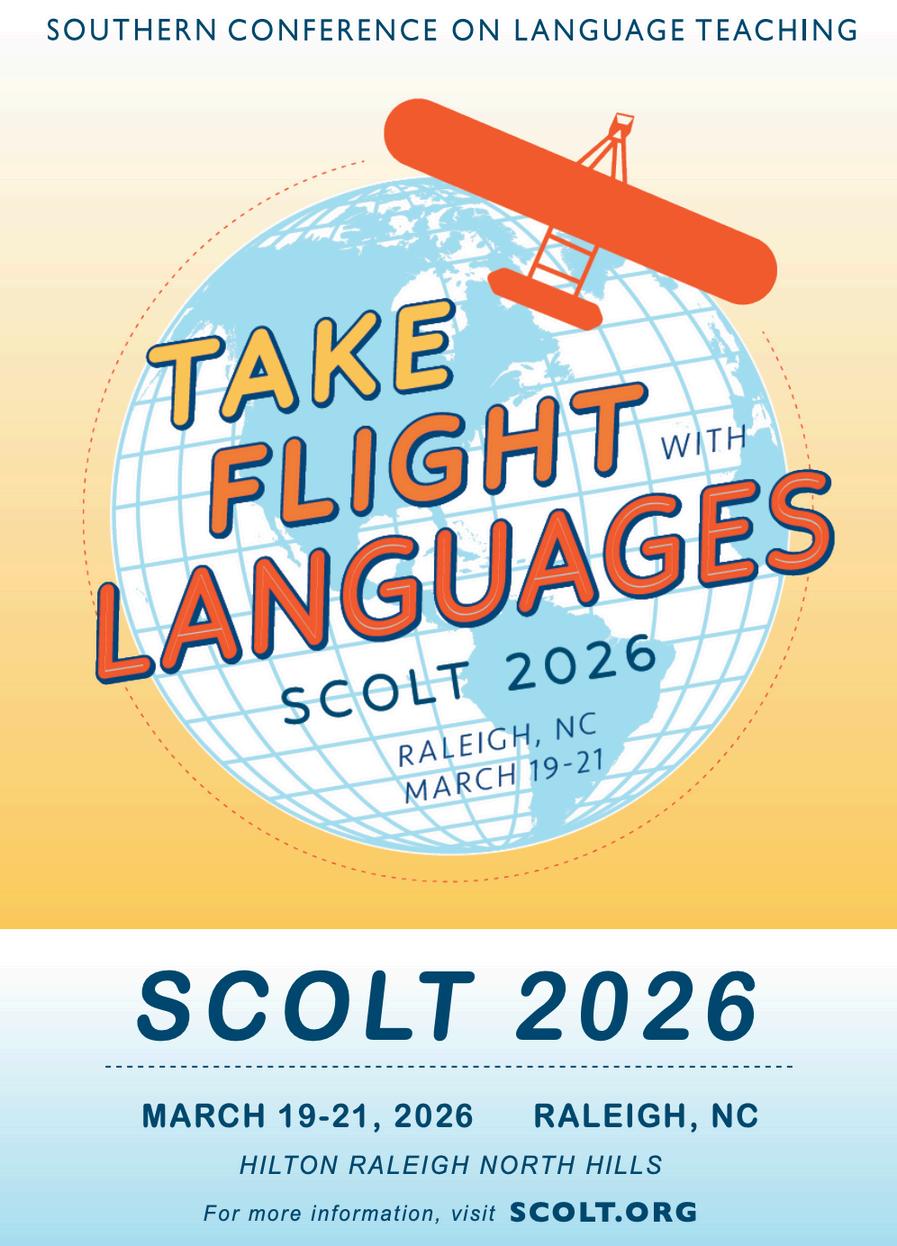
Thank you to all who made the SCOLT 2025 conference a success! The TWLTA and SEALLT Board members were extremely helpful in all aspects of planning and running the conference. Our sponsors and exhibitors were a vital component of the event! And of course, we couldn’t have a conference without our presenters and attendees! Everyone worked together to have a great event and it was great to connect with everyone in-person!
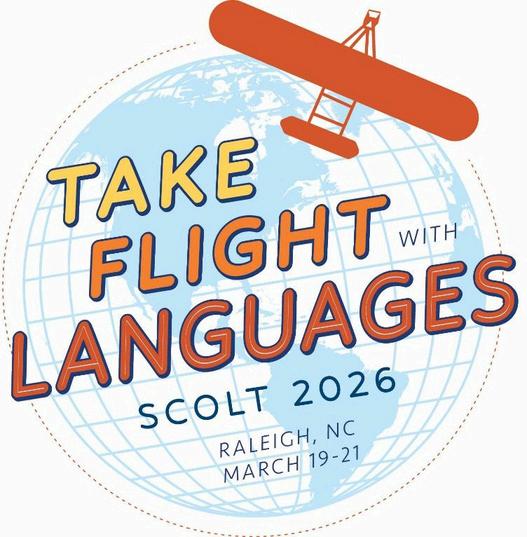
Conference Date
March 19-21, 2026
Location
Hilton Raleigh North Hills Theme: Take Flight with Languages Proposal window April 15-October 13, 2025
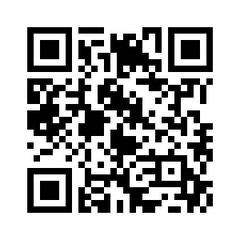
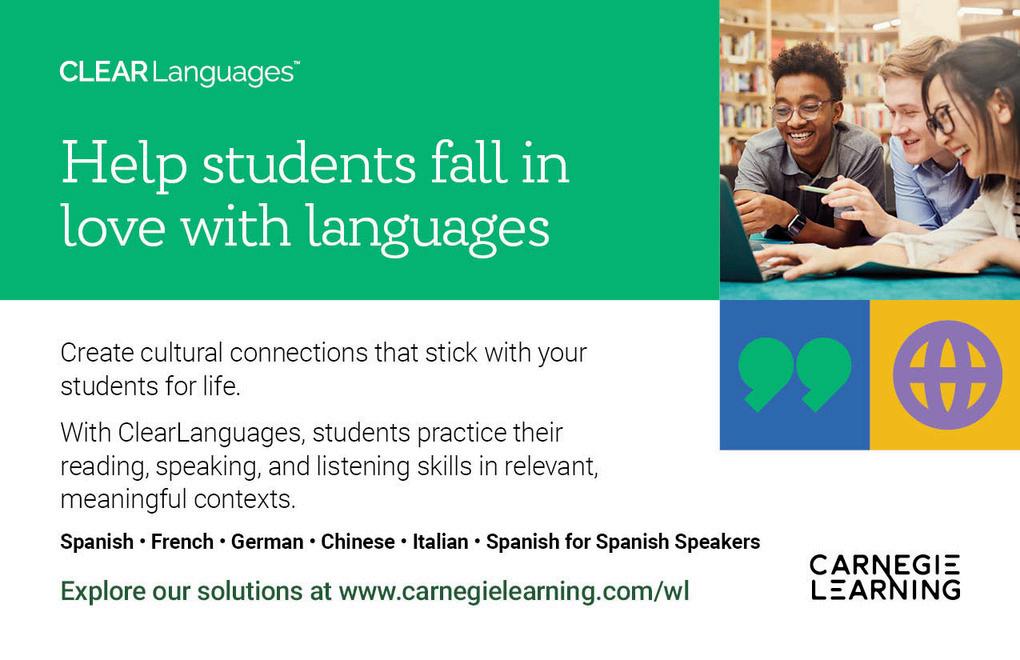
Are you interested in participating in a leadership program for language teachers?
SCOLT wants your input to guide the development of such a program.
Take the survey HERE or scan the code
Survey closes May 16, 2025
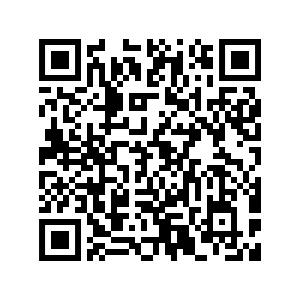
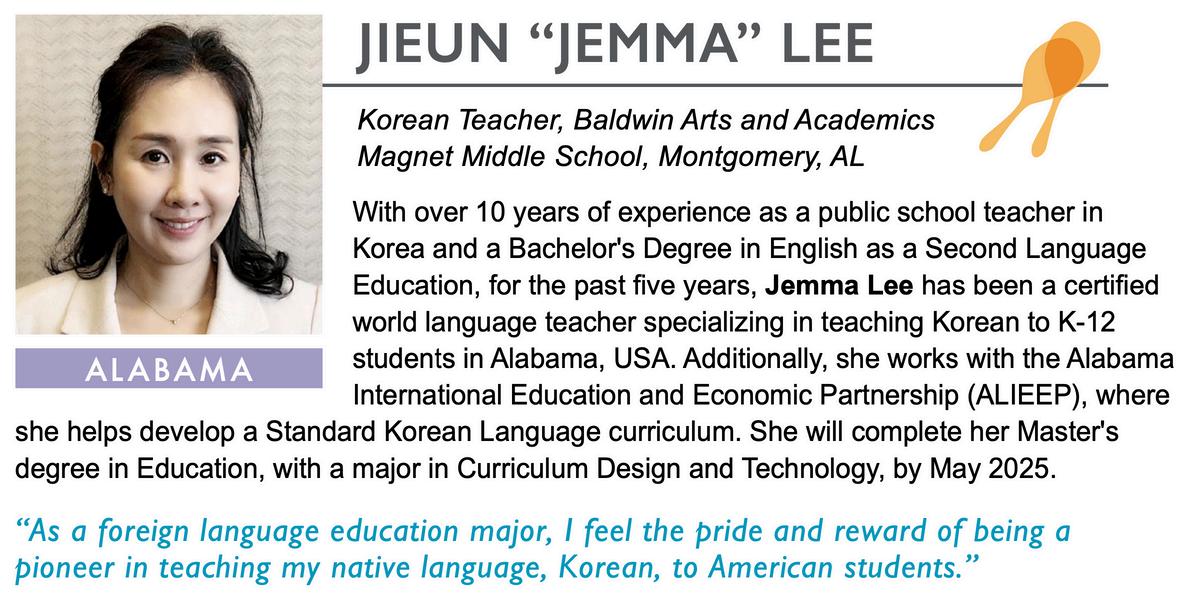
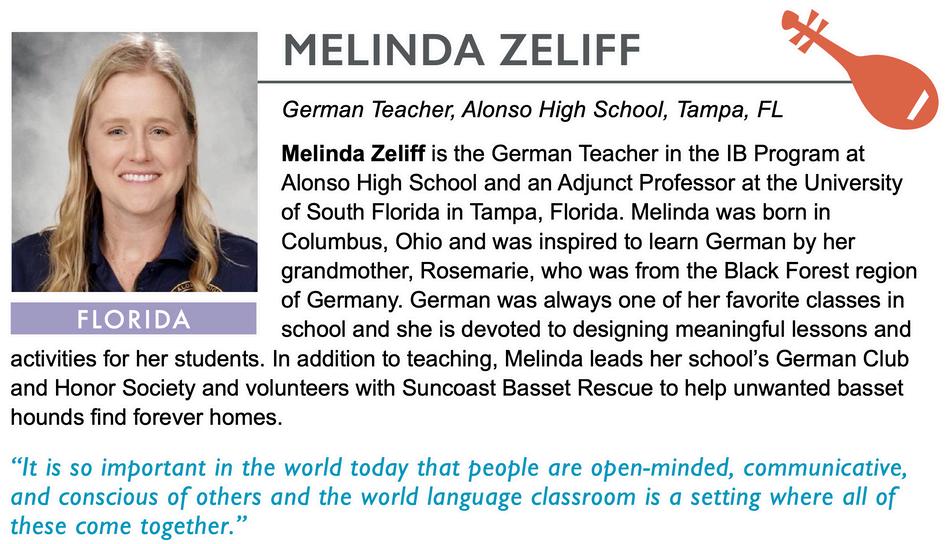
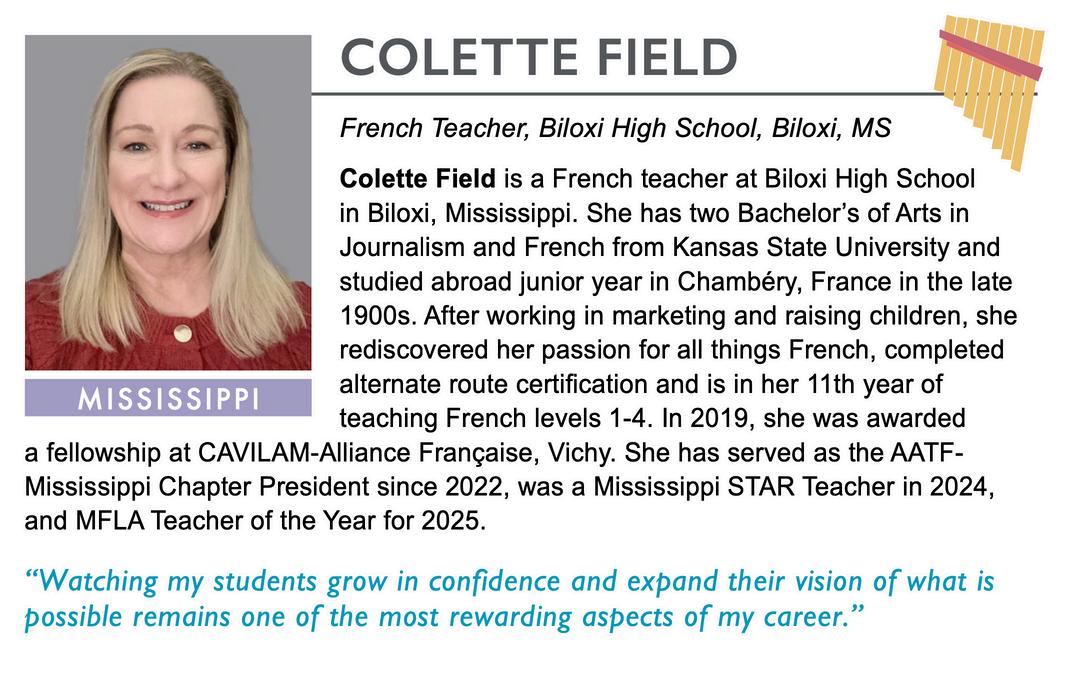
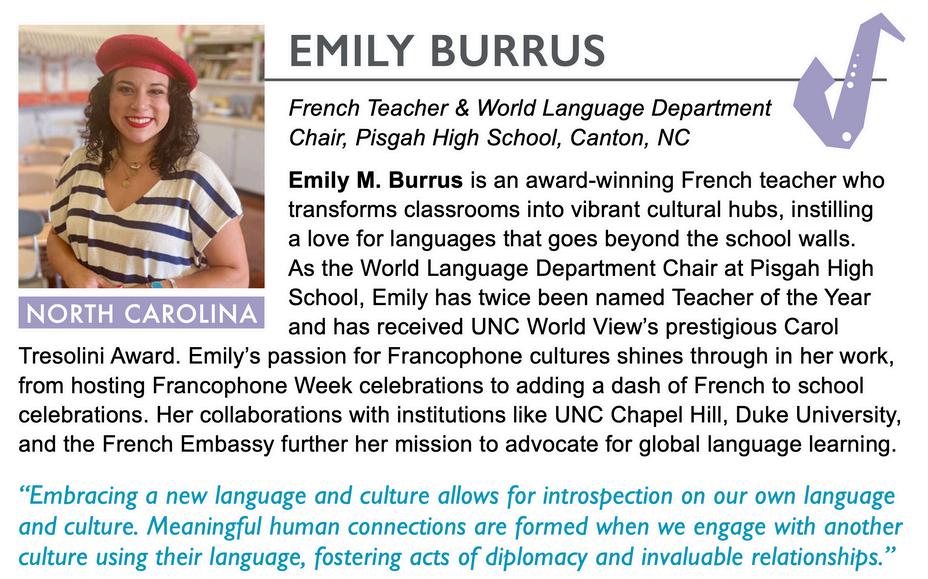
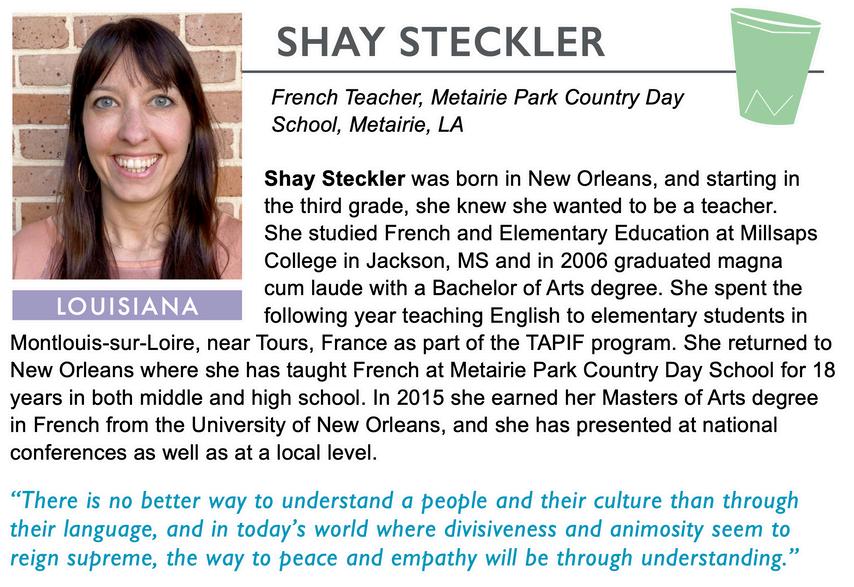
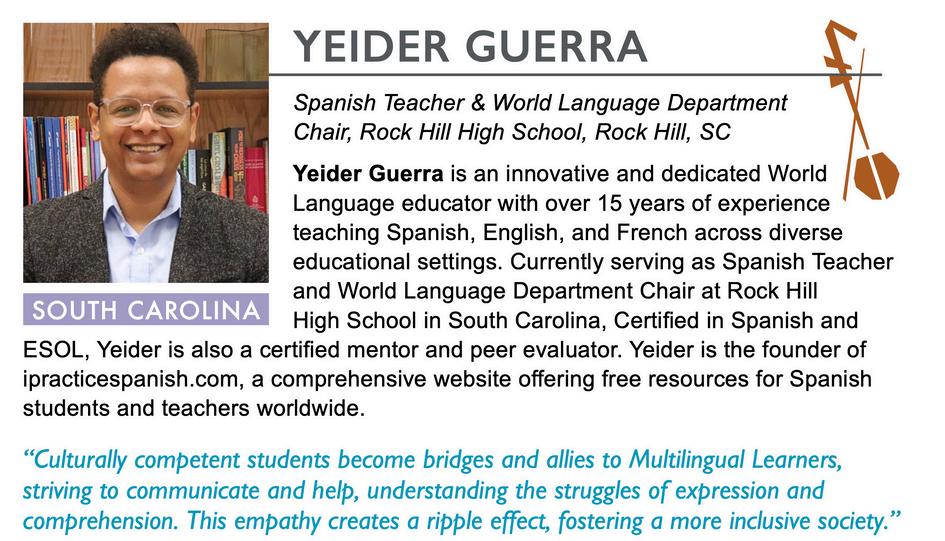
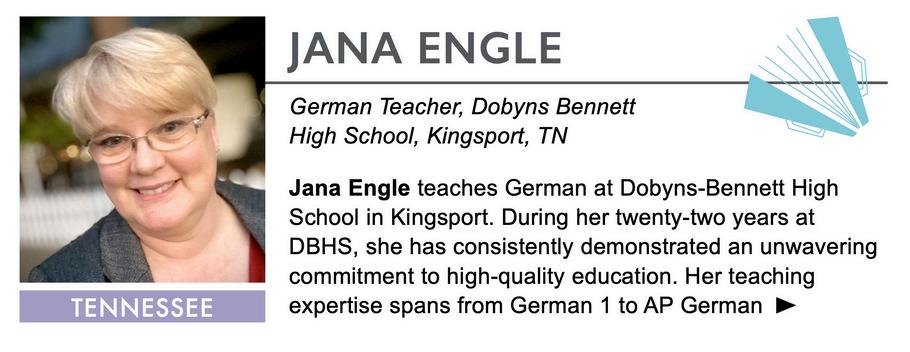

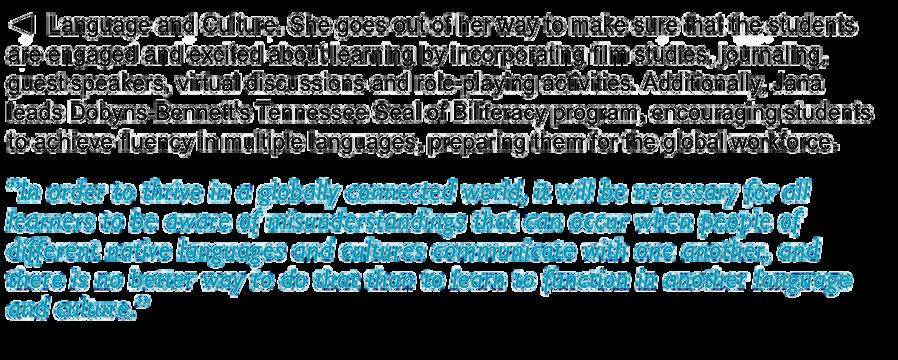
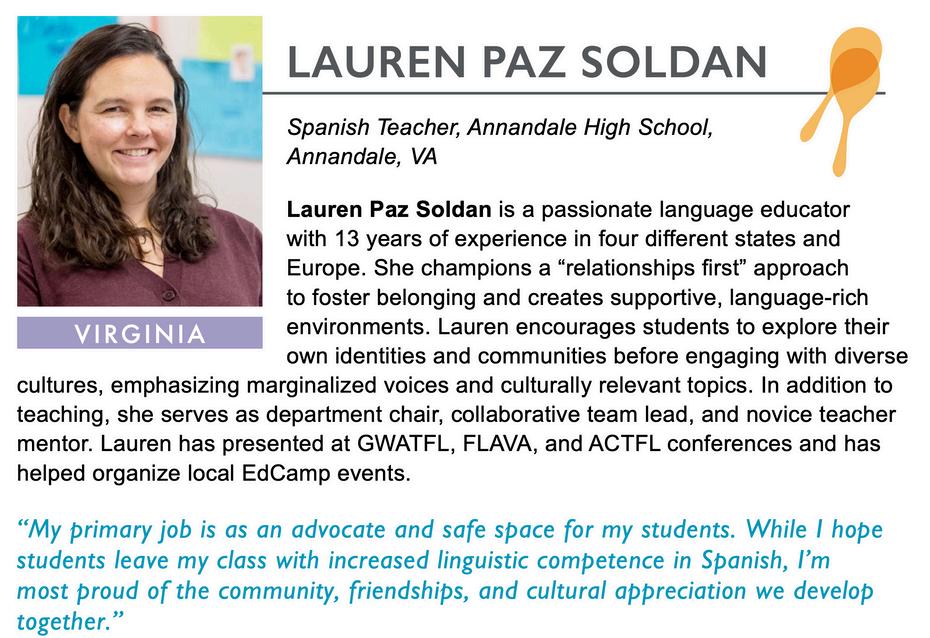
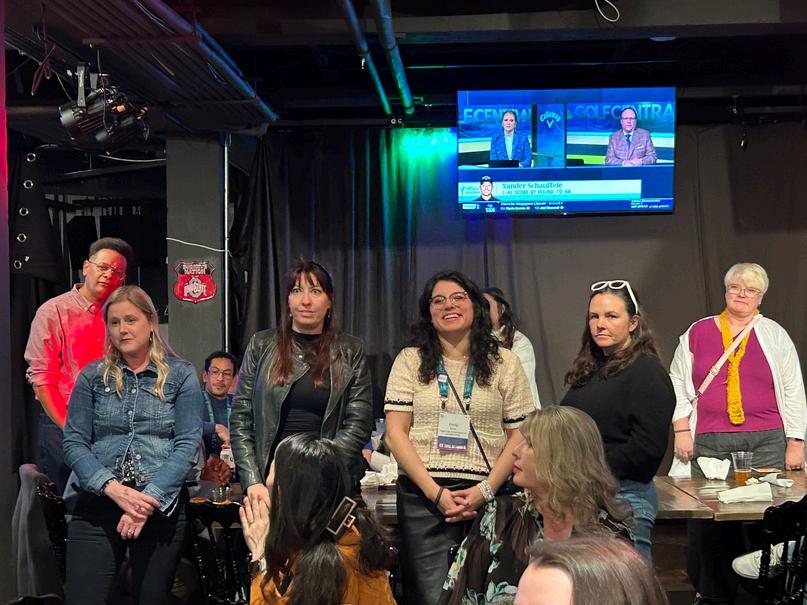

Become a SCOLT Sponsor or Patron!
SCOLT is different from some organizations in that we do not have general membership. Anyone can register and attend the conference without paying a membership fee
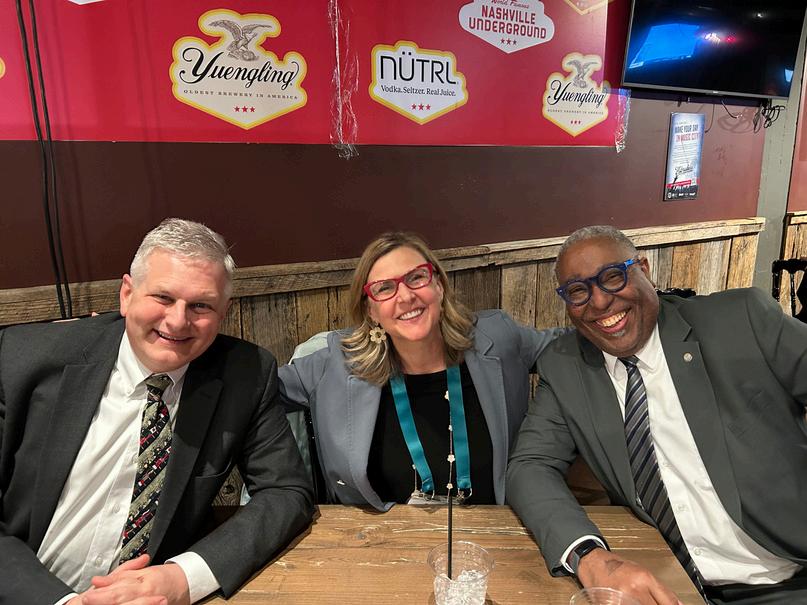
However, we do have Sponsors and Patrons, which is a group of people who pay a Sponsor or Patron membership fee to further support SCOLT.
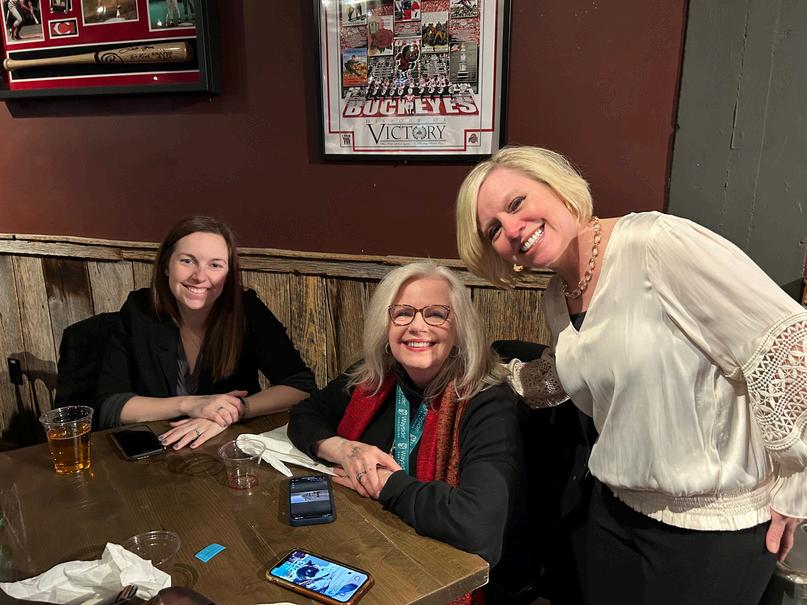
The Sponsors and Patrons have voting rights, which means they elect new board members and can vote on bylaws amendments when necessary. Also, nominees for the board must be Sponsors or Patrons.
These individuals can register for the conference at a reduced rate and there is a special reception and business meeting at the conference for this group.
This will be sure to be a fun event in Raleigh! Sponsor/Patron information can be found HERE.
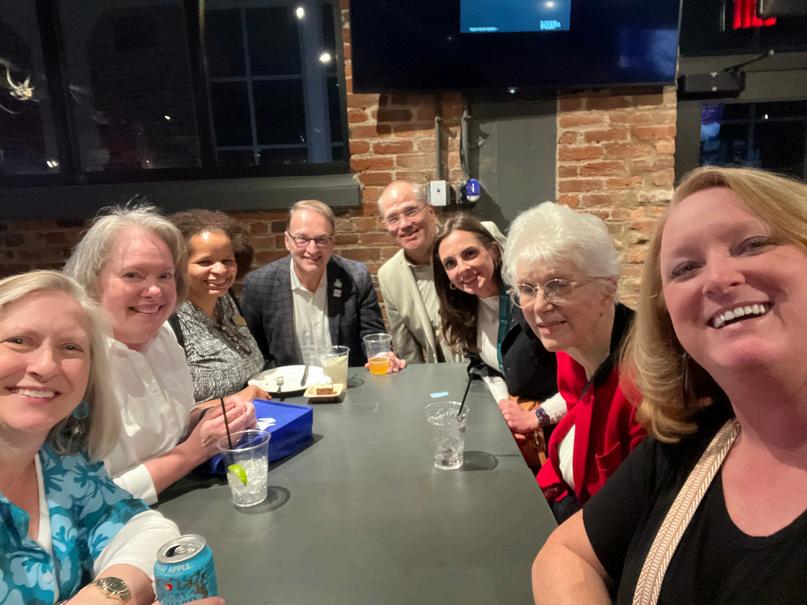
Become a SCOLT Sponsor or Patron today, or when you register for the 2026 conference!
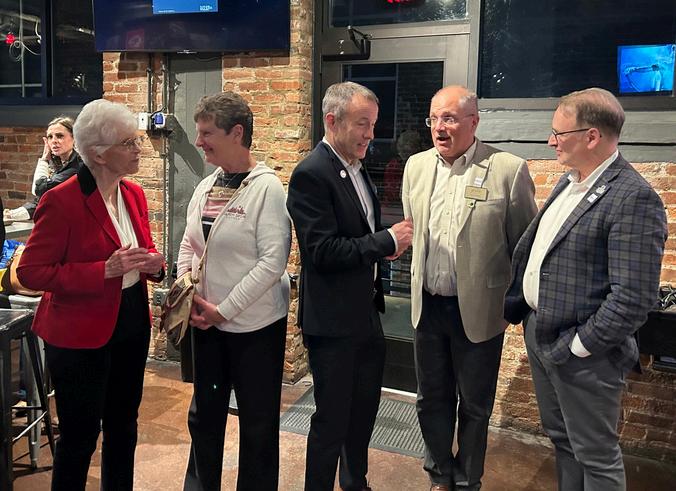
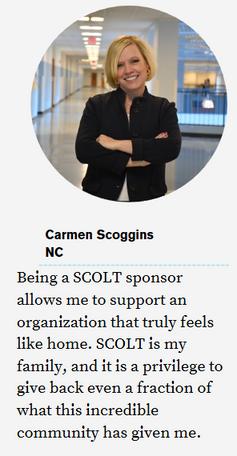
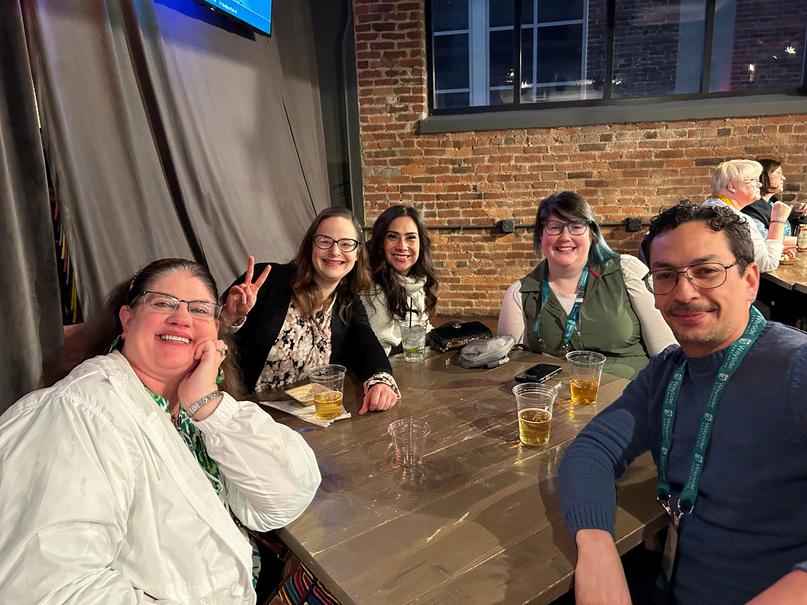
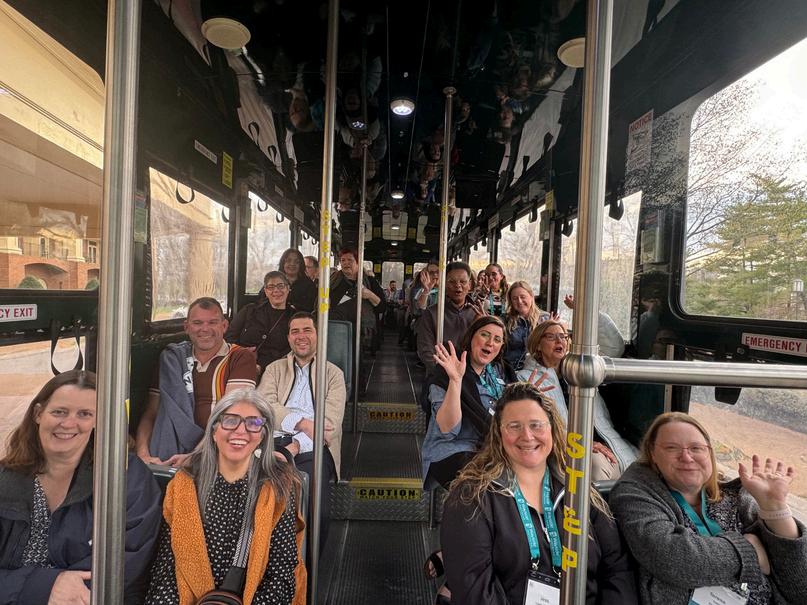
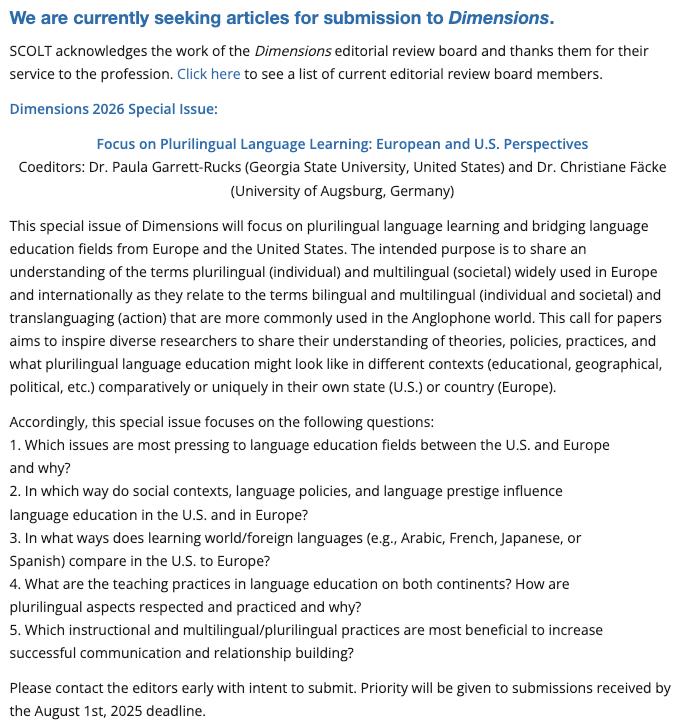
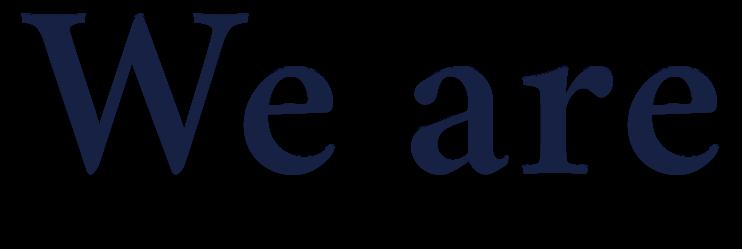
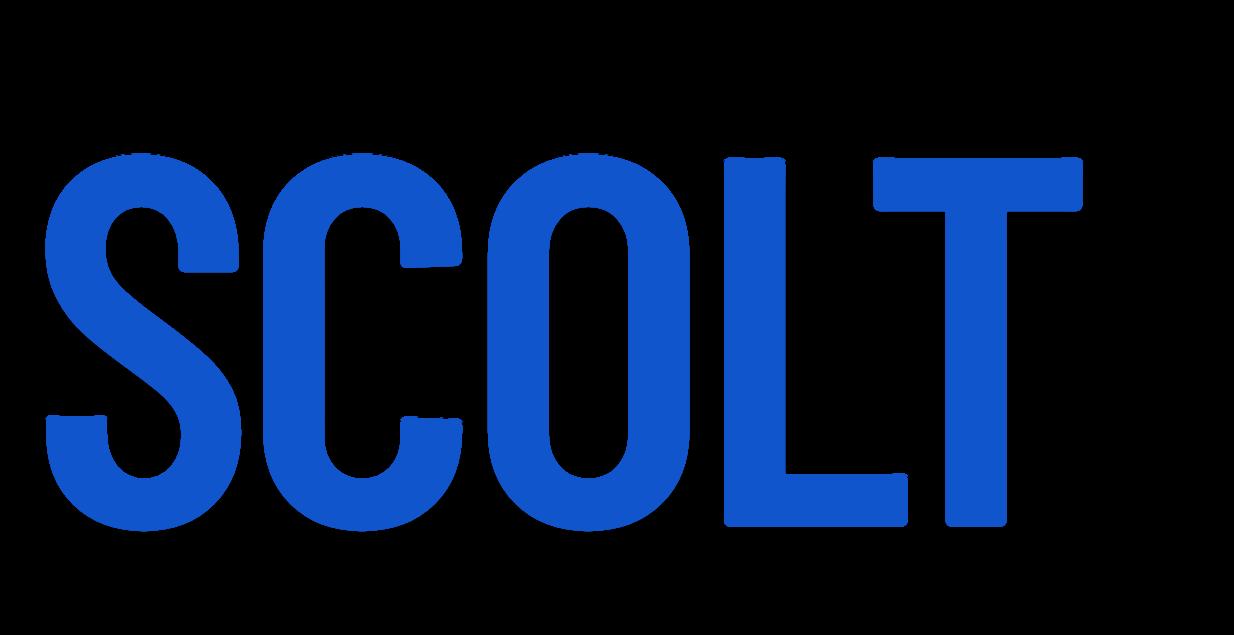
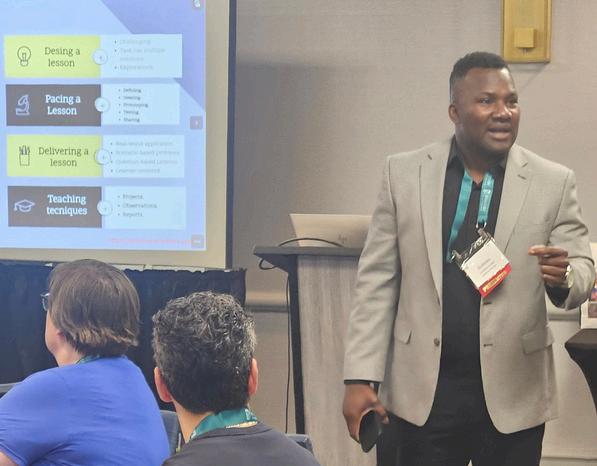
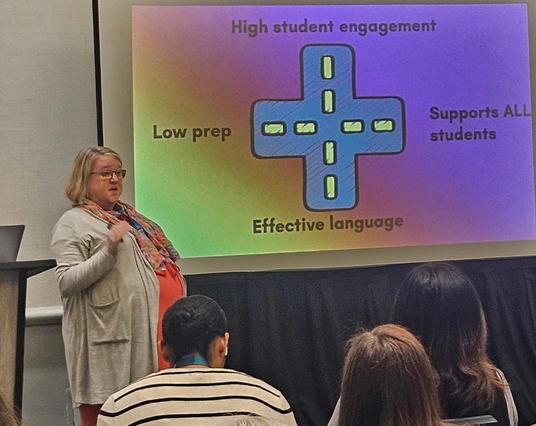
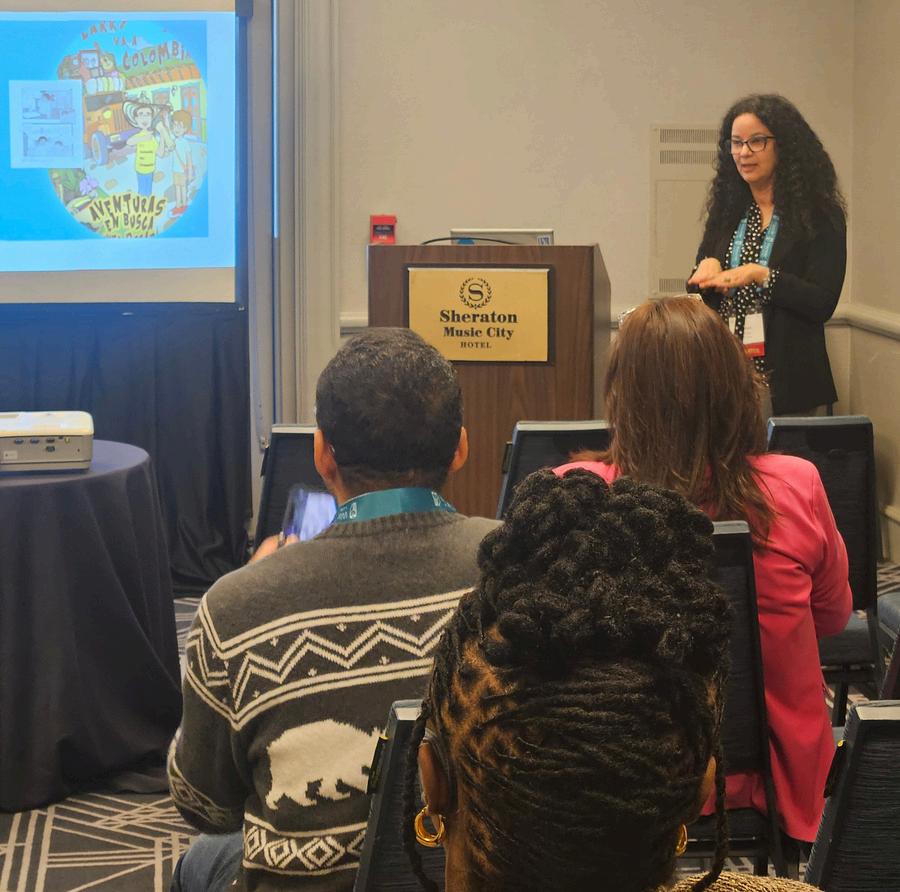
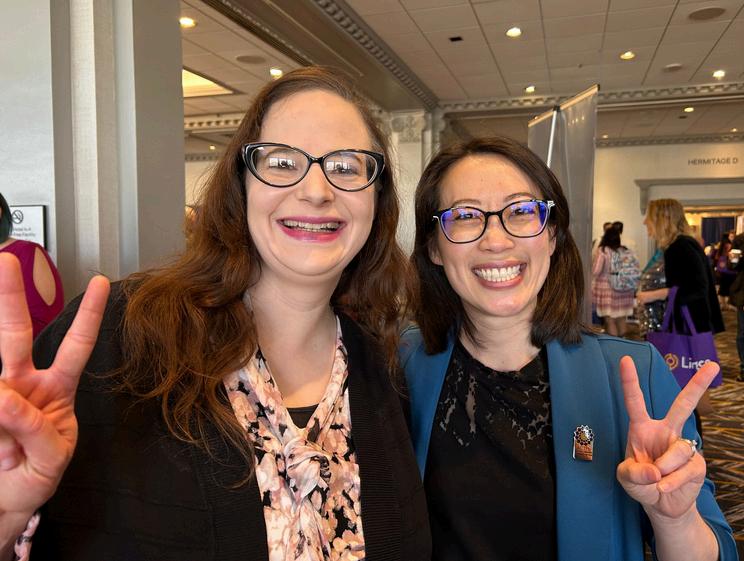
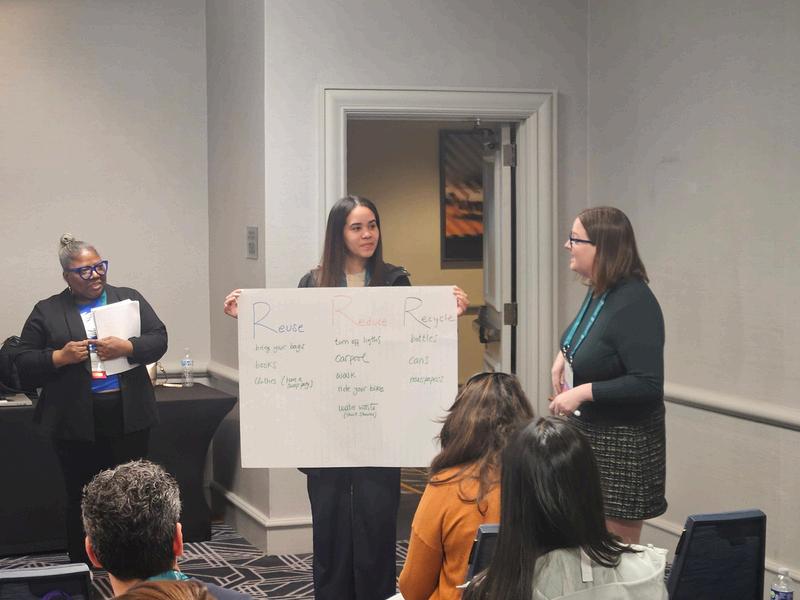
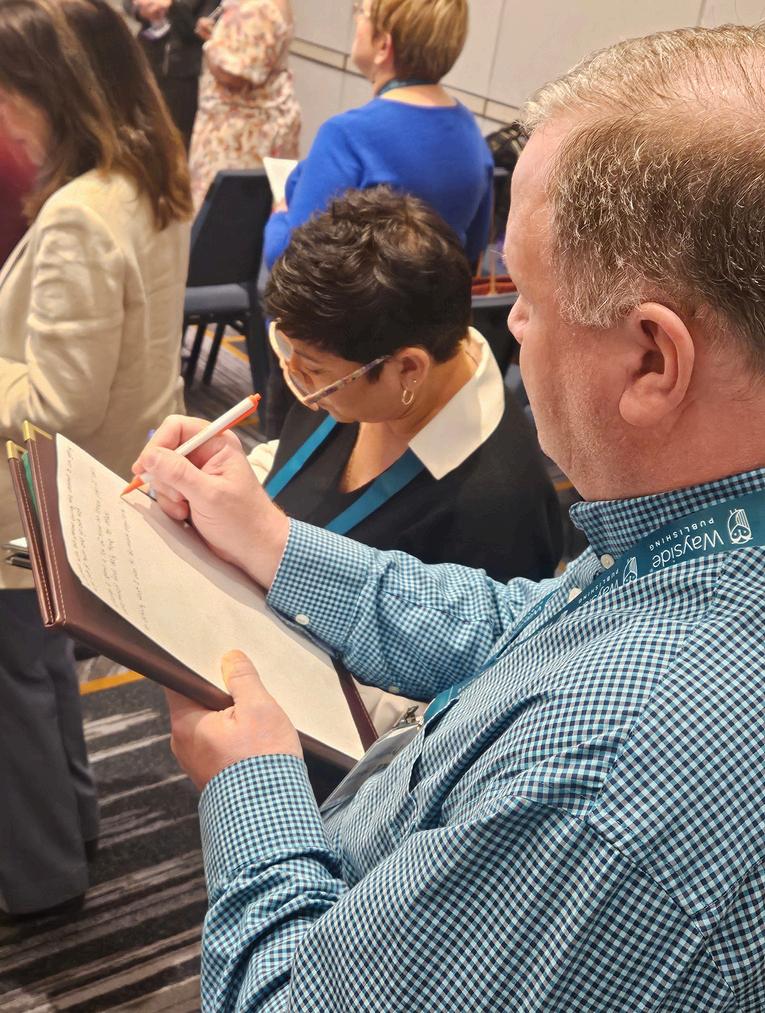
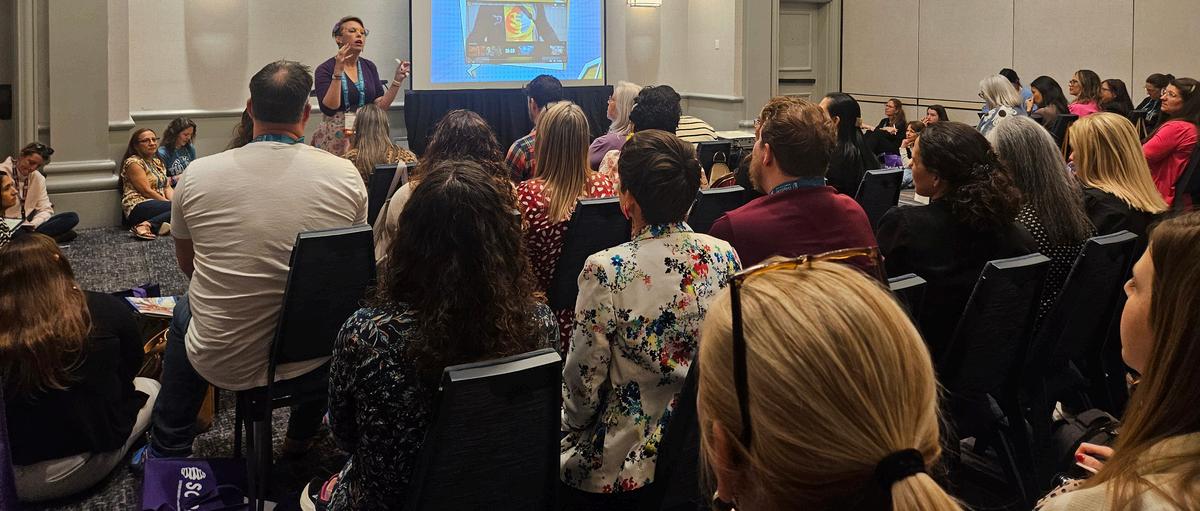
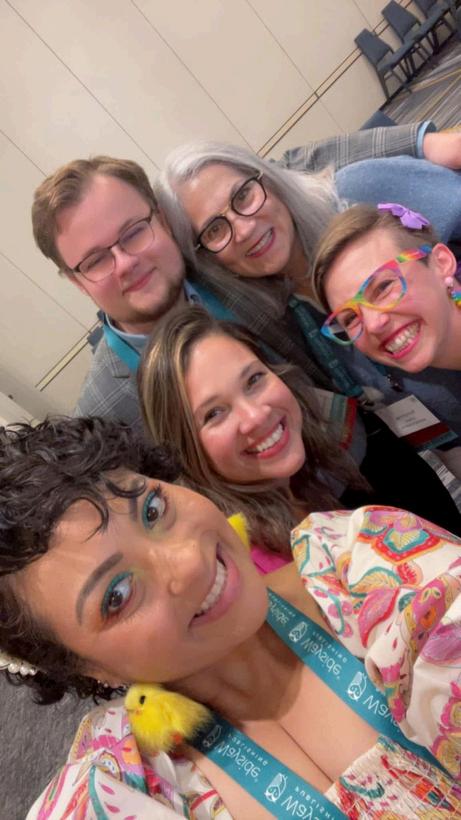
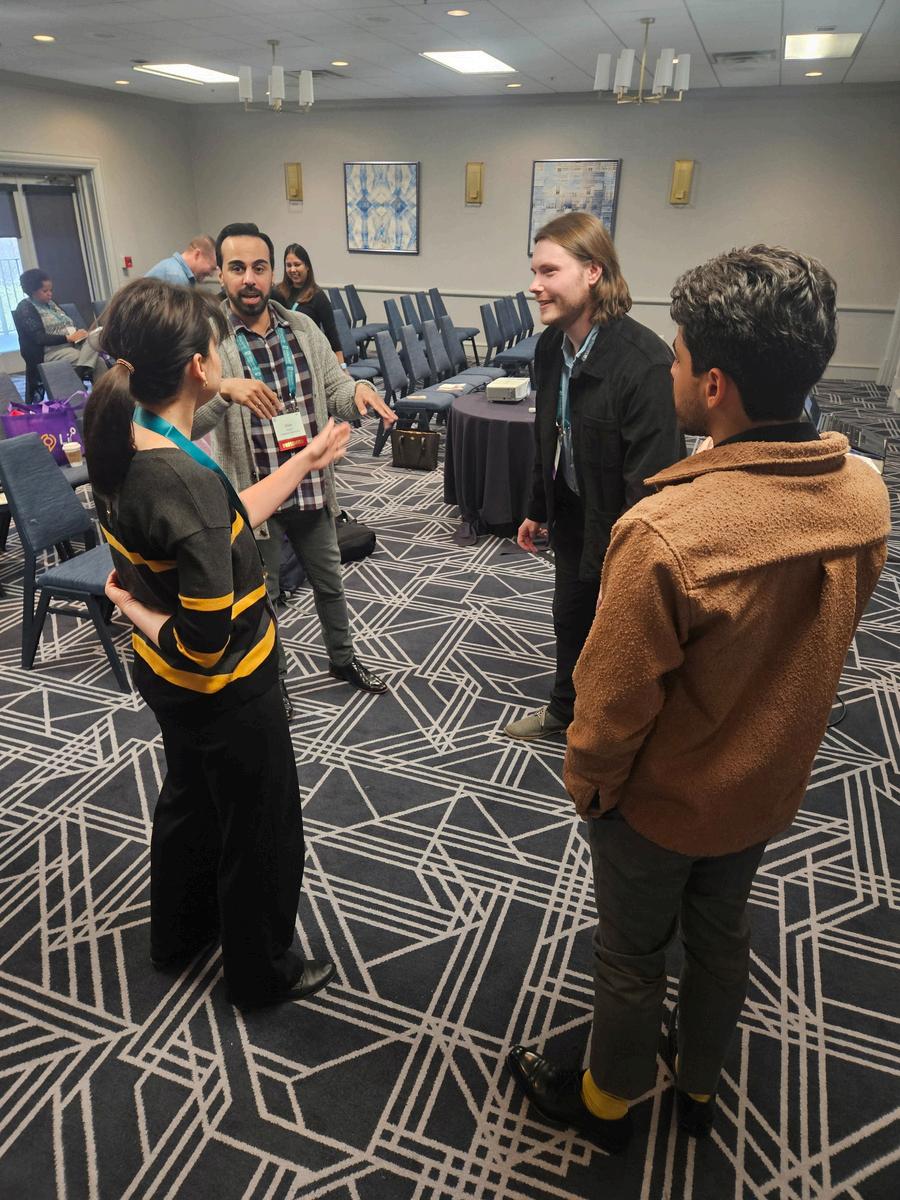
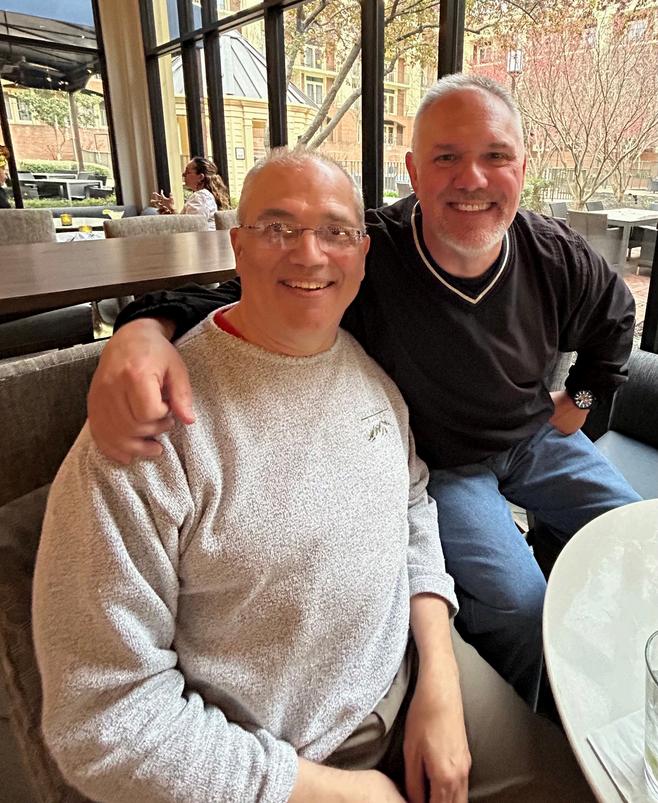
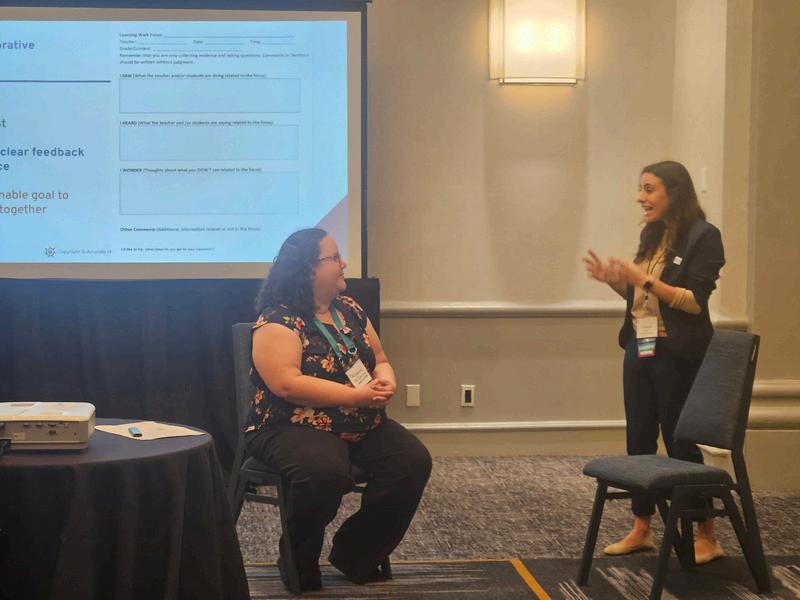
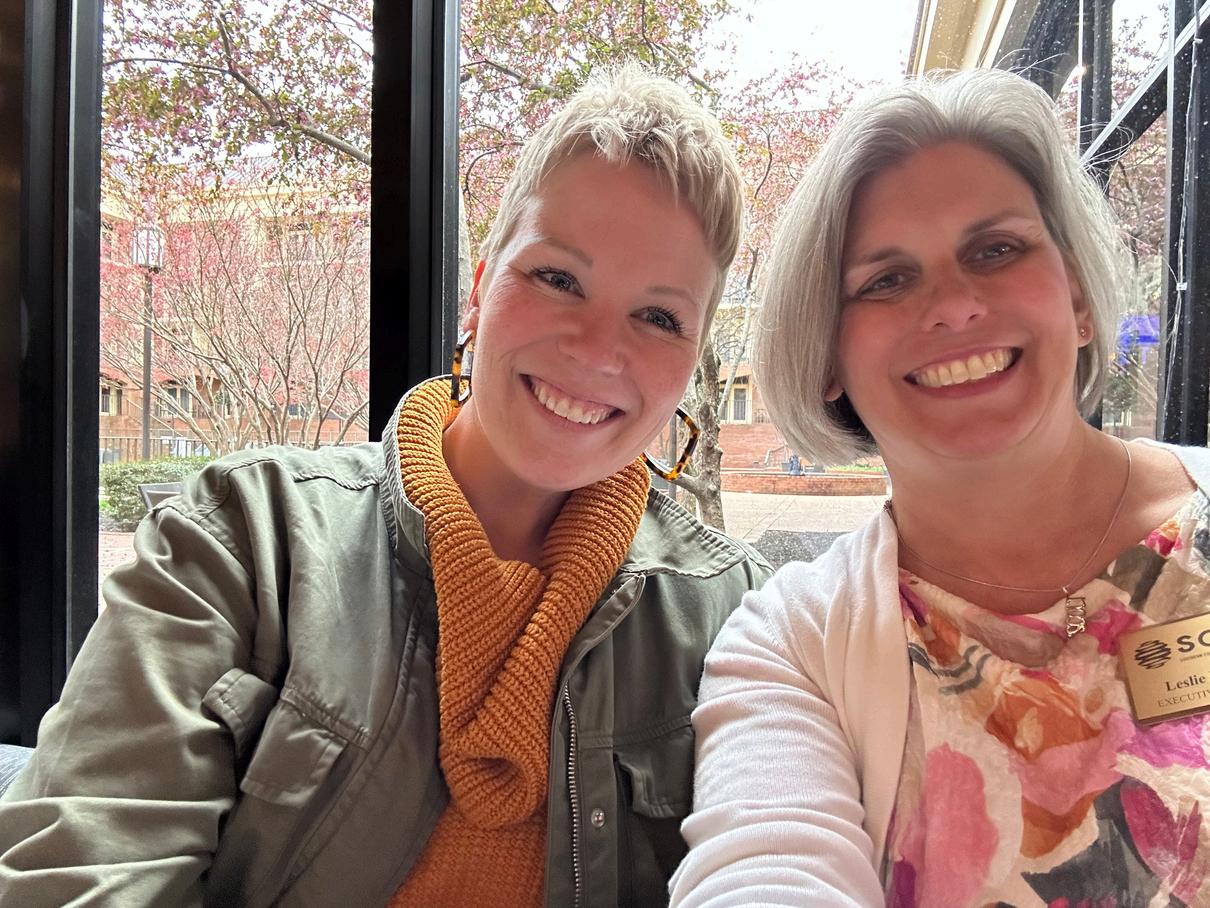
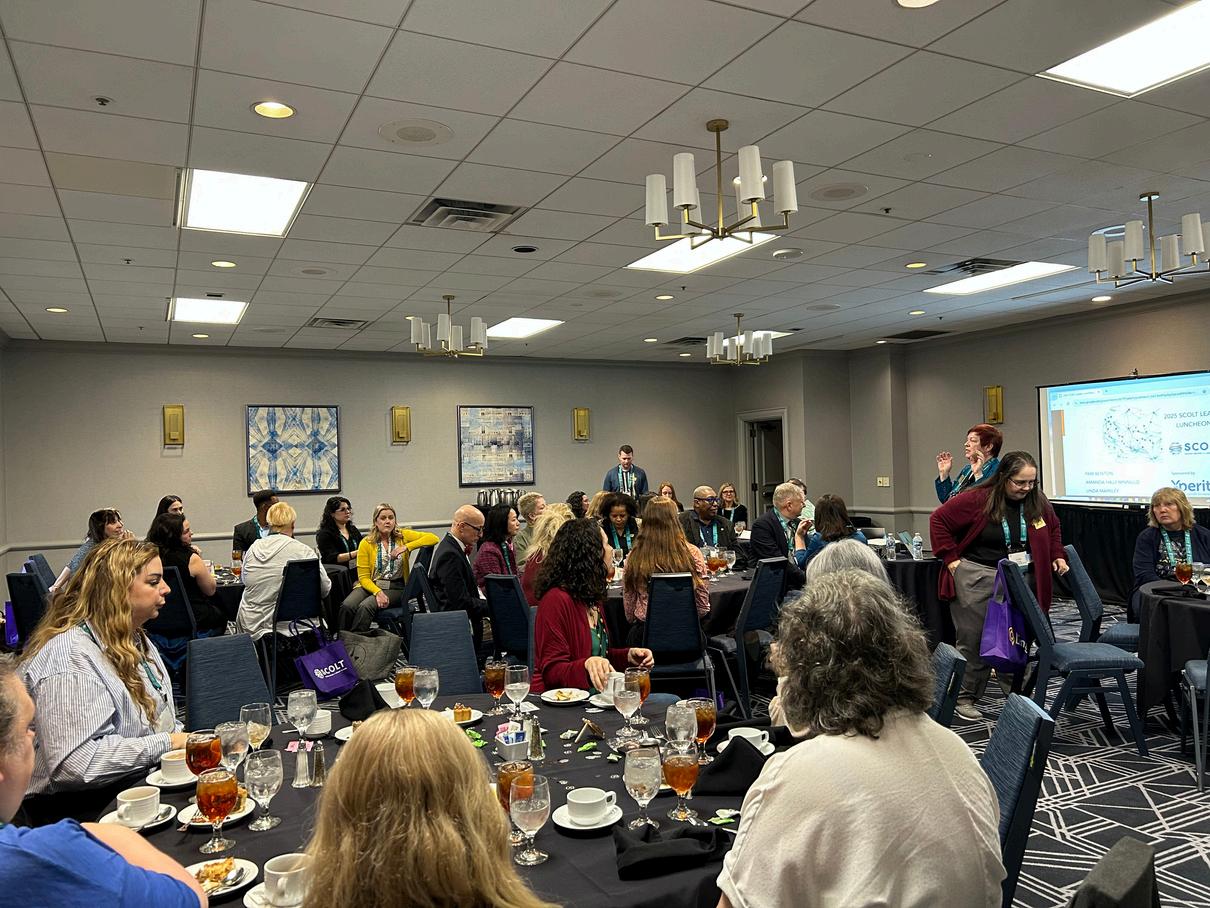
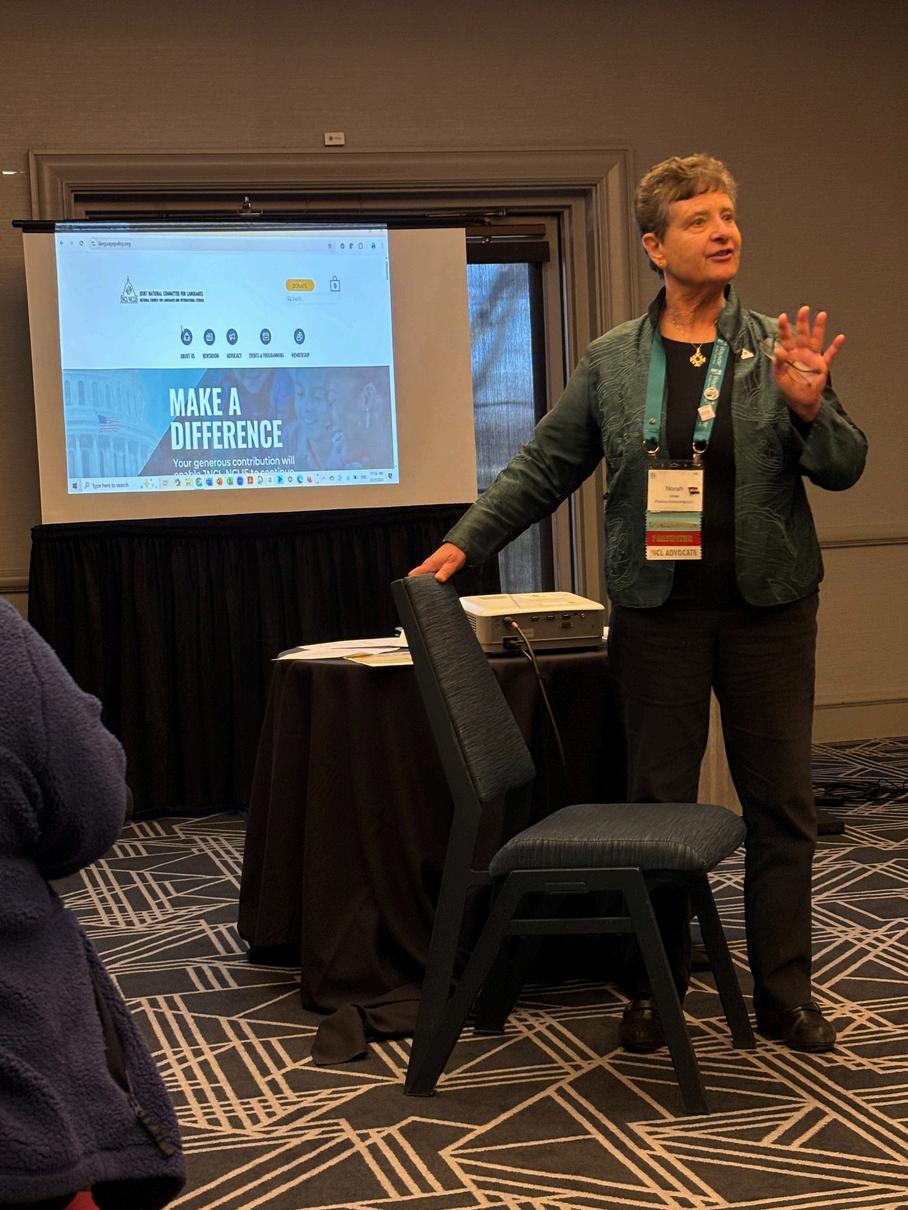
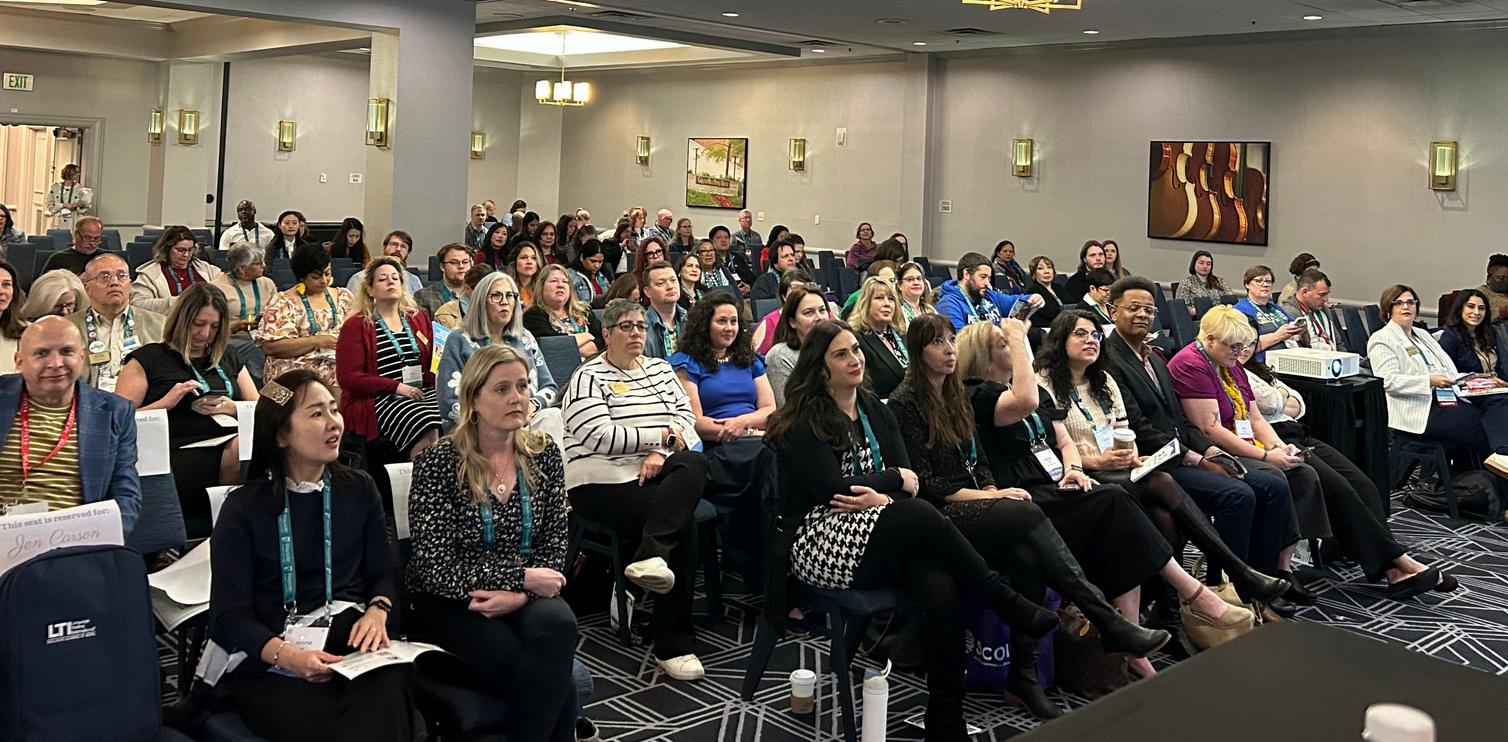
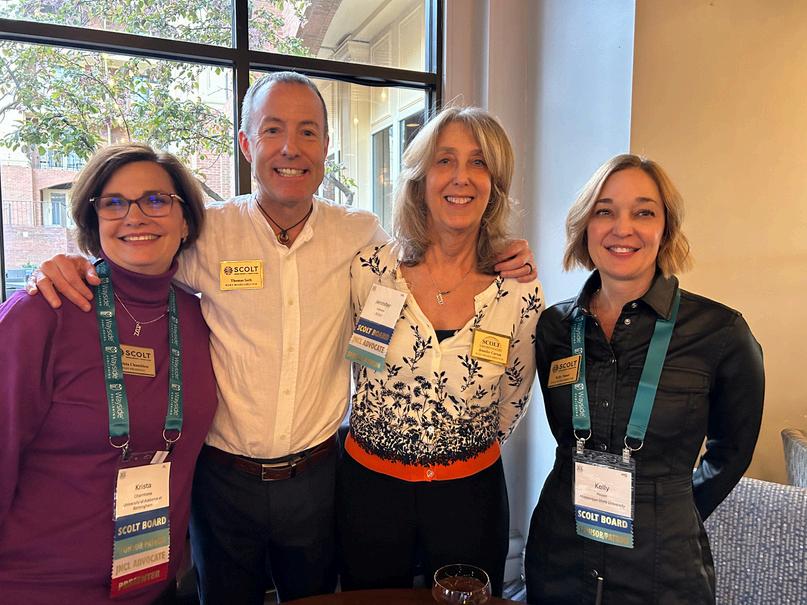
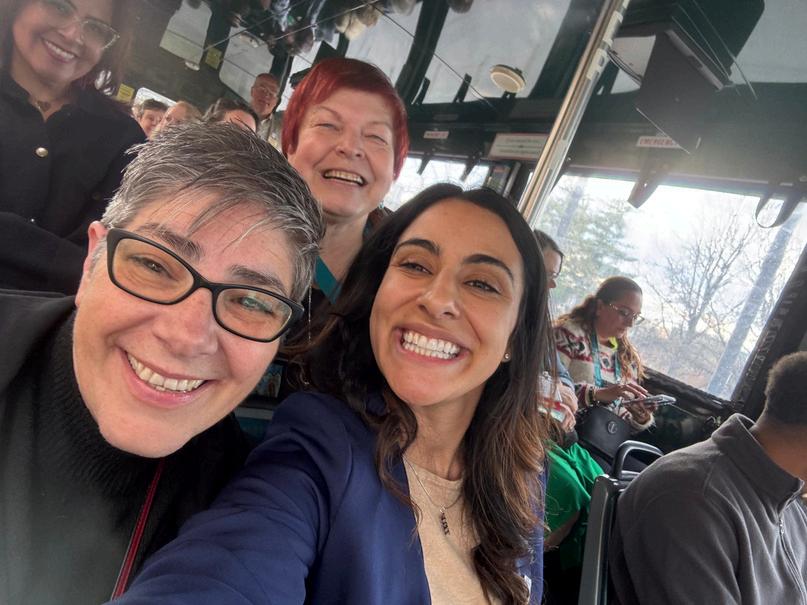
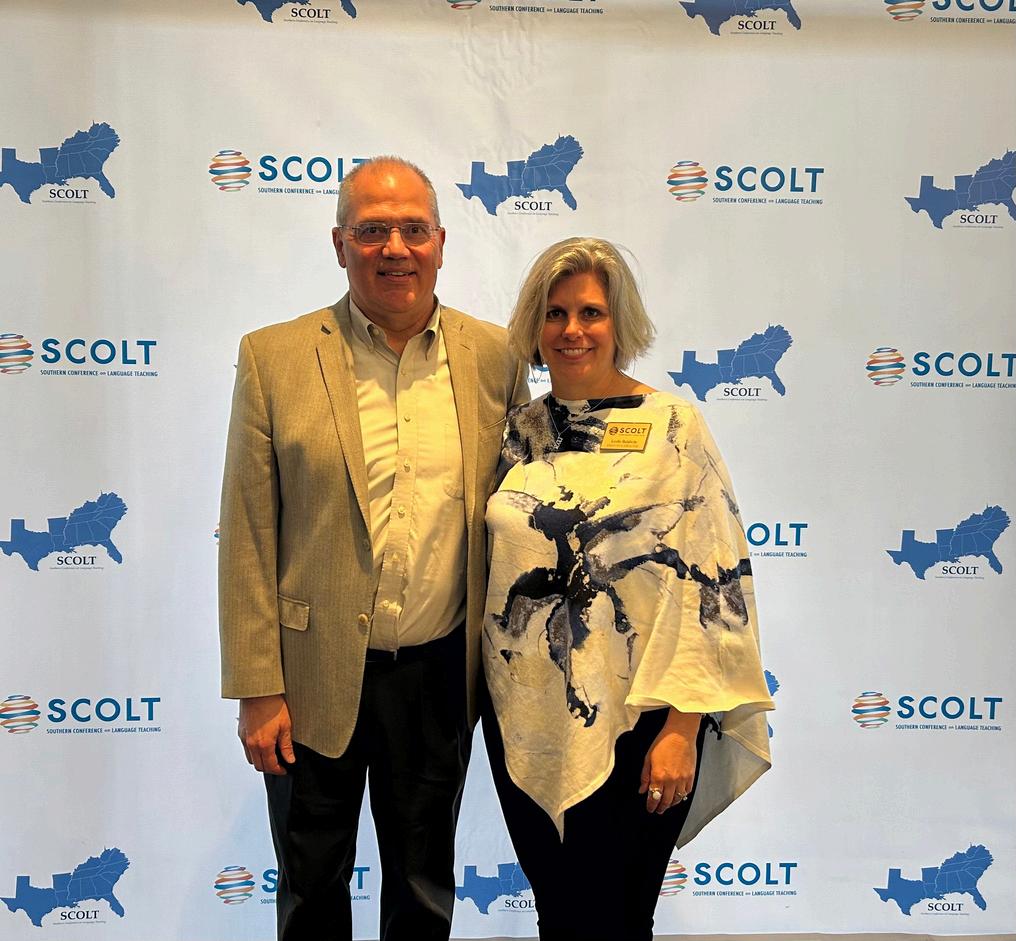
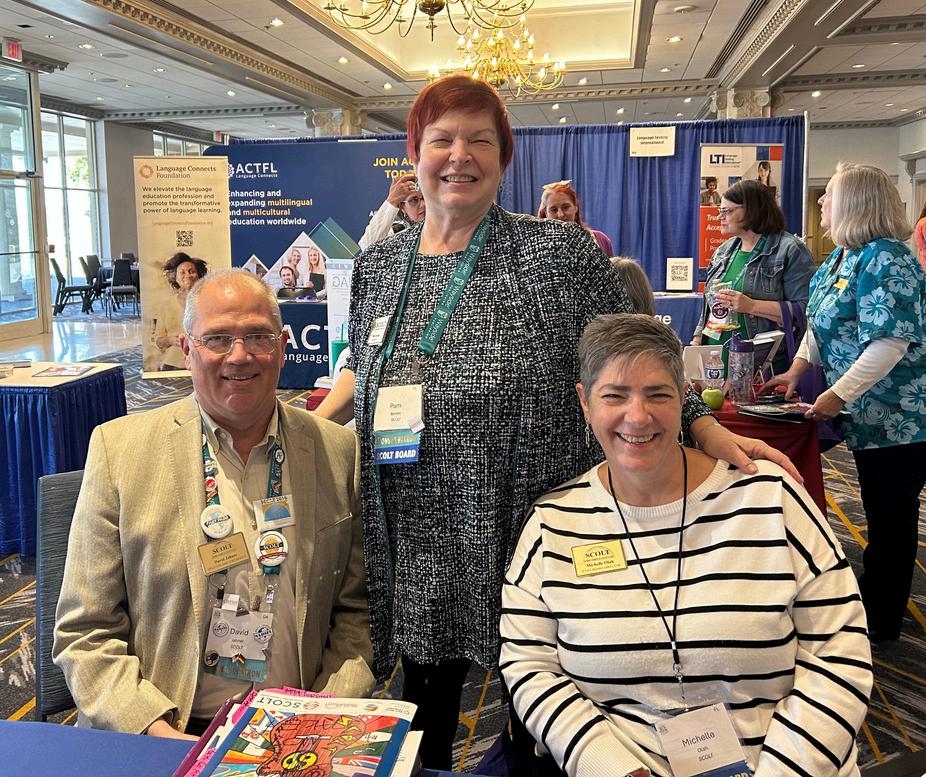
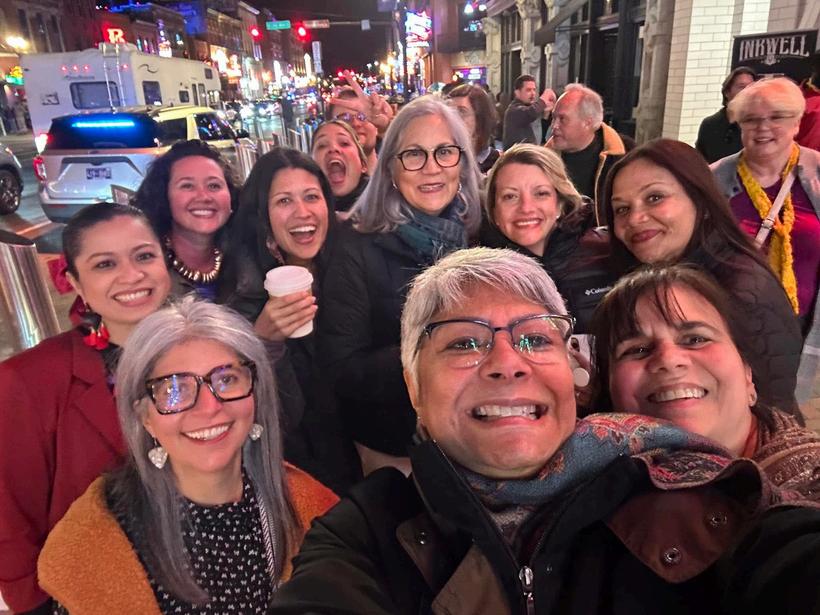
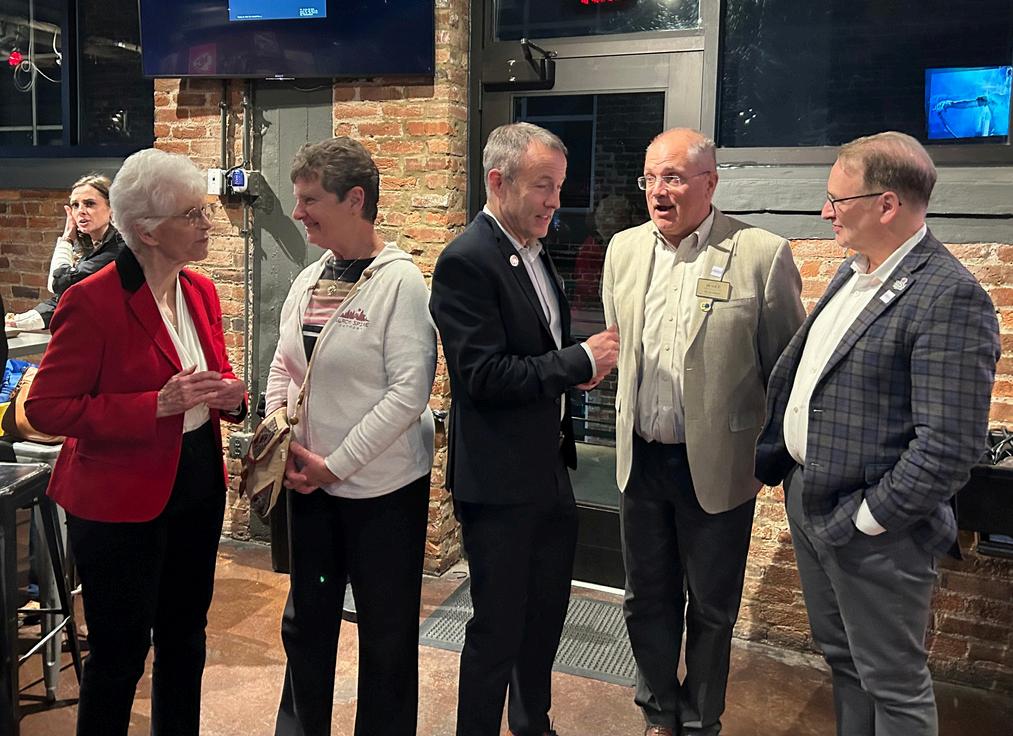
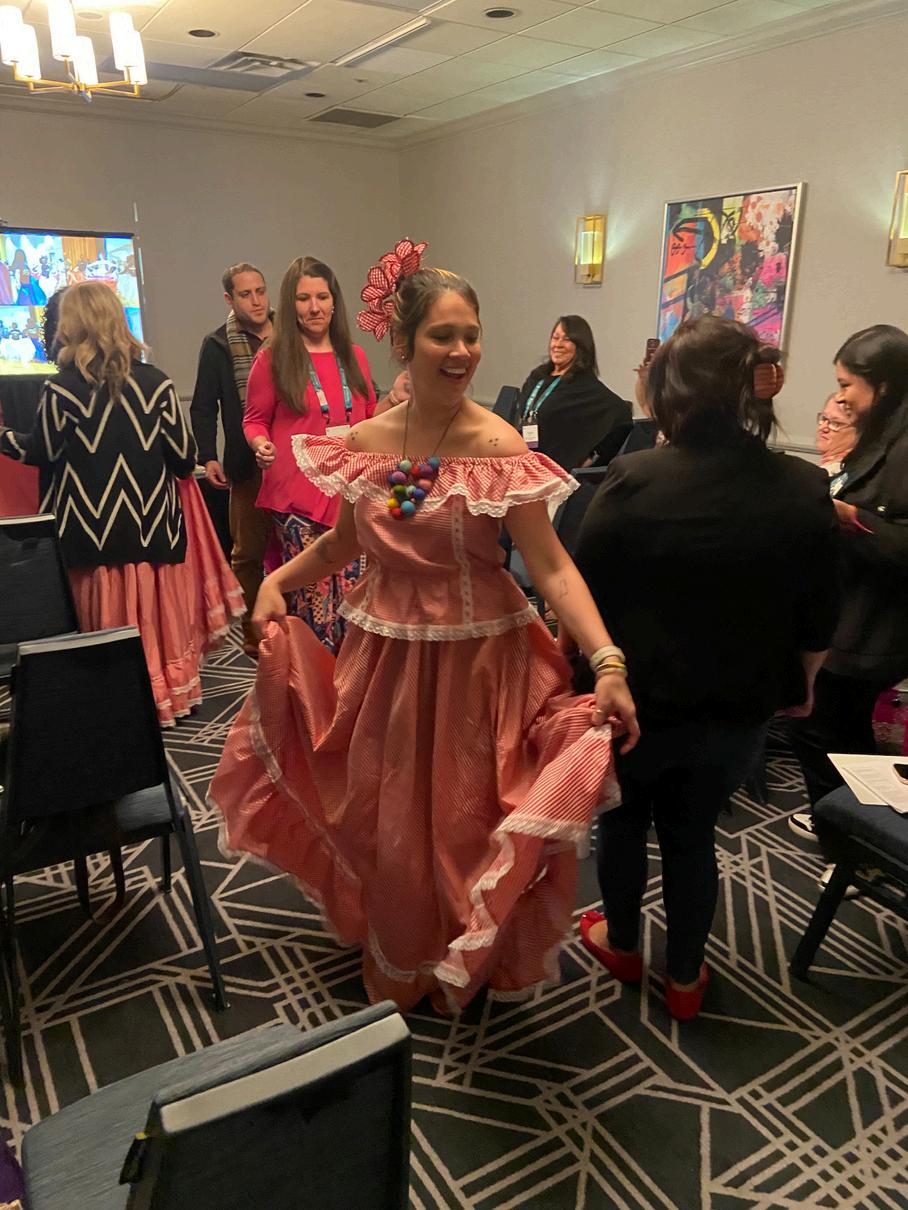

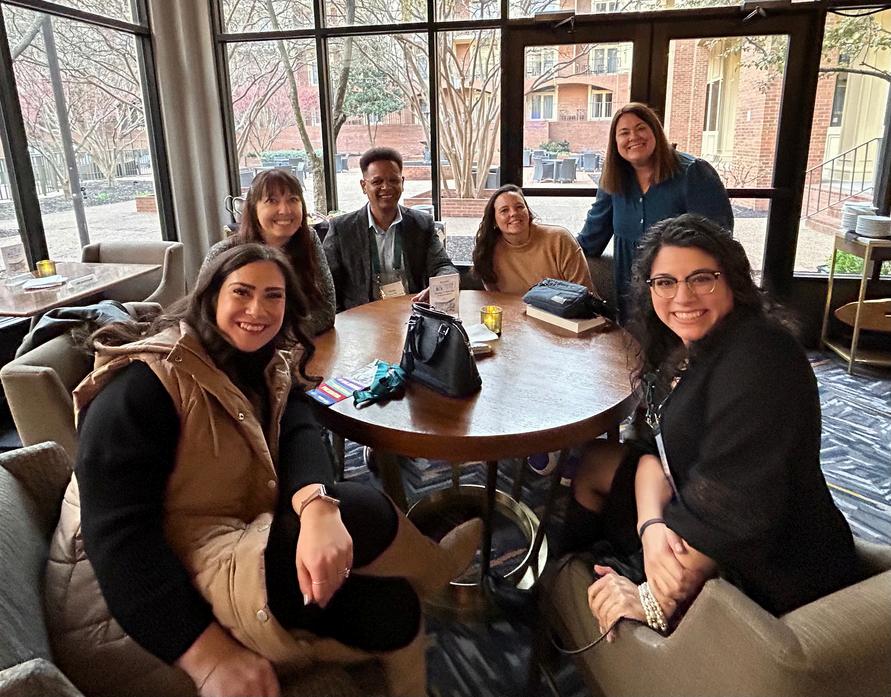
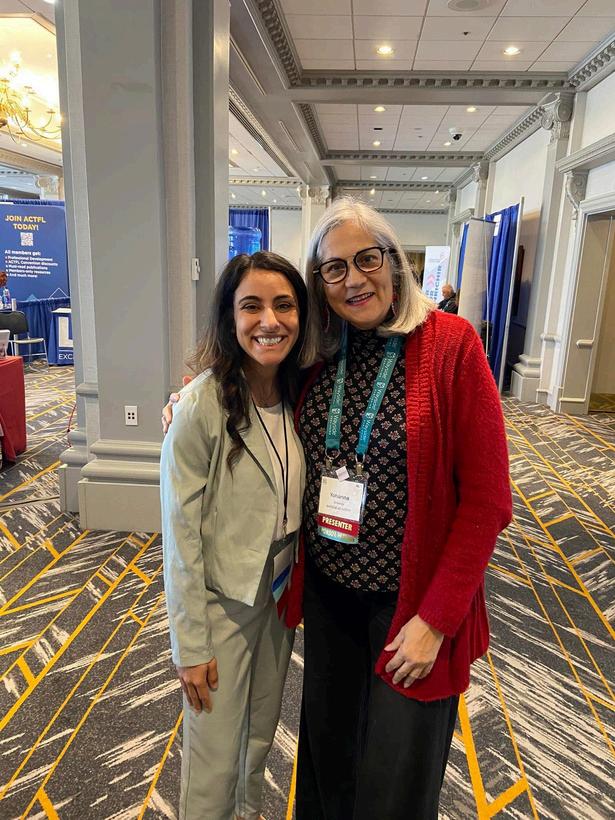
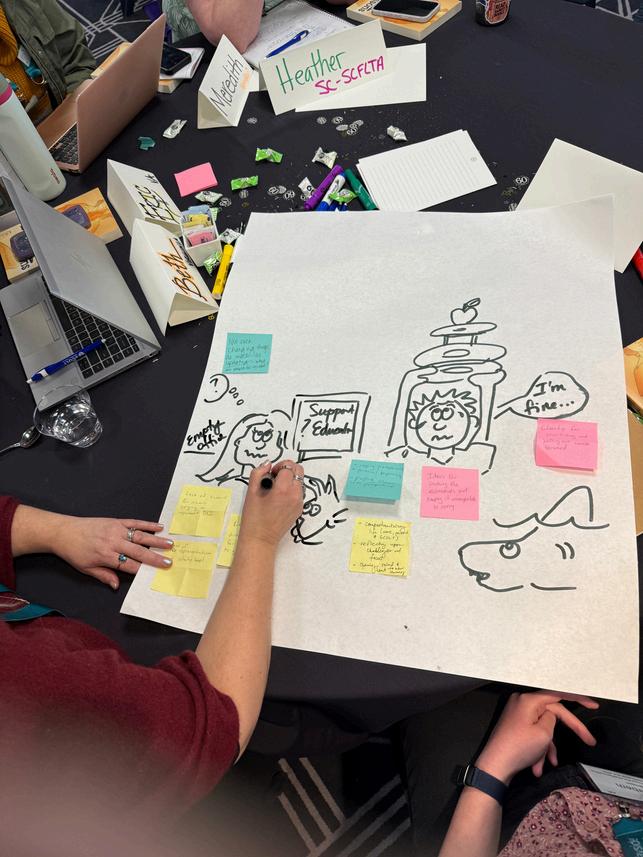
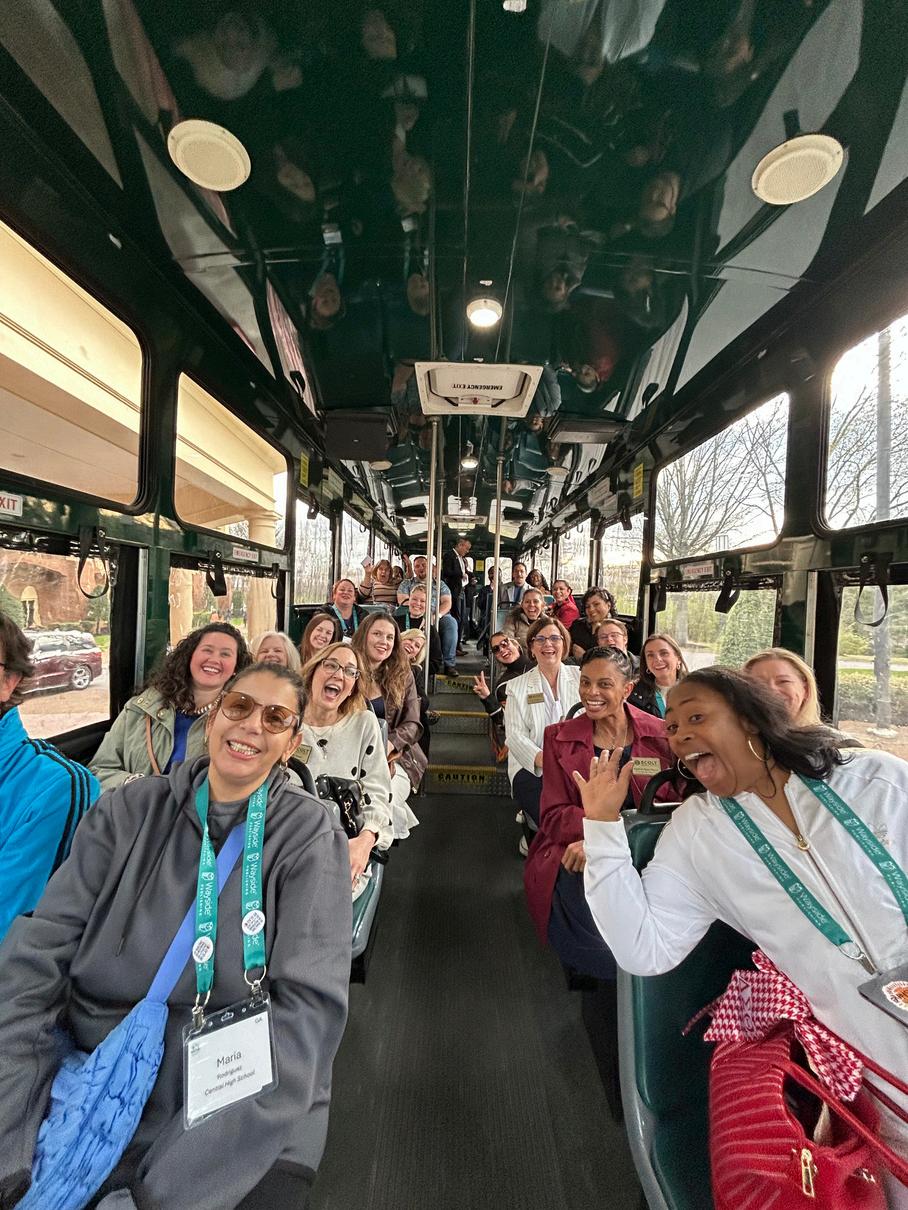
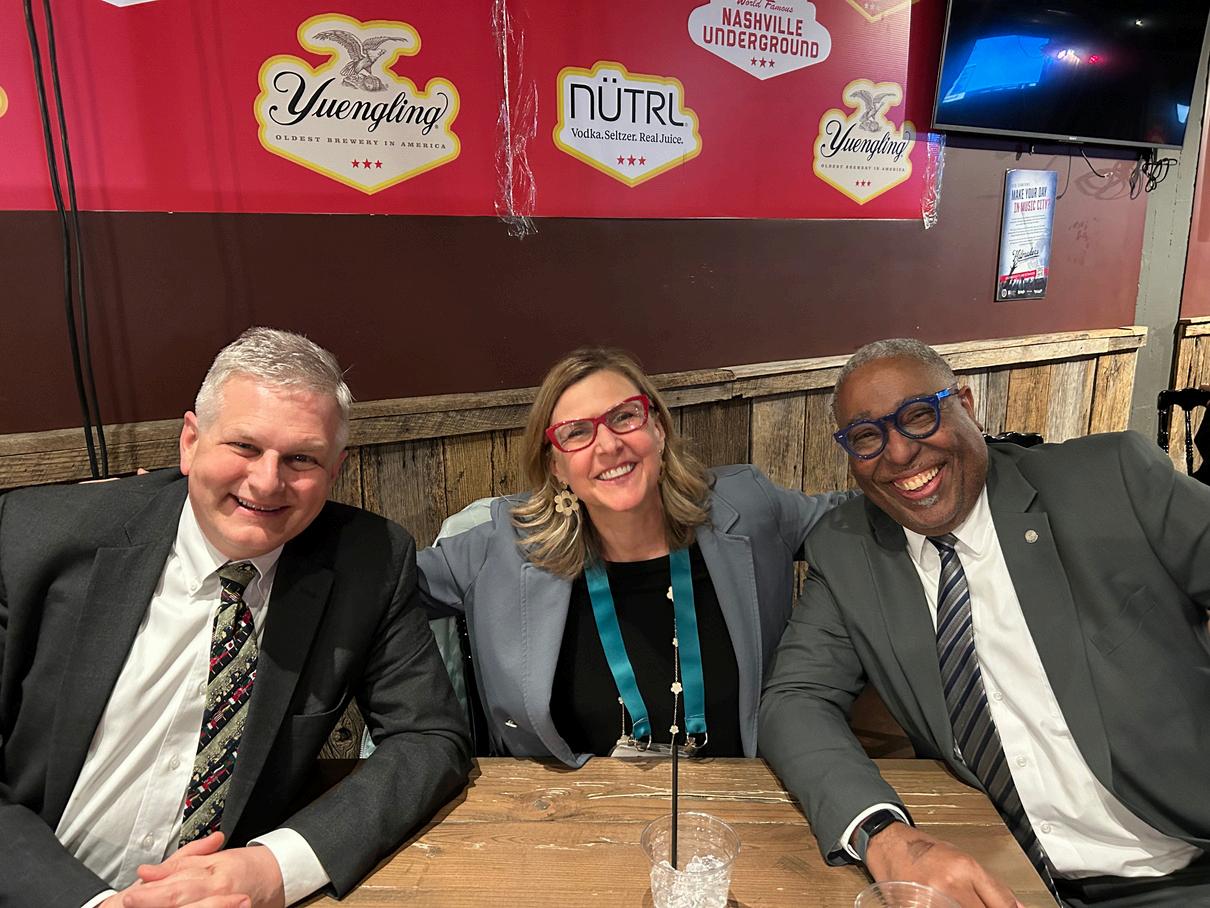
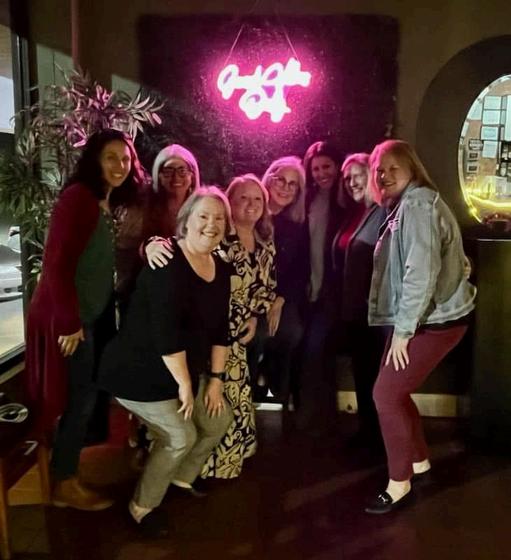
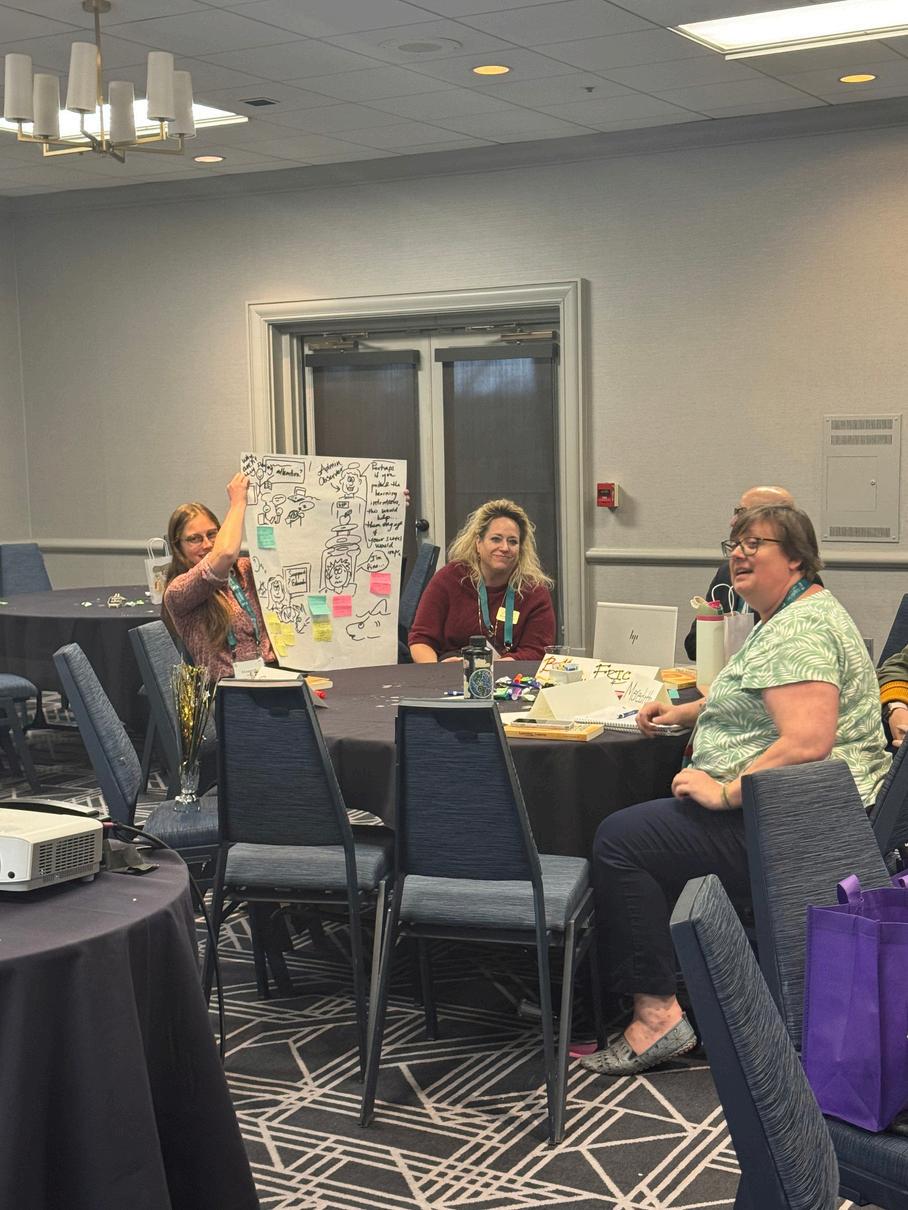
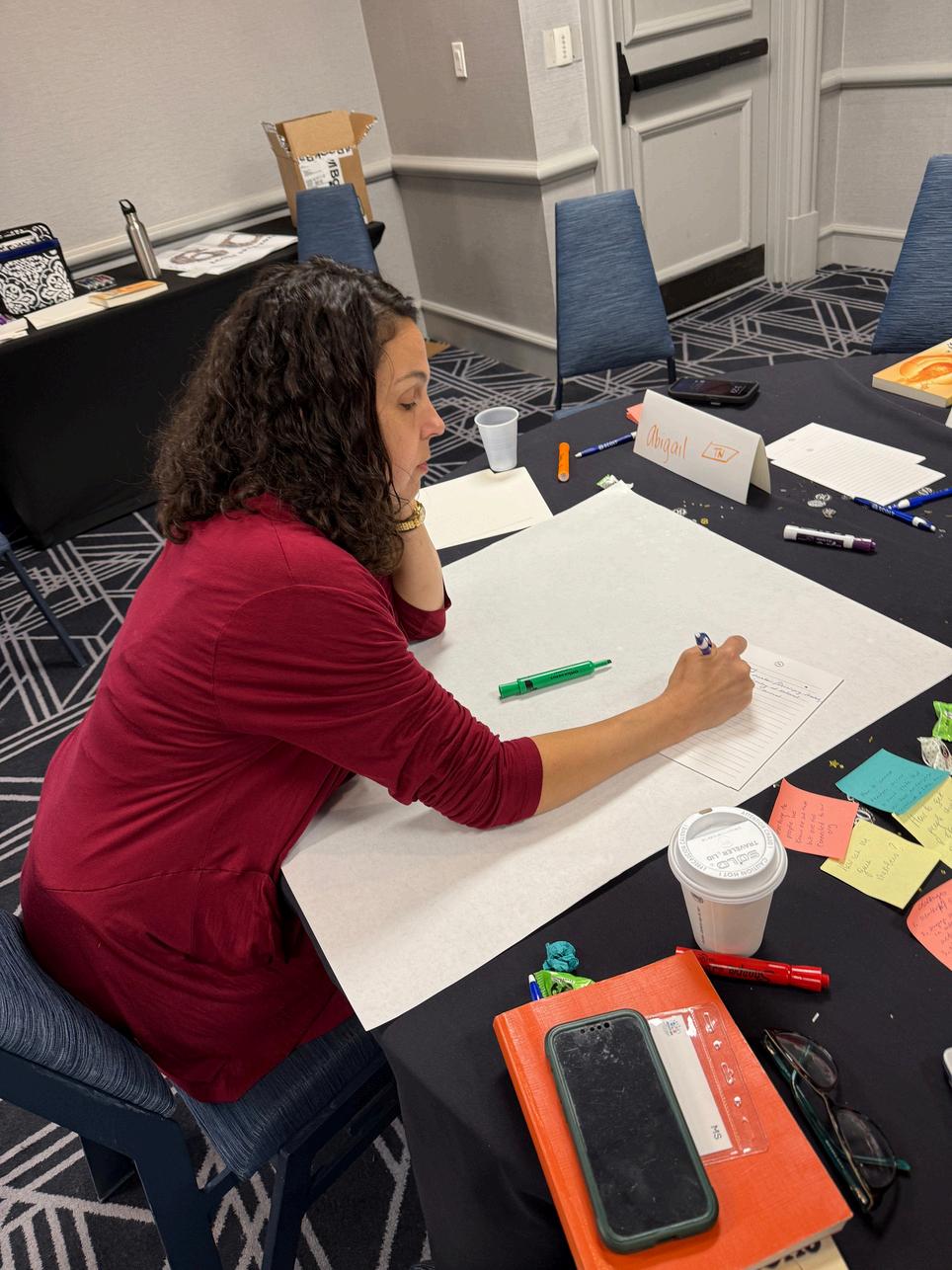
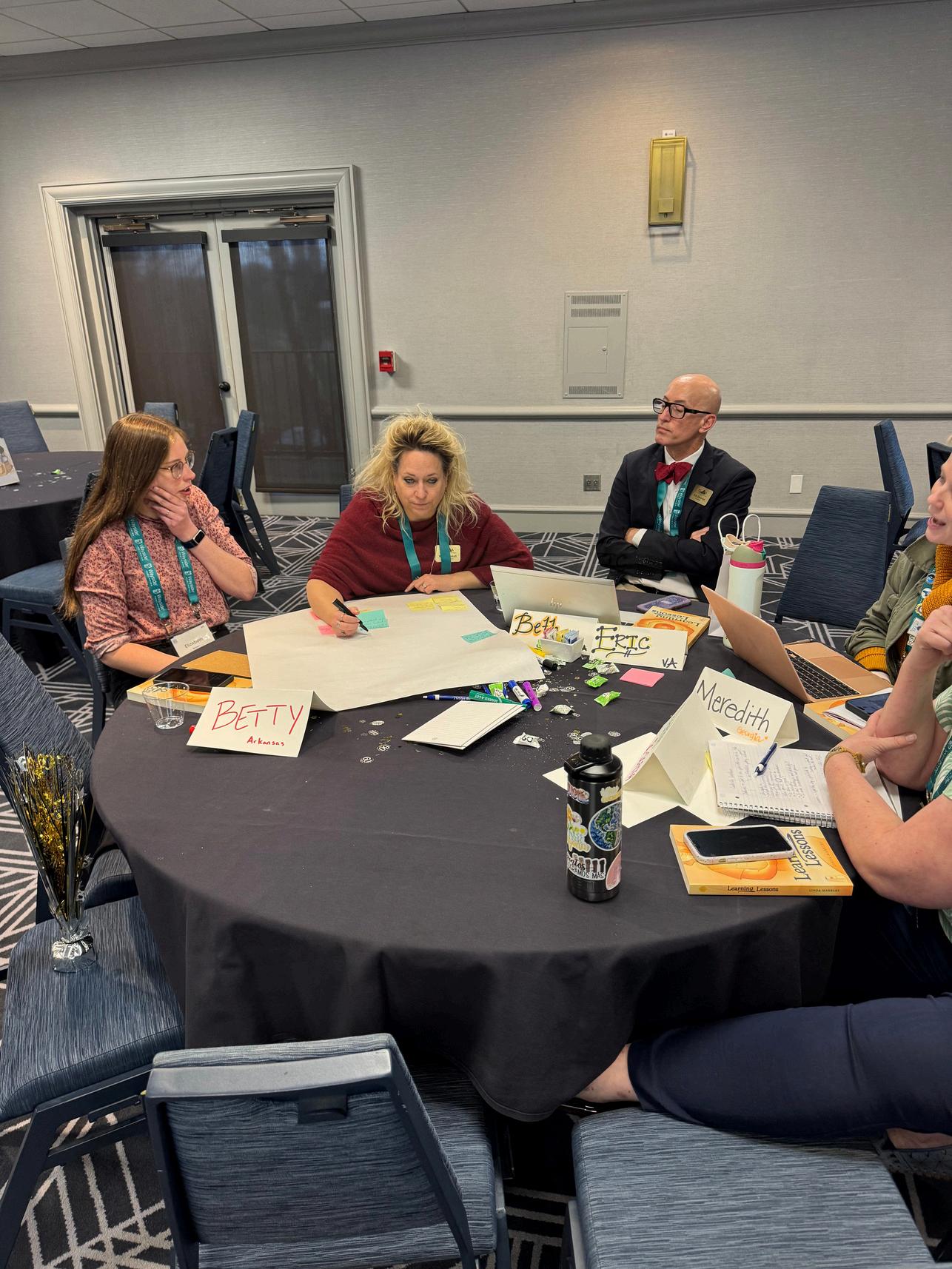
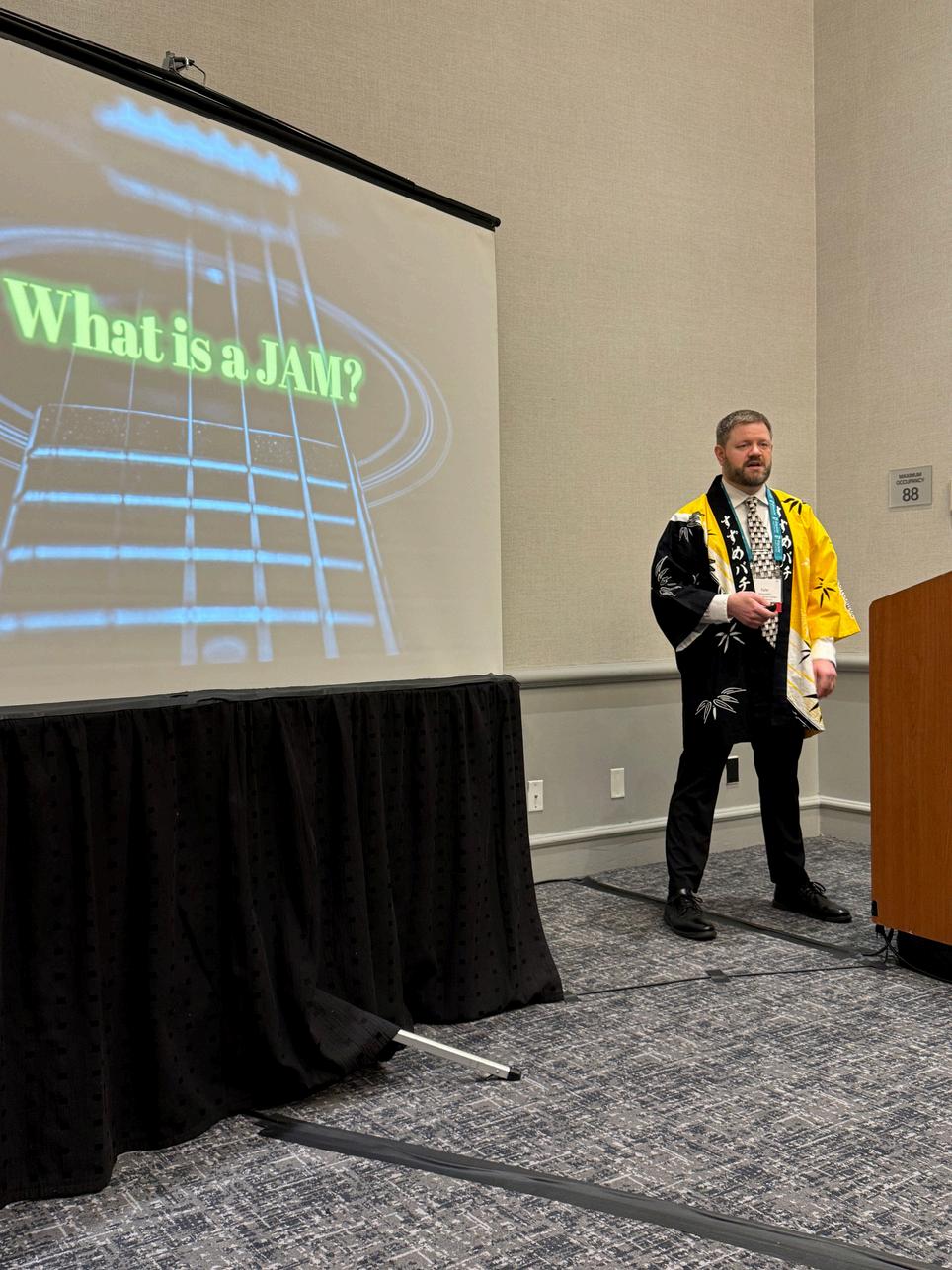
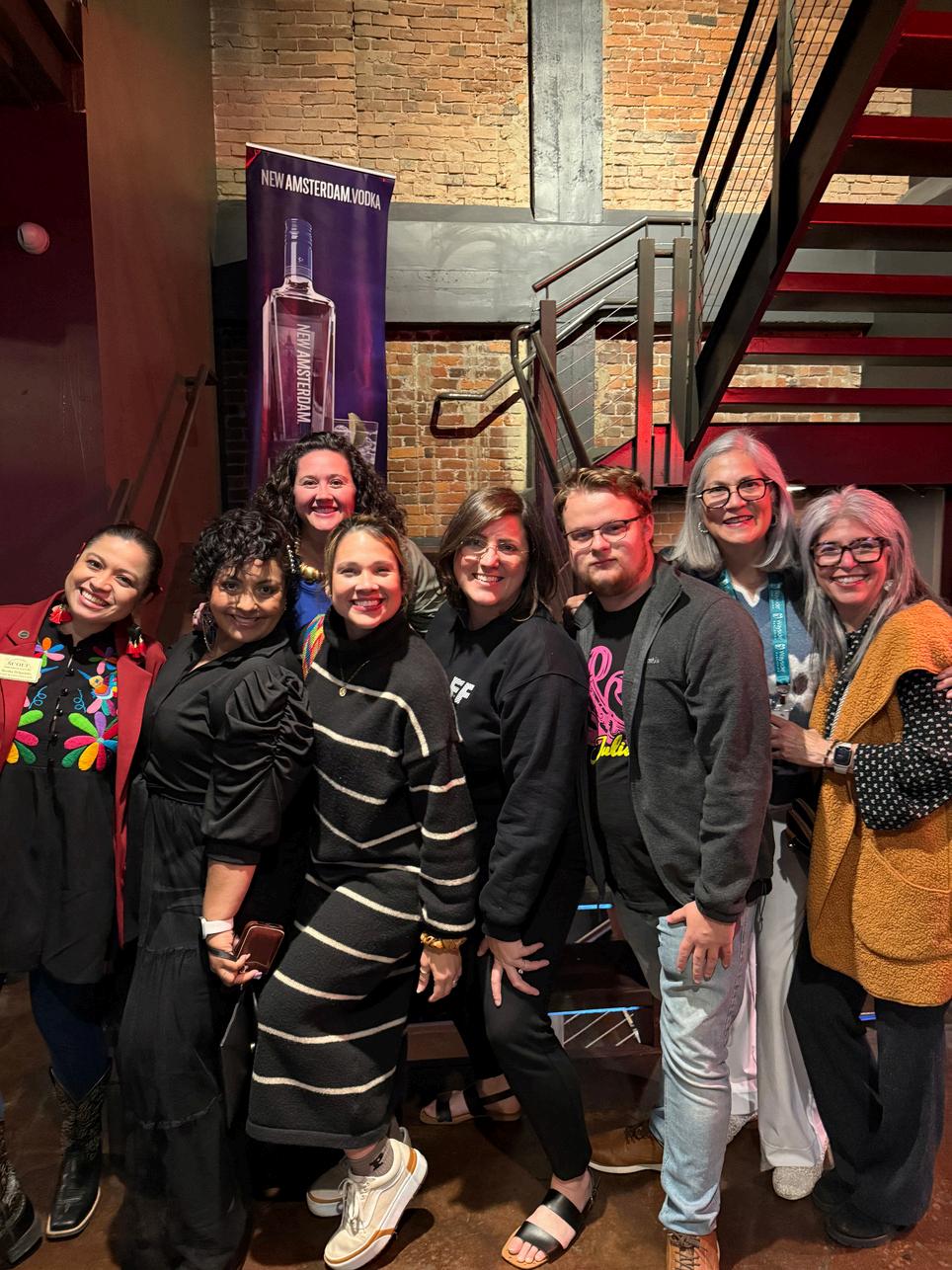
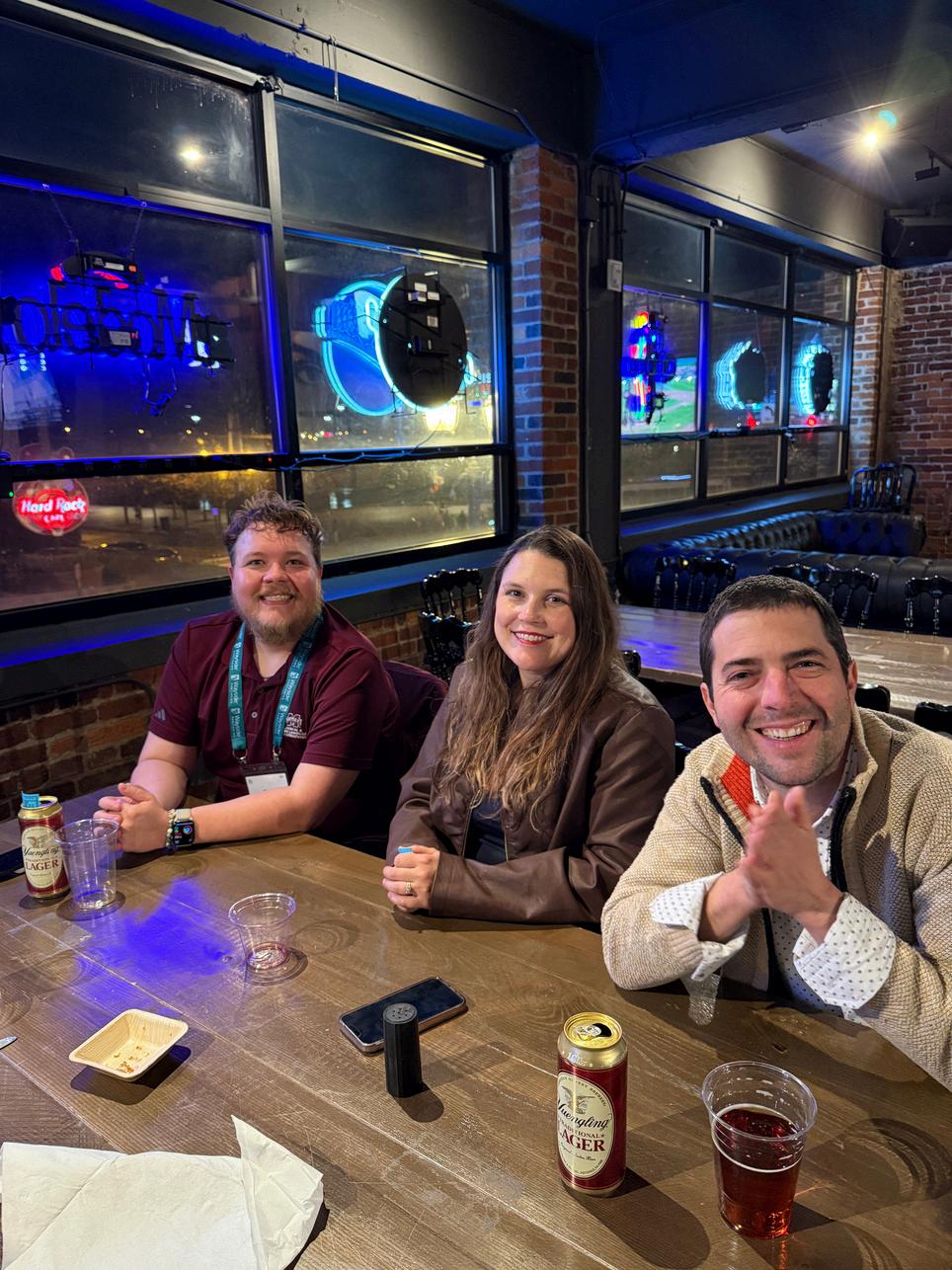
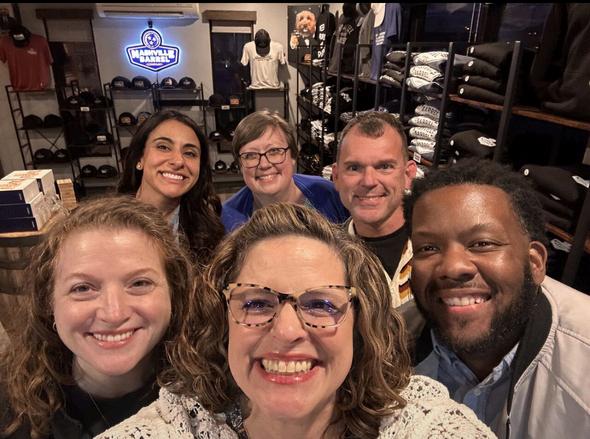
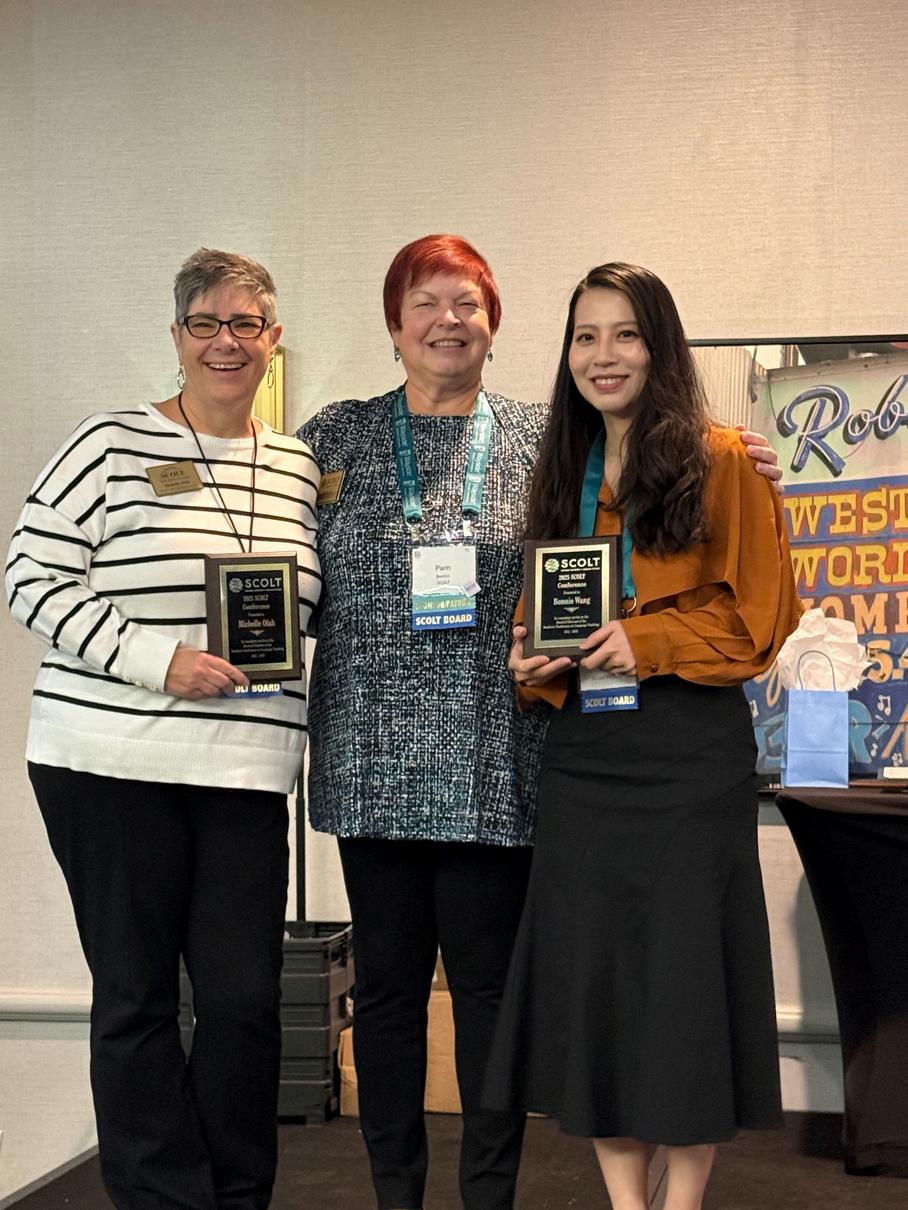
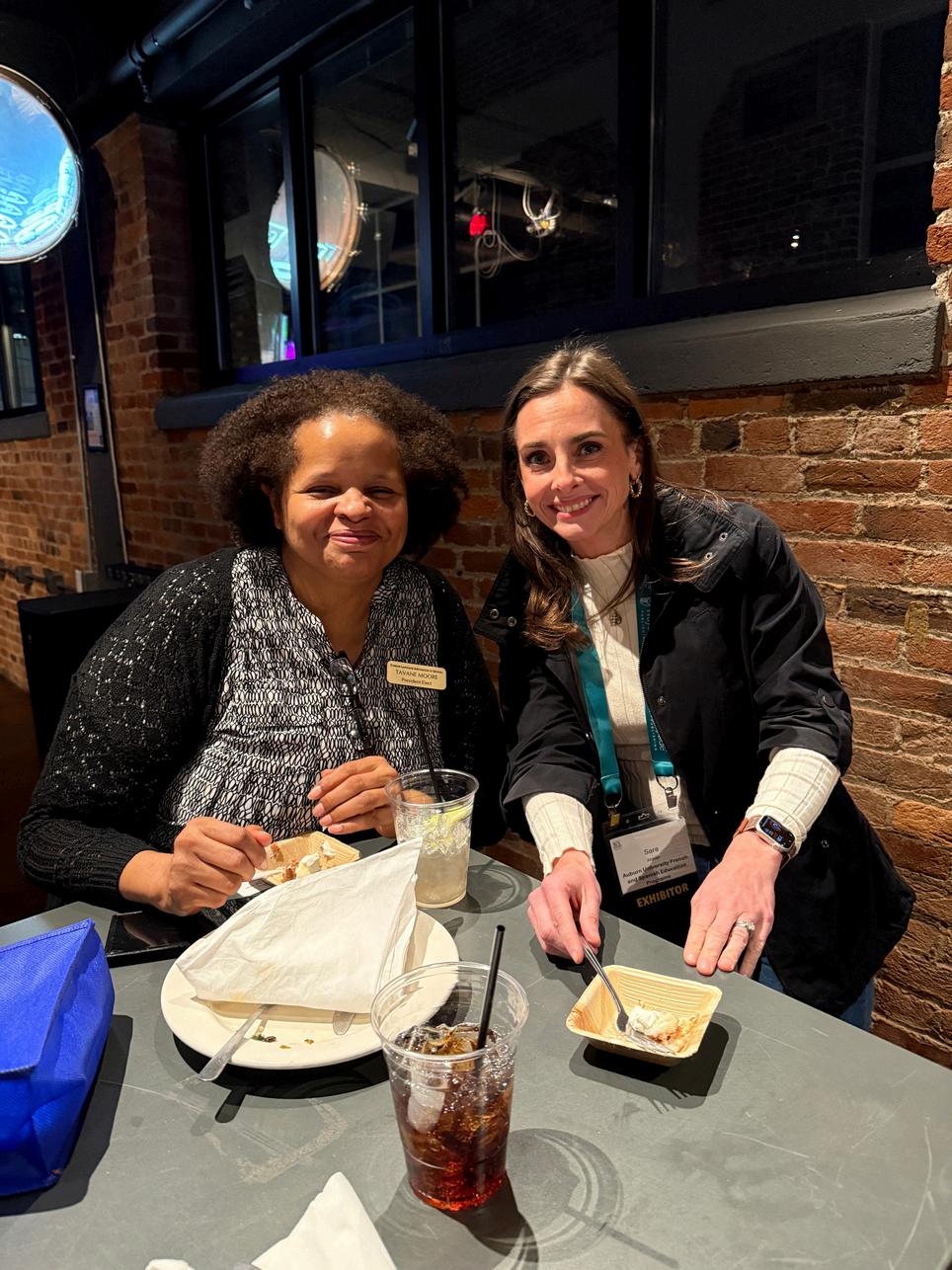
Alabama World Languages Association
AWLA website
Arkansas Foreign Language Teacher Association
AFLTA website
Florida Foreign Language Association
Conference Oct. 24-26, 2025
Foreign Language Association of Georgia
FLAG website
Foreign Language Association of North Carolina
Fall 2025 Conference: Oct. 3-5, 2025
Kentucky World Language Association
Fall Conference: Sept. 13, 2025
Louisiana Foreign Language Teachers’ Association
LFLTA website
Mississippi Foreign Language Association
Conference: Nov. 7-8, 2025
South Carolina Fellowship of Language Teachers and Advocates
SCFLTA website
Tennessee World Language Teaching Association
Conference: Nov. 7, 2025
Texas Foreign Language Association
Conference: Oct. 18-19, 2025
West Virginia Foreign Language Teachers’ Association
WVFLTA Website
Foreign Language Association of Virginia
Conference: Oct. 9-11, 2025